Episodes
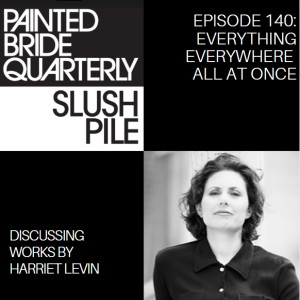
Thursday Jun 12, 2025
Episode 140: Everything Everywhere All at Once
Thursday Jun 12, 2025
Thursday Jun 12, 2025
Like the movie of the same name, the poems we discuss here, Slushies, take on the cares of the world in an unrelenting torrent. In this episode, we discuss three poems by Harriet Levin which reference the Haitian writer and artist Frankétienne, Barcelona’s as-yet unfinished Sagrada Familia cathedral, and the constellation of Orion, (for starters). We think about how poems featuring babies can avoid the sentimental (as we ultimately decide these do). We end considering the picture book chaos found in Maurice Sendak’s Where the Wild Things Are as a counterpoint to real-world displacement.
At the table: Kathleen Volk Miller, Jason Schneiderman, Samantha Neugebauer,
Lisa Zerkle, Jodi Gahn, Lillie Volpe (sound engineer)
With thanks to one of our sponsors, Wilbur Records, who kindly introduced us to the artist is A.M.Mills whose song “Spaghetti with Lorraine” opens our show.

Harriet Levin is the author of three poetry books, The Christmas Show (Beacon Press, 1997), Girl in Cap and Gown (Mammoth Books, 2010), and My Oceanography (CavanKerry 2018). Her honors include the Alice Fay di Castagnola Award from the Poetry Society of America, The Barnard New Women Poets Prize, Nimrod's Pablo Neruda/Hardiman Award, The Ellen LaForge Memorial Poetry Prize, and a PEW Fellowship in the Arts discipline award. Her debut novel, How Fast Can you Run, a novel based on the life of Lost Boy of Sudan Michael Majok Kuch, was excerpted in The Kenyon Review and chosen as a 2017 Charter for Compassion Global Read. A 2022-23 Stein Family Foundation Fellow, she holds an MFA from the University of Iowa and teaches writing at Drexel University.
Website: harrietlevinmillan.org
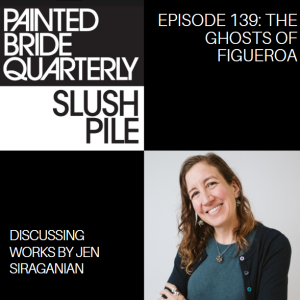
Wednesday May 28, 2025
Episode 139: The Ghosts of Figueroa
Wednesday May 28, 2025
Wednesday May 28, 2025
Slushies, we invoke the retelling of a ghostly experience shared by Kathy and Marion at the Hotel Figueroa in California earlier this year partway into this episode. Two poems by Jen Siraganian are at the heart of our discussion, and it’s the first of these that puts ghosts into our heads. This poem also causes us to consider at some length the physical form chosen by or for a poem, and how this can utterly enhance the experience of the poem when it’s just right. It’s also an opportunity for Jason to raise the spectre of the virgule (or slash) once again, and we even pause briefly to recall when WYSIWYG was a useful acronym. We end the episode with an ekphrastic that prompts an on-the-spot tie breaker (thanks to our sound engineer Lillie for saving the day!).
https://whitney.org/collection/works/2171
https://www.nga.gov/collection/highlights/gorky-the-artist-and-his-mother.html

At the table: Kathleen Volk Miller, Marion Wrenn, Lisa Zerkle, Jason Schneiderman, Dagne Forrest, Jodi Gahn, Lillie Volpe (sound engineer)
Jen Siraganian is an Armenian-American writer, educator, and former Poet Laureate of Los Gatos, California. Her poetry has appeared or is forthcoming in AGNI, Barrow Street, Best New Poets, Cortland Review, Poetry Daily, Prairie Schooner, The Rumpus, Smartish Pace, and other journals. Her work has been nominated for a Pushcart Prize and won the 2024 New Ohio Review Poetry Prize. A former managing director of Litquake: San Francisco’s Literary Festival, she is a current Lucas Artist Fellow. jensiraganian.com
Social media handles:
Facebook @jen.siraganian, Instagram @jsiraganian, Bluesky @jsiraganian.bsky.social, Website
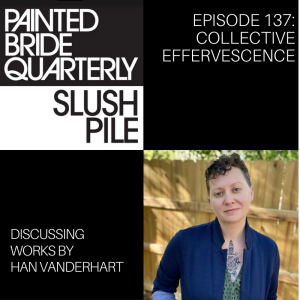
Thursday Apr 17, 2025
Episode 137: Collective Effervescence
Thursday Apr 17, 2025
Thursday Apr 17, 2025
Episode 137: Collective Effervescence
Don’t be jelly, but we’re having a blast with three poems from the poet Han VanderHart in this episode! You can join in on the fizzing of our collective effervescence by just tuning in. We find the conversation naturally turning towards John Berger’s Ways of Seeing, taking in the pipe as a fairly recent newcomer as a punctuation mark in poetry, and the concept of absolute zero, alongside much, much more. Poetic themes of truth, love, and the power of “No” sit at the center of our conversation. Oh, and Marion deftly keeps Kathy in the conversation when technology unexpectedly steals her voice! (Be sure to check out the painting Truth Coming Out of Her Well, the inspiration for the first poem, an ekphrastic, that we discuss. It’s a painting that has inspired some cool tattoo art!)
At the table: Marion Wrenn, Kathleen Volk Miller, Jason Schneiderman, Divina Boko, Lisa Zerkle, Dagne Forrest, Lillie Volpe (sound engineer)

Han VanderHart grew up on a small-scale farm in Virginia, and now lives in North Carolina, under the pines with their long term partner, two children, four cats, two dogs, and a Diva koi Beta fish named Caroline (long I). Their favorite flower is all of them, with the exception of the gerber daisy, which looks fake. Han is the author of Larks (Ohio, 2025) and What Pecan Light (BCP, 2021), and hosts Of Poetry Podcast and co-edits River River Books with Amorak Huey.
Insta: @han.vanderhart
Bluesky: @hanvanderhart.bsky.social
Website: hanvanderhart.com
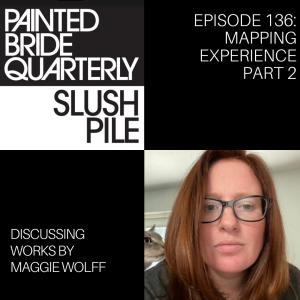
Tuesday Apr 01, 2025
Episode 136: Mapping Experience Part 2
Tuesday Apr 01, 2025
Tuesday Apr 01, 2025
Episode 136: Mapping Experience Part II
Here’s a first for PBQ, the second of a two-part series on a single poet! We’re calling this two-parter the The Maggie Wolff Experience. We delight in spending more time with Maggie’s exceptional series of abcedarians, “Surveys, Maps, and Mothers”, which share an unspooling narrative of intergenerational trauma. Kathy notes the similarity to experiencing an anthology series, with each of the four poems we’ve discussed offering a complete experience, while added depth and richness emerges from reading multiple poems (this makes Episode 135 or Part I optional but still recommended listening!). Jason calls attention to the skillfully created sonic waves that appear in sections of some of the poems, notably “S” in this episode. We touch on the “lore” of the people in our lives (thanks to Divina for the Gen Z lingo) and Sam makes the connection with Philip Larkin’s This Be the Verse (“They fuck you up, your mum and dad.”). All of that and even a quick moment referencing Billy Joel’s Movin' Out (Anthony’s Song) from 1977 – if you listen, you’ll know why!
At the table: Kathleen Volk Miller, Marion Wrenn, Samantha Neugebauer, Dagne Forrest, Lisa Zerkle, Jason Schneiderman, Divina Boko, Lillie Volpe (sound engineer)

Maggie Wolff is a poet, essayist, fiction writer, and Ph.D. student. She recently won an AWP Intro Journal Award for her poetry, and her work has appeared in Hayden’s Ferry Review, Juked, New Delta Review, and other publications. Her chapbook Haunted Daughters has just been released by Press 254. When she isn't spending her time stressing about Phd-ing, she enjoys long walks, horror movies, and hibernating at home.
Instagram @m_wolffwriter
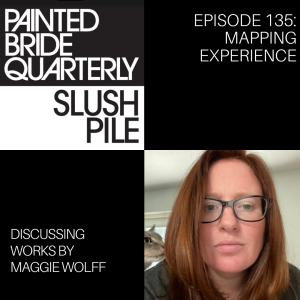
Tuesday Mar 18, 2025
Episode 135: Mapping Experience
Tuesday Mar 18, 2025
Tuesday Mar 18, 2025
Episode 135: Mapping Experience
Dive into the first of a two-part series (a first for us!) of what we’re calling The Maggie Wolff Experience. In this episode we dig into the first two of four poems from her exceptional series of abcedarians called “Surveys, Maps, and Mothers”. These plainspoken, unvarnished poems, which structure painful experiences in multiple dictionary-style entries within each poem, are skillfully crafted. We notice the calm sense of order the form brings to the experience of deconstructing this narrative of intergenerational trauma. We also appreciate the careful attention to lineation, which intensifies meaning, alongside the subtle layering of sound. You’ve got give it a listen!
Links you might like:
Walter Benjamin’s essay “The Work of Art in the Age of Mechanical Reproduction”
At the table: Kathleen Volk Miller, Marion Wrenn, Samantha Neugebauer, Jason Schneiderman, Divina Boko, Lillie Volpe (sound engineer)

Maggie Wolff is a poet, essayist, fiction writer, and Ph.D. student. She recently won an AWP Intro Journal Award for her poetry, and her work has appeared in Hayden’s Ferry Review, Juked, New Delta Review, and other publications. Her chapbook, Haunted Daughters, is forthcoming from Press 254. When she isn't spending her time stressing about Phd-ing, she enjoys long walks, horror movies, and hibernating at home.
Instagram @m_wolffwriter

Wednesday Dec 18, 2024
Episode 134: Tidbits & Trolls
Wednesday Dec 18, 2024
Wednesday Dec 18, 2024
Episode 134: Tidbits & Trolls
Join us for a conversation about new poems by Kelly Egan and a discussion about line breaks, image systems, and the surprise turns poems make. Keep your eyes and ears open, Slushies, the landscape is full of lore. Egan has us pondering possibilities. Once upon a time folks believed in Selkies, shapeshifting seals who make folks fall in love with them in their human form. Who knew it's bad luck to open the door on Christmas Eve for fear trolls will maraud your house? You've been warned. Check out Danish artist Thomas Dambo's mammoth sculpted trolls hidden in plain sight. And if you want to deep dive into another legendary landscape – aka a brick-and-mortar bookstore – be sure to check out Parker Posey's documentary The Booksellers.
At the table: Kathleen Volk Miller, Marion Wrenn, Samantha Neugebauer, Dagne Forrest, Lisa Zerkle, Divina Boko, Jess Fielo (sound engineer)

Kelly Egan writes from dream, reverie, and long drives. She is the author of two chapbooks—Millennial, from White Stag, and A Series of Septembers, from Dancing Girl Press. Her poems can also be found in Maiden Magazine, Interim, Colorado Review, Laurel Review, RHINO, Denver Quarterly, and elsewhere. Kelly has an MFA from Saint Mary’s College of CA and has participated in writing residencies in Iceland and the Peruvian Amazon. She lives in California’s Bay Area. Find her at kellyjeanegan.com.

Wednesday Dec 04, 2024
Episode 133: Delicious Disorientation
Wednesday Dec 04, 2024
Wednesday Dec 04, 2024
Episode 133: Delicious Disorientation
Three poems by Christopher Brean Murray cleverly dropped us all into a wonderful sense of disorientation that we relished navigating. Our discussion touched on time travel, dreamscapes, masterful language and wordplay, and we explored the importance of trusting the speaker in poetry that leans into surrealism. Samantha pointed us to other texts that play with time, perception, and reality, and we spent a little time considering accessibility in poetry. Doom scrolling, misinformation, and disinformation all make appearances in conjured landscapes that brought pointillism to mind. Jason reminds us of the risk of expecting more of the same from a poet when as a reader you’ve fallen hard for an earlier work. It was hard to end our discussion as it was so rich and rewarding. After enthusiastically voting “yes” for the first two poems, we ended on a cliffhanger with the third. (Update: the third poem was ultimately a “no” for us, but the discussion will show how much we appreciated it.)
Links you might like:
Tobias Wolff "Bullet in the Brain"
Tracy Chevalier, "The Glassmaker"
At the table: Kathleen Volk Miller, Jason Schneiderman, Samantha Neugebauer, Dagne Forrest, Lisa Zerkle, Divina Boko, Jess Fielo (sound engineer)

Christopher Brean Murray’s book, Black Observatory (Milkweed Editions), was chosen by Dana Levin as the winner of the 2022 Jake Adam York Prize and was listed by The New York Public Library as one of the Best Books of 2023. Murray served as online poetry editor of Gulf Coast, and his poems have appeared in American Poetry Review, Copper Nickel, New Ohio Review, and other journals. He lives in Houston, TX.

Wednesday Nov 20, 2024
Episode 132: Trust & Fear
Wednesday Nov 20, 2024
Wednesday Nov 20, 2024
Episode 132: Trust & Fear
Talking about fiction is our JAWN slushies. Join us as we discuss Terry Dubow's "The Q," a short story that sounds like it wants to be a crime novel: a murderer gets out of jail and asks to stay with his pen pal. The surprise is that the piece is also a gentle story of male friendship and compassion. We're drawn to the story's ability to showcase the odd-ball sincerity of letter writing, and the strange, retro experience of having to wait for a response. Can you imagine? Putting a letter in a mailbox? Waiting for a reply that has to make its way to you through actual space and time? Does anyone remember licking a stamp? We're here for it, Terry Dubow. Tell us a story.
At the table: Kathleen Volk Miller, Marion Wrenn, Jason Schneiderman, Samantha Neugebauer, Dagne Forrest, Lisa Zerkle, Divina Boko, Jess Fielo (sound engineer)

Born outside of Los Angeles, Terry spent most of his adult life in the great city of Cleveland, Ohio. He is now in the middle of a planned mid-life crisis and living with his wife of 30 years in Marin County, California. While he works at a school that sits directly across from San Quentin, the origin of “The Q" comes directly from his uncle-in-law, Gary Weske, who 20 years ago told a version of it that stuck in Terry’s head ever since. Thanks, Gary! Over the last years, Terry has published more than 25 stories, most recently in The Meadow (upcoming), Litro, Clockhouse, and The New Ohio Review, which nominated his story “Bandits” for the Best of the Net. His frustratingly unpublished novels are represented by Lisa Grubka at the United Talent Agency.
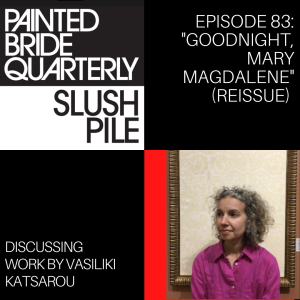
Wednesday Oct 02, 2024
Episode 83: Goodnight, Mary Magdalene (REISSUE)
Wednesday Oct 02, 2024
Wednesday Oct 02, 2024
Goodnight, Mary Magdalene first aired in June 2020 and features three poems by Vasiliki Katsarou, a poet and publisher. In 2023, Vasiliki published a short collection of poetry Three Sea Stones with Solitude Hill Press and a second collection, The Second Home, with Finishing Line Press. It’s a great time to revisit Vasiliki’s work.
Dear Slushies, join the PBQ crew (which includes a freshly-tenured Jason Schneiderman) for a pre-pandemic recording of our discussion of 3 poems by the wonderful Vasiliki Katsarou’s work. Be sure to read the poems on the page below as you listen. They’ll require your eyes and ears– and “a decoder ring.” The team has a grand old time explicating these artful poems. The muses are sprung and singing in us as we read and decide on this submission. Katsarou’s poems teach us to read them without projecting too much of ourselves and our current preoccupations onto them. We’re reminded to pay attention to what’s happening on the page. But synchronicities abound! Before we know it we’re ricocheting off of the poems’ images and noting the wonderful convergences the poems trigger – we hear traces of Wallace Stevens “Idea of Order of Key West” or Auden’s Musee de Beaux Arts. (But first we check in with each other, cracking each other up in a pre-pandemic moment of serious lightness. We’re heard that “Science” shows Arts & Humanities majors make major money in the long run. Kathy reports that “the data on success” shows that participation in Nativity Plays is a marker for career success. Samantha confesses she played Mary Magdalene in a Nativity Play. Marion might have been a Magi. And many of us were reindeer.. Also, Donkeys do better than sheep over time (which may or may not have been claimed on “Wait, wait… don’t tell me!”). Editing a Lit Mag shouldn’t be this much fun, Slushies. Listen through to the discussion of the 3rd poem’s deep magic and craft. And listen to our editors’ cats chime in).
Addison Davis, Jason Schneiderman, Samantha Neugebauer, Kathleen Volk Miller, Marion Wrenn, and Joe Zang
 Vasiliki Katsarou grew up Greek American in Jack Kerouac’s hometown of Lowell, Massachusetts. She has also lived in Paris, France, and Harvard, Mass. She is the author of a full-length poetry collection, Memento Tsunami, and co-editor of two contemporary poetry anthologies: Eating Her Wedding Dress: A Collection of Clothing Poems and Dark as a Hazel Eye: Coffee & Chocolate Poems. She holds an MFA from Boston University and an AB in comparative literature from Harvard University. She read her poetry at the 2014 Geraldine R. Dodge Poetry Festival, and is a Teaching Artist at Hunterdon Art Museum in Clinton, New Jersey. Her poems have been published widely and internationally, including in NOON: Journal of the Short Poem (Japan), Corbel Stone Press’ Contemporary Poetry Series (U.K.), Regime Journal (Australia), as well as in Poetry Daily, Tiferet: A Journal of Spiritual Literature, Wild River Review, wicked alice, Literary Mama, La Vague Journal, Otoliths, and Contemporary American Voices. She wrote and directed an award-winning 35mm short film, Fruitlands 1843, about a Transcendentalist utopian community in Massachusetts. Vasiliki’s website: https://onegoldbead.com/, Twitter: https://twitter.com/cineutopia , Facebook: https://www.facebook.com/vasiliki.katsarou, and Instagram: https://www.instagram.com/cineutopia/
Vasiliki Katsarou grew up Greek American in Jack Kerouac’s hometown of Lowell, Massachusetts. She has also lived in Paris, France, and Harvard, Mass. She is the author of a full-length poetry collection, Memento Tsunami, and co-editor of two contemporary poetry anthologies: Eating Her Wedding Dress: A Collection of Clothing Poems and Dark as a Hazel Eye: Coffee & Chocolate Poems. She holds an MFA from Boston University and an AB in comparative literature from Harvard University. She read her poetry at the 2014 Geraldine R. Dodge Poetry Festival, and is a Teaching Artist at Hunterdon Art Museum in Clinton, New Jersey. Her poems have been published widely and internationally, including in NOON: Journal of the Short Poem (Japan), Corbel Stone Press’ Contemporary Poetry Series (U.K.), Regime Journal (Australia), as well as in Poetry Daily, Tiferet: A Journal of Spiritual Literature, Wild River Review, wicked alice, Literary Mama, La Vague Journal, Otoliths, and Contemporary American Voices. She wrote and directed an award-winning 35mm short film, Fruitlands 1843, about a Transcendentalist utopian community in Massachusetts. Vasiliki’s website: https://onegoldbead.com/, Twitter: https://twitter.com/cineutopia , Facebook: https://www.facebook.com/vasiliki.katsarou, and Instagram: https://www.instagram.com/cineutopia/
The Future Arrives as a Redhead
They talk of mothers in law
but not of outlaw daughters
her sun and her moon is our son
her cool paleness, reflected
in an eye that looks like mine,
follows her curves along the shoreline
her hair like copper coils
from beneath a straw hat
a Maisie or Daisy, a woman of Stem
for whom we stem talk of servers,
thumbprint keys, on an ancient island
now we are all code-changers
the future arrives as a redhead
green, green love lays a glove
on us, we no longer count
in threes, a quaver
sounds, and the future
all sharps and flats
*
Wedding, Key West
A stitch in throat saves time
Infernal cough
speaks through me
@ the bride and groom
On sand they stand
to create a sand souvenir
from this empty glass vessel
Sunset drips from the lips
of the bride
As the prey is plucked from the air
between her palms
In the gulf beyond
the photographer’s camera,
a capsized sailboat,
but no one’s looking–
The Key light bedazzles
and defeats us all
Mouth tightly shut
clench in the solar plexus
*
Waited
you waited with me as the house
next door emptied of its guests,
then its owners, fairy tale turned animal farm
minted with ash and wishes
you were my kitchen elf
my second thought
my echo’s echo
cocked ear, cracked oasis
your absorbent embered orbs
that morning of the supermoon
setting behind the barn
you were quiet, then quieter still
white fog settling into the hollows
and a thin coat of frost everywhere
and this, the simplest death
you trained me well, M.
I listen for your listening
Wednesday Sep 04, 2024
Episode 62: Six Degrees of Separation (REISSUE)
Wednesday Sep 04, 2024
Wednesday Sep 04, 2024
While we’re on a brief recording hiatus, we have a re-issue of an episode from 2019, when our team took a rare look at a non-fiction piece by author Andrew Bertaina. It’s great timing to take a fresh look at this episode, as earlier this year Bertaina published a collection of essays called “The Body is a Temporary Gathering Place”. Enjoy the episode and check out Bertaina’s new collection!
Welcome back to another Painted Bride Quarterly Slush Pile. Today we have an excellent episode with a bit of something different. After a set of introductions in which Marion gets out her glue gun the gang dives right into a piece of non-fiction by Andrew Bertaina labeled “The Offering”.

Andrew Bertaina's work has appeared or is forthcoming in many publications including: The Best American Poetry 2018, The ThreePenny Review, Tin House online, Redivider, Crab Orchard Review and Green Mountains Review. More of his work is available at www.andrewbertaina.com
After an excellent reading by Kathleen, Tim describes how churches offer less of a sense of community these days; being more concerned with hellfire and crucifixion. Next, Marion describes how the piece offers a sense of timelessness while lamenting on her own exhaustion from various teaching duties. Marion contends that the piece allowed her to compose herself and gave her a sense of fulfillment. Samantha speaks a bit on curation, and how that differs from what is displayed on social media. Before voting Tim mentions how historically specific the piece is, and the idea of somebody that you used to know. Will this piece make the cut? Or will it fade into obscurity?
The Offering
At church this morning, I passed around a collection plate to gather up the scraps of all the people I have known. The bowl was silver and its size was like that of space. Inside, I found: a hike through a hailstorm in Colorado where blue jays where eating other bird’s babies; I found an evening spent from midnight till morning talking about the way that I dreamed of divinity; I found a piece of a tetherball string, still wound tightly around a silver pole; I found a pocket of gummi worms, unopened, thrown in the trash can at recess; I found a small side yard where I dug for dinosaur bones; I found a picture with the words I love you written across the top; I found tears and tears, until I was swimming through all the tears, trying to remember why we are all such bizarre puzzles; I found a slip of paper with someone’s e-mail on it that I threw in the trash; I found a cabin in the woods with a couch and a blanket; I found a picture of you standing with me in the same shirt I wore only two weeks ago, but it was more than a decade ago; I found that the years start to run together like water that you can’t separate out the moments that you used to; I found pictures of people in wedding dresses and tuxedos, people that I used to know, and I smiled at their happy faces, because they made me happy when I knew them; I found a picture of San Francisco, stiff breezes off the bay, always so damn cold, and inside the picture was another picture of a hospital, and inside that hospital a memory of people who are now dust; I found an evening in the mountains of Santa Barbara, and a sunrise too; I found a picture of five of us sitting in a room talking about the ways in which we had failed, the ways in which we’d like to succeed; I found a picture of a piano and green couches; I found a picture of a mountain trail, pine trees and old bear scat; I found a picture of the ocean, of your hand in mine, before we glided together. I found a picture of a tower in Italy, a winding staircase leading to a view of some ancient city.
I spent the evening afterward, sorting all these pictures into specific piles.
Afternoons that could have lasted forever.
Times I went to the ocean.
Women that I have loved.
Women that I did not have the time to get around to loving.
People that I once knew.
People that I used to know and wish I still knew.
Avenues that I have walked down.
Avenues that I wish I had walked down.
Pictures of places that I am not remembering properly.
After I was done organizing these moments, I wrote them all down on the computer screen, which flickered, in and out just like memory does. I know that thousands, millions, far more numerous than the stars, are still missing. I want you to know that I’m trying to remember all of you, despite the futility of it. I’m reaching out to the people I have known and the people I will know. I miss all of you already, so the next time you see me, let’s meet, not was if we were strangers, but as people who have, for longer than they can remember, been very much in love.
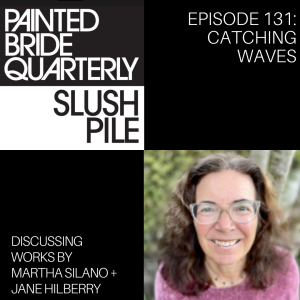
Tuesday Jul 30, 2024
Episode 131: Catching Waves
Tuesday Jul 30, 2024
Tuesday Jul 30, 2024
Slushies, waves abound in this lively discussion of a poem by Martha Silano and two more by Jane Hilberry. The way stream of consciousness can crest and fall, sound waves, the missed and caught waves in real life (including runs of luck or the lack of it), not to mention the different ways in which we experience poetry– the gang rides wave after wave. We regularly find that our process of reading poetry aloud causes one or more of us to experience a poem anew. Sometimes it provides clarity that wasn’t there when it was confined to the silence of the page. Sometimes it brings up questions. As always, we were grateful to have the trust of two amazing poets willing to share our discussion of their work. (We were going to call this episode “In Bed with Marion & Kathy” and we’ll let you find out why by having a listen!)
At the table: Kathleen Volk Miller, Marion Wrenn, Jason Schneiderman, Angelique Massey, Lisa Zerkle, Dagne Forrest, Vivian Liu (sound engineer)

Martha Silano’s six books include This One We Call Ours, winner of the 2023 Blue Lynx Poetry Prize, and available from Lynx House Press. She is also the author of Gravity Assist, Reckless Lovely, and The Little Office of the Immaculate Conception, all from Saturnalia Books. Martha’s poems have appeared in Poetry, The Paris Review, American Poetry Review, The Missouri Review, and elsewhere. She enjoys birdwatching, botanizing, and hanging out with her kids and cats. Learn more about her work at marthasilano.net.
The Luck of It
What counts is that my car, when it gets broken into, what’s gone
is replaceable, like that leather jacket my friend Alison threw at me
when she left for California. Please take it! (I got a new one for Christmas).
Once, when I left it unlocked, someone spent the night in my Hyundai.
All in all, I was happy to offer a place of refuge, especially on account
of nothing stolen, not the extra pair of socks, not my maroon hat or hand sani,
the only tip off being the empty bottle of Sprite. Sprite!
I mean, you’re kidding me. My husband jokes how I get so excited
about the crumb that drops on my plate from that giant chocolate croissant
in the sky, tells me I’m like a housefly with a tiny chunk of pizza
it can’t believe it’s had the good fortune to land on. And look! It’s even got a little dab
of pepperoni juice! It seems I set the bar low,
and maybe he’s right, though when I ran track,
the field part kind of scared me. In tenth grade, when Suzanne Glester
broke the state record in the high jump,
I could barely keep myself from looking away
as her contorted body landed in a heap on a thick mat
that never seemed thick enough. Honestly,
I’m just glad I’m not the guy on Next Door
who posted about the lonely chicken: I see her wandering around.
Seems like she need another little hen.
Do any of you have one you’d like to re-home?
Or the woman who shared someone’s been racing their car
up Juneau. making a hair pin turn onto Seward Park Avenue.
It literally rattles our windows. I’m tempted to respond I feel your pain,
but having rattling windows means you live in a home? I guess what I’m trying to say
is that when two guys were about to kick in
our basement window, I happened to stroll by with a bag
of dirty Huggies for the bin. Yep, a load of dirty diapers saved us.

Jane Hilberry is just weeks into retirement after a happy 35-year teaching career at Colorado College that began with Medieval and Renaissance literature and ended up in Creativity & Innovation. So far retirement involves mostly sleeping and swimming, but she aspires to write poems, paint, and make small objects for sheer delight. Her books of poems include Still the Animals Enter and Body Painting (Red Hen Press) and a chapbook co-authored with her father, Conrad Hilberry, titled This Awkward Art: Poems by a Father and Daughter (Mayapple Press). Paintings and small objects can be found on Instagram @jhilberry.
I might have planned badly
My friends are ga-ga over their grandkids, over the moon!
Pictures on their phones of the toddler pushing the vacuum,
the dog sleeping wrapped around the child.
My god, I was driven. I translated every word of Beowulf,
working out each noun’s case ending, nominative, accusative, genitive,
dative, or a vestigial instrumental. I spent my twenties
in a library carrel until 2 a.m. closing. I could regret it now,
but there was no stopping that one, whoever she was.
Baby, I’m going to be seventy soon, and eighty.
Coastal Cali
At the intersection, a stream of newly washed
Benzes and Bentleys. A man in a camel coat surveys
a café patio: "I'm dressed inappropriately,” he says.
He’s crew for Hollywood Medium. Against the roar
of leaf blowers, Que tiempo hace hoy plays on someone’s radio.
It's breezy, seventy-five.
Meanwhile, at the water,
surfers lift and fall, surge and sink. The dark triangles
of their heads and shoulders move like fins
in undulating circles, till one rises, twists and vees,
rides the wave into a bloom of foam.
What is this world? wrote Chaucer, What asketh man to have?
Xanax for the rough days. I can't identify the flora—
Yarrow? Ice plant? —or remember the gods of the sea.
Zephyr? Poseidon? No one here calls it the sea.
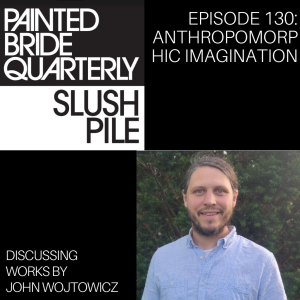
Tuesday Jul 16, 2024
Episode 130: Anthropomorphic Imagination
Tuesday Jul 16, 2024
Tuesday Jul 16, 2024
The natural world and human nature provide a variety of jumping off points for three poems that contrast the ego and experience of each poem’s speaker with other perspectives, both observed and imagined. The discussion touches on the use of a strong opening conceit, lineation that cannily reflects breathwork, and leaning into specificity as strong poetic moves. Let’s not forget the role that taste plays! Kathy’s internal sommelier springs to life twice to flag questionable taste in wine and a discussion of the third poem under discussion highlights the role that direct experience and cultural awareness can play in appreciating the landscape of a poem. The discussion also briefly lingers on the question of whether singer Dionne Warwick is still alive and well and performing. At the time of writing these notes, she most certainly is!
Some links we think you might like:
Dionne Warwick, Do You Know the Way to San Jose (YouTube)
At the table: Kathleen Volk Miller, Marion Wrenn, Lisa Zerkle, Jason Schneiderman, Manuel López, Isabel Petry, Vivian Liu (sound engineer)

John Wojtowicz grew up working on his family’s azalea and rhododendron nursery and still lives in the backwoods of what Ginsberg dubbed “nowhere Zen New Jersey.” Currently, he teaches social work at Stockton University. He serves as the Local Lyrics contributor for the Mad Poet Society blog and has been featured on Rowan University’s Writer’s Roundtable on 89.7 WGLS-FM. Recent publications include: Rattle, Split Rock Review, Soundings East, West Trade Review, and The Ekphrastic Review. He is the author of the chapbook, Roadside Attractions: a poetic guide to American oddities. Find out more at: www.johnwojtowicz.com
Kolyuchin Island
Polar bears have taken up residence
within the marmalade walls
of an abandoned weather station,
the lone dwelling
on a small island in the Chukchi Sea.
This unexpected sanctuary,
strategically located
between Russia and Alaska,
has a post-apocalyptic feel
like the Statue of Liberty scene
at the end of the first Planet of the Apes, but cuter.
White-coated inhabitants
can be seen sunning themselves
on the front porch,
poking frosty heads from turquoise
window frames, wandering
their 2.8 mile yard littered with rusted tanks
and construction debris.
Pierre Boulle never wrote
a sequel to the Planet of the Apes.
Man loses. The End.
And with earth’s history of ruling classes
and our self-destructive tendencies,
this is the likely scenario.
If by some grace, we go out without taking
every living thing with us,
it gives me pleasure to picture
a sleuth of grizzly bears
as the heirs to Buckingham Palace.
As a whole, extraterrestrial
anthropologists will have to assume,
we cared very little
about the arctic fox, musk ox, and polar bear,
dooming these lifeforms
(and then ourselves).
And even though I didn’t do much to stop it,
I hope they’ll find
the remains of my glacial wall calendar
and arctic-themed necktie
or better yet the yellowed receipt
from a donation I plan on making
to the World Wildlife Fund
and conclude that I was one of the good ones.
Wild
The rugs haven’t been cut in a long while
and the shag is starting to tickle
my chin. It’s up to my neck
which is sometimes
how I feel navigating the jungle of my life
which germinated
from the garden of my childhood
and went mostly untended
for the first quarter or so.
Yes, it’s been some time
since I backpacked through nightclubs,
traversed the landscape of closing time,
tossed the map on an LSD trip.
Right now, I am dead-heading petunias
on my back deck. My two kids
are sleeping. The dog is chasing
lightning bugs. My wife is finishing a glass
of Moscato and will soon be
waiting for me in our bed. Earlier today
I added boat-tailed grackle
to my backyard bird list.
My zucchini is starting to flower
and so is (for the first time)
the southern magnolia
planted a few springs back.
The groundhog I nicknamed Big Orange
is on his hindlegs
taking in the evening news.
And as the sun moves to give someone else
a turn with the light,
I consider that this
might be the wildest I’ve ever been.

Tuesday Jul 02, 2024
Episode 129: Chew on This
Tuesday Jul 02, 2024
Tuesday Jul 02, 2024
What's your love language, Slushies? Is it touch, or talk? Recipes or arithmetic? Join us for this episode devoted to poems by Jin Cordaro, whose work strikes an incantatory tone, draws us in, and gets us chewing on the riddles of the human predicament. How do our bodies know things before our minds do? How do other people's shopping lists make us ache for connection? We focus on the art of lists, the arc of poems, and the power of a poet's voice to invite and hold the reader's attention.
In post-production we discovered the poem “Flavor in the Hands” was accepted elsewhere. It will appear in Bacopa Literary Review in the future, and we’re delighted for Jin.
A link we think you might like:
Please Touch Museum, Philadelphia
At the table: Kathleen Volk Miller, Marion Wrenn, Lisa Zerkle, Samantha Neugebauer, and Holly Messitt, as well as our briefly larger than normal tech team Heath Bailey, Jess Fielo, and Vivian Liu (without whom we’d be lost!)

At four feet seven inches, Jin Cordaro believes she holds the record for most petite living poet. Having had twins, she also believes she holds the record for most times people have asked, “They came from you?” Her work has appeared in The Sun, Faultline, Smartish Pace, and Bacopa Literary Review, and has been featured on the podcast The Slowdown. She and her family live in central New Jersey.
That Time You Stole Someone’s Shopping Cart
With their shopping list in the seat,
and a flower doodled in the corner – a sign
not a curse or a prayer, a devotion,
a singular language
to nourish and be nourished.
Familiar words, combined in a cipher,
you can only translate every third word –
paprika followed by shallots means
to put effort or caring.
Cranberries combined with pecans
and butternut squash means
to sustain, keep well.
What would this taste like?
This list a thin opaque crepe filled with
the soft, oozing breadth of someone’s attention
and time. You slip it into your jacket
keep your hand on your pocket as
you walk the store. Rush home
to unfold it, imagine it still warm,
slightly browned on a skillet,
sweet and bready with love.
You chew it slowly –
the only piece of food
to be found.
The Sum of One
1/3 parent + 1/3 employee + 1/3 spouse
does not equal 1 whole you but
permutations of you.
Only one can execute its function
at any given time.
Requirements call for
1 ½ parent you + 1 ½ work you + 1 ½ spouse you =
invalid calculation. Insufficient source.
Multiply by a factor of
school concert x illness x hosting holiday =
exponentially negative integer you.
Divide this number by
the number of your children,
given age as a factor of x.
Write a proof that demonstrates
1 you – job + bills = increase in sanity?
Or 1/3 parent you – cleaning toilets – cooking =
increase in you?
You are the product of division.
You ÷ x = disappearing you
reduced to null an imaginary unit
when all you want is to be prime
divisible by only 1 and yourself.
But 0 too can be divided by any number
and still remain the same

Tuesday Jun 18, 2024
Episode 128: Put Your Pants Back On!
Tuesday Jun 18, 2024
Tuesday Jun 18, 2024
We just had to start this episode with a reassurance that everyone was dressed, which you’ll understand as soon as you read or listen to “Pneuma”, the poem by BJ Soloy that kicks everything off. The bonkers energy of a country and a world overflowing with bad news and tragedy is juxtaposed with some very real tenderness and self reflection in two astounding pieces by Soloy. These astutely paced poems are brimming with the overwhelm of modern life while threading in historical references (Brown vs. Board of Education, Troost Avenue, and scud missiles, for starters).
Some other links we think you’ll like:
At the table: Kathleen Volk Miller, Marion Wrenn, Samantha Neugebauer, Dagne Forrest, Jason Schneiderman, Lisa Zerkle, Isabel Petry

BJ Soloy is the author of Birth Center in Corporate Woods (forthcoming from Black Lawrence Press), Our Pornography and other disaster songs (Slope Editions, 2019), and Selected Letters, a chapbook out with New Michigan Press. He lives and dies in Des Moines, home of the whatever.
Pneuma
Put your pants back on, America.
It’s four in the morning & also
five, three, & two, simultaneously,
you big lug. Plus, there’s snow.
In this light, really any light,
my nose looks like a tired potato
got punched in its mute mouth.
With any light on, I want to see other people
when I look in the mirror, when I slouch
in this bathroom booth where I hope to die
on the shitter, like an American,
like one of yours. Clinton, TN is any other frowsy town
with a cock & balls scribbled on its playground slide
& square pitbulls straining at their chains.
America, I came to bed late as always.
You roll over, softly surprised & then delighted,
offering, “I forgot where I was.” I’m yawning,
breathing just to get oxygen on this fire.
Well, tonight is not the only place I am
tonight. Beyond me & between me
light bulbs hiccup & burble
& a frenzied squirrel loses its map
of maples & restarts. Maybe we ought to
take what we’ve still got & laminate it in frost
& then salt & then the gold leaf over spring’s pat rapture.
There are things I’ve learned already this young
soft year I don’t know what to do with: one
gets a pregnancy test when in the ER
for their attempt on their own life. What to name that baby?
I worry I’m doing this wrong. I’ve got beans soaking, sharps
& meds hidden, the last dank well swill of our bank account
miraculously transformed into boxed wine. Winter’s here
with its expressive eyebrows & doomed neighborhood cats
under every car. You yawn so I kiss you & you taste better
than free food, but you can’t sleep & I try to stay up reading
but layers of exhaustion—wet blankets on this piss whisper
of a fire—keep accumulating. I worry you’ll do it right next time
& I’m still attached to this day of ours, whatever day it is.
Benesh
It’s been a long night & your mouth already tasted like rain an hour ago. Writing
often of the sky instead of tasting it, I look to the sconces & the sconces
look fake & their light looks fake & I have authentic responses to both,
which is how storms start. As seasons
digest themselves (a short talk on short talks), holiday cards become
less applicable & so more affordable & Fox 8 or whatever news vans circle
the weather or immanent site of tragedy tourism. Some nights I go out & walk
the sidewalk in socks or bare feet
longer than I’d meant to & notice the crystal glass & homely bends
& feel deeply the Troost neighborhood. My ears circle in on themselves, stereo
sinkholes, by which I mean I’m eavesdropping & I’m sorry. I’ve had bad teeth forever
& so got online & bought God’s vibrator
as a toothbrush & sunburned my mirror & stood boldly before the middle-aged self.
White as I am, I trust most the islands that kill their first tourists. Three weeks’
swim away, a cargo ship full of luxury cars continues to burn in the Atlantic.
A mother about a mile from right here
killed her dog & decapitated her son after calling the cops on the devil. The news:
The snows. The Olympics. Rubble-crusted outskirts of Kiev. The soft snoring
of our toddler. What do we do? I dither. I stand numb before the light.
I look deeply. I look like Fabio
if, instead of an angular chin, his face flesh just sort of dangled & then if also
that formless dangle continued on down the rest of the frame. My point is
I have long hair right now. A Hadean earth. A wobbling star. A thought floating in
like pickled nimbus, ghost fart. In the mirror,
I am an amplified echo of my middle school self making muscles at himself, waiting
for hair to grow, SCUD missiles arcing across the nightly news downstairs.
Tonight, I got news off Facebook, which makes me middle-aged again
& sad. You’d already gone to bed when I found out Robert died. I didn’t wake you up. I
didn’t even check you were asleep. You needed
a night & this news is not the night you needed. A neighbor is yelling at something,
maybe himself, & the still-lengthening night repeats. I rarely call in favors, but every
time I do, I claim to do it rarely, but still, please sleep. Please go to sleep or
keep sleeping. He was thirty-three. It’s later still & your mouth is full
of rain. I’ll tell you in the morning.

Tuesday Jun 04, 2024
Episode 127: Ecstatic Collapse
Tuesday Jun 04, 2024
Tuesday Jun 04, 2024
Our first order of business was debating lifestyle choices in NY vs. Philly, after which we dug into two wonderfully different poems by Glenn Shaheen. “Imago” plunged us into an elegaic interrogation of modern life, identity, and poetics framed by both the real world and open world gaming. With Glenn’s poem as our guide we roamed wide, touching on gaming terminology, Bey’s “Single Ladies” and 2008 as the last year of optimism, Kurt Vonnegut’s Breakfast of Champions, Shakespeare’s “filthy” Sonnet 135, and the ageless concern over the shelf life of language in poems and artistic works. The circular format of short, interlinked stanzas in the second poem, “Power and Punish”, introduced a real change in tone in the discussion. Frankly, we wondered if the poem’s format and approach would allow us to discuss it. We were delighted to discover it was possible, if different – but hey, you be the judge!
Some links we think you’ll like:
NPC (Non Player Character) on WikiHow
Beyoncé - Single Ladies (Put a Ring on It)
Michel Foucault on the Panopticon Effect, Farnham Street blog
At the table: Marion Wrenn, Kathleen Volk Miller, Jason Schneiderman, Dagne Forrest, Isabel Petry

Glenn Shaheen lives in Houston and is the biggest Star Trek fan you’ll ever meet.
Tuesday May 21, 2024
Episode 126: Narrative Possibility
Tuesday May 21, 2024
Tuesday May 21, 2024
We kick off this episode with some riffing on Hallmark movies and a suspension of Jason’s voting rights. No worries, though! The two poems under discussion are by a former student of Jason’s and it comes clear pretty quickly that we’re all fans. Don’t listen to this episode for the suspense, but for the delicious delve into narrative possibility and how poetry is wonderfully suited to keeping the door open long after a poem ends. Indented lineation and how it can affect a poem’s pacing gets some attention, as does the sensory tease of wonderfully selected symbolism and imagery. We also touch on the implication of the reader in a poem where the speaker is still working things out. In this film-tinged discussion, Kathy reminds us that a sweet ending can hit the spot, Sam confesses to thinking a lot about “Baby Boom”, Dagne owns up to seeing Raiders of the Lost Art eleven times when it was first released, Jason pays homage to Diane Keaton and Liza Minelli, and Isabel poses a question that underscores our theme of narrative possibility.
Some links we think you’ll like:
Whisky & Rum in Raiders of the Lost Ark, ThirstMag.com
How Baby Boom Set the Template for Future Movies About Working Mothers, Vulture
At the table: Kathleen Volk Miller, Jason Schneiderman, Samantha Neugebauer, Isabel Petry, Dagne Forrest

Georgia M. Brodsky is a recent graduate of the MFA Program for Writers at Warren Wilson College. She lives south of Boston, near the ocean, with her partner and their daughter.
The Tavern
After I cracked the 6-ball off the table,
he offered to teach me
to drive stick in the parking lot.
Before: whiskey
in no-one’s-joking-sized
shot glasses, the kind
the cool girl in Indiana Jones throws back
then stacks like a champ
while men fall off their stools
around her. Heavy glasses.
No windows. Just the door
to the lot, to the harbor
eventually, where earlier that day
I’d seen a girl my age
with a pocketknife, cleaning a fish.
She’d plucked the eyes out,
let them sit
on the ground staring up
like a figment in Charlie Kaufman’s
dreams. Every story is a version
of something else.
I followed him to his car. I didn’t.
I laughed and touched his arm. I balled
my hands into fists. My body
felt something was wrong. I felt
nothing. It always turns out alright
in the end. It never does.
I’m the girl who climbed
into the truck and the one
who got home safe. I taught myself
how to drive stick and how to run
the table. I’m the girl in the harbor.
All eyes.
At the Raw Bar, Housing Three Dozen Oysters for our Eighth Anniversary
We’re not in it for the sex,
if that’s what you’re thinking.
And besides, I’m not the kind
of person who shucks and tells.
That was a joke. But it’s exactly
what I’m talking about.
I’m the kind who makes jokes
when something matters too much.
We’re not in it for the sex.
It’s more about what happens
after the shell unlatches:
brine, salt, alive, pulling us in
by the shirt, shaking us
and putting us down as if
tentacles had launched out
from under the ice.
That wasn’t a metaphor
for our relationship. I’m honest
to God talking about oysters:
the knock-back, the vinegar zip,
extra lemon on the side.
A feeling like our bodies could turn
back into fish. A speedboat
revving from zero to sixty, that’s how
it felt to throw down my first
Mookie Blue after nine
pregnant months. Forget forks
or sauce or napkins. If every drop
of oyster liquor doesn’t make it
to your mouth, you shouldn’t
even be here, and by here,
I mean sitting across the bar,
gaping at us, saying, wow,
that’s a lot of oysters,
or standing on the shores
of an oyster farm, complaining
that the wind’s too cold.
Am I getting any closer
to explaining myself?
When we first met, he traced
his finger along the coves
of Maine’s coast, a chart
of waterways and kayak routes,
I swear, the only freshman
with a map of water pinned
to his dorm room wall, and
that was fourteen years ago,
but in that moment, I loved him.
We toast with a click of our shells—
he lifts one to his lips.
Tuesday May 07, 2024
Marie Manilla Watchers
Tuesday May 07, 2024
Tuesday May 07, 2024
Watchers
Zany lies amid clutter on the floor beneath the dining room windows hugging her bandaged arm. She huffs loudly enough to reach the front porch where Mom and Aunt Vi imbibe scotch. Vi still isn’t used to afternoon drinking. They can’t hear Zany over the Krebbs’ crying baby on the other side of the duplex wall. Stupid baby. Plus Zany’s little sister overhead dancing to the transistor radio, rattling the light fixture dangling from the ceiling.
The fingertips on Zany’s bandaged arm are cold and maybe even blue. This is slightly alarming. She considers running to Mom but knows better. Take the damn thing off then, Mom will say.
There’s nothing wrong with Zany’s arm, but that isn’t the point. At breakfast, without preamble, she wound an Ace bandage from her palm to her armpit. The family no longer asks what she’s up to. Last week during Ed Sullivan she sat at her TV tray dripping candle wax over her fist. Aunt Vi blinked with every splat, but Mom only said: “If you get that on my rug I’ll take you across my knee. I don’t care how old you are.” Zany is thirteen.
Week before, Zany taped a string of two-inch penny nails around her throat at the kitchen table where Dad rewired one of Mom’s salvaged lamps. “Why don’t you do that in your room?” Dad didn’t like sharing his workspace. Zany shrugged and the nail tips jabbed her collarbones. She could have done it in her room, but doing the thing wasn’t the point. It was having someone watch that mattered. If no one watched, who would believe she could endure that much discomfort?
Nobody is watching now, so Zany grips a dining table leg and pulls it toward her, or tries to. It’s hard to budge through Mom’s junk piles, plus the weight of the extra leaf Dad inserted when Aunt Vi and Cousin Lester moved in after their apartment collapsed. Aunt Vi brought cans of flowery air freshener to hide the hoard smell—rotten food and cat piss. They don’t own a cat. Lester, sixteen, bought a box of rubble-rescued books.
“You better be setting the table!” Mom calls through the screen.
Zany hates Mom’s manly haircut and has said so. “It’s Gig’s turn!”
Overhead, Gig stomps the floor in the bedroom they now share. Aunt Vi got Zany’s attic where Mom’s hoard had been disallowed, but it’s begun trickling up. “No, it’s not!” Gig’s transistor blares louder.
“Zany!” Mom calls. “I swear to God! And close those drapes!”
Mom can’t stand looking at the neighbor’s wall she could reach across and touch, but Zany craves fresh air, as fresh as Pittsburgh air can be. Plus, she likes counting the yellow bricks Andy Warhol surely counted when this was his childhood home, the dining room his make-shift sickroom when he suffered St. Vitus Dance. Zany is certain his bed would have been right here by the window where he could see a hint of sky if he cricked his neck just right. She lies in his echo and imagines the day she’ll appear at his Factory door in New York City and say: “I used to live in your house.” Andy will enfold her in his translucent arms before ushering her inside, not to act in his films or screen print his designs, but to be his equal. Partner, even. Zany just has to determine her own art form. It sure won’t be cutting fruit cans into flowers like Warhol’s mother did for chump change.
Zany’s legs start the herky-jerky Vitus dance as if she’s running toward that Factory dream. Her pelvis and hips quake. The one free arm. The back of her head jitters against the floor. It’s a familiar thrum even Aunt Vi and Lester are accustomed to now. Mom yells: “Stop that racket!” She mutters to Vi: “We never should have bought this place.”
A kitchen timer dings and Aunt Vi comes in to disarm it. Her cooking is better than Mom’s, and Vi wears an apron and dime store lipstick while she does it. Fresh peas instead of canned. Real mashed potatoes instead of instant. Vi is a better housekeeper, too, organizing Mom’s trash into four-foot piles that line the walls. Every day Mom trolls back alleys and neighbors’ garbage in dingy clothes that make her look like a hobo. That’s what the kids say: Your mom looks like a hobo. She pulls a rickety cart and loads it with moldy linens, rolled-up rugs, dented wastebaskets. Zany wonders if Dad regrets marrying the wrong sister. She knows he regrets not having a son, a boy who could have been Lester if Dad had a different heart. Instead, Dad got Lester on at the blast furnace, because “No one sleeps under my roof for free.” Who needs a high school diploma?
In the kitchen, Aunt Vi lets out one of her sobs. She only does that in private after Mom’s third scolding: “He’s dead, Vi. Crying won’t bring him back.”
Zany misses Uncle Mo, too. His pocketful of peppermints. The trick coin he always plucked from Zany’s ear. The last time Zany’s family visited, she walked through their decrepit Franklin Arms apartment with its spongy floors and clanking pipes, but no maze of debris to negotiate. No cat piss smell or sister blaring the radio. She found Lester in his room at a child’s desk he’d outgrown, doughy boy that he then was, doing homework without being nagged. Astounding. His room was spartan, plenty of space for a second bed if Zany asked Aunt Vi sweetly enough. But no. Zany couldn’t abandon Andy in his Dawson Street sickbed. Lester’s only wall decoration was a world map strung with red yarn radiating from Pittsburgh to France, China, the South Pole. She wanted to ask why those destinations, but didn’t, entranced as she was by all that fresh-aired openness, plus his feverishly scribbling hand.
Now, Aunt Vi leans in the dining room dabbing her face with a dishtowel. She’s aged a decade since moving here and it isn’t all due to grief. She targets Zany on the floor. “Everything all right in here?”
Zany has stopped breathing. Her eyes are glazed and her tongue lolls from her mouth. She’s getting better at playing dead.
“All right then.” Aunt Vi is getting better at not reacting. The screen door slams behind her.
Zany pulls in her tongue and inhales. She starts counting bricks again until Aunt Vi calls: “There they are!” as she does every workday.
Zany pictures Dad and Lester padding up Dawson. Wet hair slicked back because they shower off the stench before coming home. Zany appreciates that. Their boots scrape the steps to the porch where Aunt Vi will take their lunchpails. And there she is coming through the door and dashing to rinse their thermoses at the kitchen sink. Mom will stay put and pour Dad a finger of scotch.
Lester bangs inside and pauses in the dining room entryway. He’s leaner now on account of the physical labor. Taller too. He eyes Zany’s bandaged arm, not with Aunt Vi’s alarm, but with the kind of baffled wonder Zany has always been after. Their eyes meet and it’s the same look he gave her the day she walked backward all the way to the Eliza Number Two—not because Dad and Lester worked there, but because it was lunchtime, and a gaggle of men would be eating beneath that pin oak by the furnace entrance. And there they were, her father among them, not easy to see having to crane her neck as Zany picked her way over the railroad tracks.
“What the hell is she doing?” said Tom Folsom. Zany recognized her neighbor’s voice. “She’s off her nut,” said another worker.
Zany twisted fully around to see if her father would defend her, but he was already hustling back to the furnace.
“Something’s not right with that girl,” said Folsom.
“Nothing wrong with her,” said Lester from beneath a different tree where he ate his cheese sandwich alone.
Folsom spit in the grass. “Shut up, fairy boy.”
Lester wasn’t a fairy boy, Zany knew.
Today, leaning in the dining room, Lester looks as if he can see inside Zany’s skull to the conjured Factory room she and Andy will one day share: walls scrubbed clean and painted white. Her drawings or paintings lining the walls in tidy rows. Maybe sculptures aligned on shelves. Or mobiles overhead spinning in the breeze. Lester nods at her fantasy as if it’s a good one. He has his own escapism. Zany knows that too, and she looks away first so her eyes won’t let him know that she knows.
Lester heads to the cellar where he spends most of his time. Mom partitioned off the back corner for him with clothesline and a bed sheet. Installed an army cot and gooseneck lamp on a crate. Andy Warhol holed up in the cellar when he was a kid developing film in a jerry-rigged darkroom. Zany constructed one from an oversized cardboard box she wedged into that shadowy space beneath the stairs. She cut a closable door in the box and regularly folds herself inside to catalogue her achievements in a notebook. Stood barefoot on a hot tar patch on Frazier Street for seventy-two seconds. Mr. Braddock called me a dolt, but I said: You’re the dolt!
From below, the sound of Lester falling onto his cot followed by a sigh so deep Zany’s lungs exhale, too. Whatever dreams he had got buried under apartment rubble along with Uncle Mo.
Outside, Dad has taken Aunt Vi’s creaky rocker. “He’s a strange one,” he says about Lester. “What’s he up to down there?”
Mom says, “Who the hell knows?”
Zany clamps her unbandaged hand over her mouth to keep that knowledge from spilling. She saw what he was up to the day she was tucked in her box and forgot time until footsteps pounded the stairs above her. She peeked through the peephole she’d punched into her cardboard door as Lester peeled off his shirt, his pants. He left on his boxers and socks. Didn’t bother to draw his sheet curtain, just plopped on the cot and lit a cigarette. His smoking still surprised her. The boy he once was was also buried under rubble. Zany regretted not making her presence known, but then it was too late with Lester in his underwear, and all. Plus, she was captivated by his fingers pulling the cigarette to his lips. The little smoke rings he sent up to the floor joists. She wondered if he was dreaming of China or the South Pole, or just sitting quietly at his too-small desk back in his apartment inhaling all that fresh air. Finally, he snubbed out the cigarette in an empty tuna can. Zany hoped he would roll over for sleep, but he slid a much-abused magazine from beneath his pillow and turned pages. Even in the scant light Zany made out the naked lady on the cover. Zany’s heart thudded, even more so when Lester’s hand slipped beneath his waistband and started moving up and down, up and down. She told her eyes to close but they wouldn’t, both entranced and nauseated by what she shouldn’t be seeing. She knew what he was up to, having done her own exploring when she had her own room. She’d conjure Andy Warhol’s face and mouth and delicate hands—because those rumors weren’t true. They just weren’t. Harder to explore in the bed she now shared with Gig. Stupid Aunt Vi, and stupid collapsed Franklin Arms.
What Lester was up to looked angry. Violent, even. A jittery burn galloped beneath Zany’s skin and she bit her lip, drawing blood. But she couldn’t look away from Lester’s furious hand, his eyes ogling that magazine until they squeezed shut and his mouth pressed into a grimace that did not look like joy. The magazine collapsed onto his chest and his belly shuddered. Only then did Zany close her eyes as the burn leaked through her skin. When Lester’s snores came, she tiptoed upstairs to collapse on Andy’s echo. She caught Lester seven more times, if caught is the right word, lying in wait as she was, hoping to see, hoping not to. “You better be setting the table!” Mom yells now from the porch.
Zany grunts and makes her way to the kitchen where Aunt Vi pulls a roast from the oven. Zany heaves a stack of plates to the dining room and deals them out like playing cards. “Don’t break my dishes!” Mom calls. I hate your hair, Zany wants to say. There is a crash, but it’s not dishes. It comes from overhead where Gig screams. Thumping on the stairs as she thunders down, transistor in hand. “Zany!” Gig rushes into the dining room, ponytail swaying, eyes landing on her sister. “He’s been shot!”
Zany’s mind hurtles back two months to when Martin Luther King was killed. Riots erupted in Pittsburgh’s Black neighborhoods: The Hill District and Homewood and Manchester. “Who?” Zany says, conjuring possibilities: LBJ, Sidney Portier. But to Zany, it’s much worse.
“Andy Warhol!”
Zany counts this as the meanest lie Gig’s ever told. “He was not.”
“Yes, he was!” Gig turns up the radio and the announcer confirms it: a crazed woman shot Warhol in his Factory.
Aunt Vi comes at Zany with her arms wide, because she understands loss. “Oh, honey.” Zany bats her hands away. “It’s not true.”
Vi backs into Mom’s hoard. “Is he dead?”
Gig says: “They don’t know.”
Zany can’t stomach the smug look on Gig’s face, as if she holds Andy’s life or death between her teeth. Zany wants to slap that look off, so she does.
Gig screams.
“What the hell’s going on in there?” Mom calls.
“Zany hit me!” Gig says at the very moment Aunt Vi says: “Andy Warhol’s been shot!” “No he wasn’t!” Zany says again, wanting to slap them both.
Mom and Dad hustle inside where Gig cups her reddening cheek and bawls louder. “It’s nothing,” Mom says at the sight of her sniveling daughter, but Dad enfolds Gig in his arms. “There, there.”
“Don’t coddle that child,” says Mom, and for once Zany agrees.
“Now, Mae.” Dad cups the back of Gig’s head and there’s a different look on her face. Triumph, maybe.
Pounding on the shared duplex wall, Evie Krebbs, who never could shush that wailing baby. “Andy Warhol’s been shot!” she calls to them. “Did you all hear?”
“We heard,” Mom answers as the baby cries louder, and so does Gig, who won’t be upstaged. Mom says: “That’s the price of fame I guess.”
“Being shot?” says Aunt Vi.
“Put yourself in the public eye and anything’s liable to happen. Lotta kooks in this world.”
The neighbor kids’ chant sounds in Zany’s head: Your mother’s a hobo.
“I’d rather be shot than a hobo,” says Zany.
Mom’s head snaps back. “What the hell’s that supposed to mean?”
Zany doesn’t fully know what she means, or maybe she does.
Dad says, “Turn up the radio and see if he’s dead.”
Zany doesn’t want to know the answer, and to keep him alive she runs to the basement where Andy will always be a sickly boy developing film. Never mind Lester in his bed sending smoke rings up to the floor joists. Never mind her family still jabbering overhead.
Zany dashes to her cardboard box and closes the door, her body shaking, but not from any disease. Andy can’t be dead. He just can’t, because if he is Zany will never make it to New York. Will never pound on his Factory door. She will never be famous enough for someone to shoot.
She doesn’t know she’s sobbing until Lester’s voice drifts over. “Zany?”
It’s hard to speak with that hand gripping her throat and her father overhead still babbling: “Turn it up, Gig.” All Zany eeks out is a sob.
Lester’s skinny voice slips through that slit in her door. “Zany?”
The grip loosens and Zany puts her eye to the peephole.
There he is, Lester, on his narrow cot in the windowless cellar where he now lives. He slides his hand into his waistband and he tilts his head toward her. “Are you watching?” Zany’s breathing settles, and the overhead voices disappear taking with them the possibility of Andy’s death. Her eyes widens so she can take it all in, the violent strokes, his contorting face, because she won’t look away from Lester’s pain, or hers. Finally, she answers him: “Yes.”

Tuesday Apr 23, 2024
Episode 125: Voyeurs Apply Within
Tuesday Apr 23, 2024
Tuesday Apr 23, 2024
Well, this could be awkward: when we last featured a story on the podcast a year ago, it also focused on parasocial relationships and included masturbation! This time around, we are again in deft hands. Marie Manilla’s short story “Watchers”, set in 1968 Pittsburgh with both the steel mills and Andy Warhol as vital elements, is replete with narrative and thematic echoes that satisfy and leave us wanting more at the same time. Tune in for this lively discussion which touches on budding creative and identity-based aspirations, celebrity, performance art, pain in public and private, and much more. Give it a listen -- you know you want to! (Remember you can read or listen to the full story first, as there are spoilers! Just scroll down the page for the episode on our website.)
(We also welcome editor Lisa Zerkle to the table for her first show!)
At the table: Kathleen Volk Miller, Marion Wrenn, Lisa Zerkle, Jason Schneiderman, Dagne Forrest
Listen to the story Watchers in its entirety (separate from podcast reading)
Parasocial relationships
https://mashable.com/article/parasocial-relationships-definition-meaning
Andy Warhol’s childhood home in Pittsburgh (the setting of this story)
http://www.warhola.com/warholahouse.html
“History” article about Andy Warhol’s shooting by Valerie Solanas
https://www.history.com/news/andy-warhol-shot-valerie-solanas-the-factory
I Shot Andy Warhol, 1996 film
https://en.wikipedia.org/wiki/I_Shot_Andy_Warhol
** Fun Fact 1: the original poster for the 1996 film hangs in Jason's apartment.
** Fun Fact 2: the actor who portrayed Valerie Solanas in “I Shot Andy Warhol”, Lili Taylor, is married to three-time PBQ-published author Nick Flynn.
Nick Flynn’s author page on PBQ
http://pbqmag.org/tag/nick-flynn/
Dangerous Art: The Weapons of Performance Artist Chris Burden
https://www.theartstory.org/blog/dangerous-art-the-weapons-of-performance-artist-chris-burden/

In her fiction and essays, West Virginia writer Marie Manilla delights in presenting fuller, perhaps unexpected, portraits of Appalachians, especially those who live in urban areas. A graduate of the Iowa Writers’ Workshop, Marie’s books include The Patron Saint of Ugly, Shrapnel, and Still Life with Plums: Short Stories. She lives in Huntington, her hometown, with her Pittsburgh-born husband, Don.
Instagram and Facebook: @MarieManilla, Author website
Watchers
Zany lies amid clutter on the floor beneath the dining room windows hugging her bandaged arm. She huffs loudly enough to reach the front porch where Mom and Aunt Vi imbibe scotch. Vi still isn’t used to afternoon drinking. They can’t hear Zany over the Krebbs’ crying baby on the other side of the duplex wall. Stupid baby. Plus Zany’s little sister overhead dancing to the transistor radio, rattling the light fixture dangling from the ceiling.
The fingertips on Zany’s bandaged arm are cold and maybe even blue. This is slightly alarming. She considers running to Mom but knows better. Take the damn thing off then, Mom will say.
There’s nothing wrong with Zany’s arm, but that isn’t the point. At breakfast, without preamble, she wound an Ace bandage from her palm to her armpit. The family no longer asks what she’s up to. Last week during Ed Sullivan she sat at her TV tray dripping candle wax over her fist. Aunt Vi blinked with every splat, but Mom only said: “If you get that on my rug I’ll take you across my knee. I don’t care how old you are.” Zany is thirteen.
Week before, Zany taped a string of two-inch penny nails around her throat at the kitchen table where Dad rewired one of Mom’s salvaged lamps. “Why don’t you do that in your room?” Dad didn’t like sharing his workspace. Zany shrugged and the nail tips jabbed her collarbones. She could have done it in her room, but doing the thing wasn’t the point. It was having someone watch that mattered. If no one watched, who would believe she could endure that much discomfort?
Nobody is watching now, so Zany grips a dining table leg and pulls it toward her, or tries to. It’s hard to budge through Mom’s junk piles, plus the weight of the extra leaf Dad inserted when Aunt Vi and Cousin Lester moved in after their apartment collapsed. Aunt Vi brought cans of flowery air freshener to hide the hoard smell—rotten food and cat piss. They don’t own a cat. Lester, sixteen, bought a box of rubble-rescued books.
“You better be setting the table!” Mom calls through the screen.
Zany hates Mom’s manly haircut and has said so. “It’s Gig’s turn!”
Overhead, Gig stomps the floor in the bedroom they now share. Aunt Vi got Zany’s attic where Mom’s hoard had been disallowed, but it’s begun trickling up. “No, it’s not!” Gig’s transistor blares louder.
“Zany!” Mom calls. “I swear to God! And close those drapes!”
Mom can’t stand looking at the neighbor’s wall she could reach across and touch, but Zany craves fresh air, as fresh as Pittsburgh air can be. Plus, she likes counting the yellow bricks Andy Warhol surely counted when this was his childhood home, the dining room his make-shift sickroom when he suffered St. Vitus Dance. Zany is certain his bed would have been right here by the window where he could see a hint of sky if he cricked his neck just right. She lies in his echo and imagines the day she’ll appear at his Factory door in New York City and say: “I used to live in your house.” Andy will enfold her in his translucent arms before ushering her inside, not to act in his films or screen print his designs, but to be his equal. Partner, even. Zany just has to determine her own art form. It sure won’t be cutting fruit cans into flowers like Warhol’s mother did for chump change.
Zany’s legs start the herky-jerky Vitus dance as if she’s running toward that Factory dream. Her pelvis and hips quake. The one free arm. The back of her head jitters against the floor. It’s a familiar thrum even Aunt Vi and Lester are accustomed to now. Mom yells: “Stop that racket!” She mutters to Vi: “We never should have bought this place.”
A kitchen timer dings and Aunt Vi comes in to disarm it. Her cooking is better than Mom’s, and Vi wears an apron and dime store lipstick while she does it. Fresh peas instead of canned. Real mashed potatoes instead of instant. Vi is a better housekeeper, too, organizing Mom’s trash into four-foot piles that line the walls. Every day Mom trolls back alleys and neighbors’ garbage in dingy clothes that make her look like a hobo. That’s what the kids say: Your mom looks like a hobo. She pulls a rickety cart and loads it with moldy linens, rolled-up rugs, dented wastebaskets. Zany wonders if Dad regrets marrying the wrong sister. She knows he regrets not having a son, a boy who could have been Lester if Dad had a different heart. Instead, Dad got Lester on at the blast furnace, because “No one sleeps under my roof for free.” Who needs a high school diploma?
In the kitchen, Aunt Vi lets out one of her sobs. She only does that in private after Mom’s third scolding: “He’s dead, Vi. Crying won’t bring him back.”
Zany misses Uncle Mo, too. His pocketful of peppermints. The trick coin he always plucked from Zany’s ear. The last time Zany’s family visited, she walked through their decrepit Franklin Arms apartment with its spongy floors and clanking pipes, but no maze of debris to negotiate. No cat piss smell or sister blaring the radio. She found Lester in his room at a child’s desk he’d outgrown, doughy boy that he then was, doing homework without being nagged. Astounding. His room was spartan, plenty of space for a second bed if Zany asked Aunt Vi sweetly enough. But no. Zany couldn’t abandon Andy in his Dawson Street sickbed. Lester’s only wall decoration was a world map strung with red yarn radiating from Pittsburgh to France, China, the South Pole. She wanted to ask why those destinations, but didn’t, entranced as she was by all that fresh-aired openness, plus his feverishly scribbling hand.
Now, Aunt Vi leans in the dining room dabbing her face with a dishtowel. She’s aged a decade since moving here and it isn’t all due to grief. She targets Zany on the floor. “Everything all right in here?”
Zany has stopped breathing. Her eyes are glazed and her tongue lolls from her mouth. She’s getting better at playing dead.
“All right then.” Aunt Vi is getting better at not reacting. The screen door slams behind her.
Zany pulls in her tongue and inhales. She starts counting bricks again until Aunt Vi calls: “There they are!” as she does every workday.
Zany pictures Dad and Lester padding up Dawson. Wet hair slicked back because they shower off the stench before coming home. Zany appreciates that. Their boots scrape the steps to the porch where Aunt Vi will take their lunchpails. And there she is coming through the door and dashing to rinse their thermoses at the kitchen sink. Mom will stay put and pour Dad a finger of scotch.
Lester bangs inside and pauses in the dining room entryway. He’s leaner now on account of the physical labor. Taller too. He eyes Zany’s bandaged arm, not with Aunt Vi’s alarm, but with the kind of baffled wonder Zany has always been after. Their eyes meet and it’s the same look he gave her the day she walked backward all the way to the Eliza Number Two—not because Dad and Lester worked there, but because it was lunchtime, and a gaggle of men would be eating beneath that pin oak by the furnace entrance. And there they were, her father among them, not easy to see having to crane her neck as Zany picked her way over the railroad tracks.
“What the hell is she doing?” said Tom Folsom. Zany recognized her neighbor’s voice. “She’s off her nut,” said another worker.
Zany twisted fully around to see if her father would defend her, but he was already hustling back to the furnace.
“Something’s not right with that girl,” said Folsom.
“Nothing wrong with her,” said Lester from beneath a different tree where he ate his cheese sandwich alone.
Folsom spit in the grass. “Shut up, fairy boy.”
Lester wasn’t a fairy boy, Zany knew.
Today, leaning in the dining room, Lester looks as if he can see inside Zany’s skull to the conjured Factory room she and Andy will one day share: walls scrubbed clean and painted white. Her drawings or paintings lining the walls in tidy rows. Maybe sculptures aligned on shelves. Or mobiles overhead spinning in the breeze. Lester nods at her fantasy as if it’s a good one. He has his own escapism. Zany knows that too, and she looks away first so her eyes won’t let him know that she knows.
Lester heads to the cellar where he spends most of his time. Mom partitioned off the back corner for him with clothesline and a bed sheet. Installed an army cot and gooseneck lamp on a crate. Andy Warhol holed up in the cellar when he was a kid developing film in a jerry-rigged darkroom. Zany constructed one from an oversized cardboard box she wedged into that shadowy space beneath the stairs. She cut a closable door in the box and regularly folds herself inside to catalogue her achievements in a notebook. Stood barefoot on a hot tar patch on Frazier Street for seventy-two seconds. Mr. Braddock called me a dolt, but I said: You’re the dolt!
From below, the sound of Lester falling onto his cot followed by a sigh so deep Zany’s lungs exhale, too. Whatever dreams he had got buried under apartment rubble along with Uncle Mo.
Outside, Dad has taken Aunt Vi’s creaky rocker. “He’s a strange one,” he says about Lester. “What’s he up to down there?”
Mom says, “Who the hell knows?”
Zany clamps her unbandaged hand over her mouth to keep that knowledge from spilling. She saw what he was up to the day she was tucked in her box and forgot time until footsteps pounded the stairs above her. She peeked through the peephole she’d punched into her cardboard door as Lester peeled off his shirt, his pants. He left on his boxers and socks. Didn’t bother to draw his sheet curtain, just plopped on the cot and lit a cigarette. His smoking still surprised her. The boy he once was was also buried under rubble. Zany regretted not making her presence known, but then it was too late with Lester in his underwear, and all. Plus, she was captivated by his fingers pulling the cigarette to his lips. The little smoke rings he sent up to the floor joists. She wondered if he was dreaming of China or the South Pole, or just sitting quietly at his too-small desk back in his apartment inhaling all that fresh air. Finally, he snubbed out the cigarette in an empty tuna can. Zany hoped he would roll over for sleep, but he slid a much-abused magazine from beneath his pillow and turned pages. Even in the scant light Zany made out the naked lady on the cover. Zany’s heart thudded, even more so when Lester’s hand slipped beneath his waistband and started moving up and down, up and down. She told her eyes to close but they wouldn’t, both entranced and nauseated by what she shouldn’t be seeing. She knew what he was up to, having done her own exploring when she had her own room. She’d conjure Andy Warhol’s face and mouth and delicate hands—because those rumors weren’t true. They just weren’t. Harder to explore in the bed she now shared with Gig. Stupid Aunt Vi, and stupid collapsed Franklin Arms.
What Lester was up to looked angry. Violent, even. A jittery burn galloped beneath Zany’s skin and she bit her lip, drawing blood. But she couldn’t look away from Lester’s furious hand, his eyes ogling that magazine until they squeezed shut and his mouth pressed into a grimace that did not look like joy. The magazine collapsed onto his chest and his belly shuddered. Only then did Zany close her eyes as the burn leaked through her skin. When Lester’s snores came, she tiptoed upstairs to collapse on Andy’s echo. She caught Lester seven more times, if caught is the right word, lying in wait as she was, hoping to see, hoping not to. “You better be setting the table!” Mom yells now from the porch.
Zany grunts and makes her way to the kitchen where Aunt Vi pulls a roast from the oven. Zany heaves a stack of plates to the dining room and deals them out like playing cards. “Don’t break my dishes!” Mom calls. I hate your hair, Zany wants to say. There is a crash, but it’s not dishes. It comes from overhead where Gig screams. Thumping on the stairs as she thunders down, transistor in hand. “Zany!” Gig rushes into the dining room, ponytail swaying, eyes landing on her sister. “He’s been shot!”
Zany’s mind hurtles back two months to when Martin Luther King was killed. Riots erupted in Pittsburgh’s Black neighborhoods: The Hill District and Homewood and Manchester. “Who?” Zany says, conjuring possibilities: LBJ, Sidney Portier. But to Zany, it’s much worse.
“Andy Warhol!”
Zany counts this as the meanest lie Gig’s ever told. “He was not.”
“Yes, he was!” Gig turns up the radio and the announcer confirms it: a crazed woman shot Warhol in his Factory.
Aunt Vi comes at Zany with her arms wide, because she understands loss. “Oh, honey.” Zany bats her hands away. “It’s not true.”
Vi backs into Mom’s hoard. “Is he dead?”
Gig says: “They don’t know.”
Zany can’t stomach the smug look on Gig’s face, as if she holds Andy’s life or death between her teeth. Zany wants to slap that look off, so she does.
Gig screams.
“What the hell’s going on in there?” Mom calls.
“Zany hit me!” Gig says at the very moment Aunt Vi says: “Andy Warhol’s been shot!” “No he wasn’t!” Zany says again, wanting to slap them both.
Mom and Dad hustle inside where Gig cups her reddening cheek and bawls louder. “It’s nothing,” Mom says at the sight of her sniveling daughter, but Dad enfolds Gig in his arms. “There, there.”
“Don’t coddle that child,” says Mom, and for once Zany agrees.
“Now, Mae.” Dad cups the back of Gig’s head and there’s a different look on her face. Triumph, maybe.
Pounding on the shared duplex wall, Evie Krebbs, who never could shush that wailing baby. “Andy Warhol’s been shot!” she calls to them. “Did you all hear?”
“We heard,” Mom answers as the baby cries louder, and so does Gig, who won’t be upstaged. Mom says: “That’s the price of fame I guess.”
“Being shot?” says Aunt Vi.
“Put yourself in the public eye and anything’s liable to happen. Lotta kooks in this world.”
The neighbor kids’ chant sounds in Zany’s head: Your mother’s a hobo.
“I’d rather be shot than a hobo,” says Zany.
Mom’s head snaps back. “What the hell’s that supposed to mean?”
Zany doesn’t fully know what she means, or maybe she does.
Dad says, “Turn up the radio and see if he’s dead.”
Zany doesn’t want to know the answer, and to keep him alive she runs to the basement where Andy will always be a sickly boy developing film. Never mind Lester in his bed sending smoke rings up to the floor joists. Never mind her family still jabbering overhead.
Zany dashes to her cardboard box and closes the door, her body shaking, but not from any disease. Andy can’t be dead. He just can’t, because if he is Zany will never make it to New York. Will never pound on his Factory door. She will never be famous enough for someone to shoot.
She doesn’t know she’s sobbing until Lester’s voice drifts over. “Zany?”
It’s hard to speak with that hand gripping her throat and her father overhead still babbling: “Turn it up, Gig.” All Zany eeks out is a sob.
Lester’s skinny voice slips through that slit in her door. “Zany?”
The grip loosens and Zany puts her eye to the peephole.
There he is, Lester, on his narrow cot in the windowless cellar where he now lives. He slides his hand into his waistband and he tilts his head toward her. “Are you watching?” Zany’s breathing settles, and the overhead voices disappear taking with them the possibility of Andy’s death. Her eyes widens so she can take it all in, the violent strokes, his contorting face, because she won’t look away from Lester’s pain, or hers. Finally, she answers him: “Yes.”

Wednesday Apr 10, 2024
Episode 124: Pinpricks of Process
Wednesday Apr 10, 2024
Wednesday Apr 10, 2024
Dear Slushies, we have a confession. The first draft of these show notes included references to Wawa, Jason's sweet tooth, the relative repulsiveness of hot milk shakes, and professional wrestling. But then we realized that approach eclipsed what this episode illuminates: the poetic trend of self-reflexive gestures like the one we just made, confessing that this isn't the first draft! Listen in as we discuss Krysten Hill's poem "Are We Still Good?" The poem challenges us to think about analogy, metaphor, and narrativity. How poets can stage the occasion for a speaker's confessional reflection via the spark of a story plucked from our information dense mediascape -- revealing what it means to feel terror when that terror might otherwise be dismissed. How does she do this? Manatees and memes, silence, and a meta-textual turn. Enjoy!
PS Samantha also references this great essay by John Shoptaw on eco poetry. Dig in!
At the table: Kathleen Volk Miller, Marion Wrenn, Dagne Forrest, Jason Schneiderman, Samanatha Neugebauer

Krysten Hill is the author of How Her Spirit Got Out (Aforementioned Productions, 2016), which received the 2017 Jean Pedrick Chapbook Prize. Her work has recently appeared in or is forthcoming from The Academy of American Poets' Poem-a-Day Series, Poetry Magazine, PANK, Up the Staircase Quarterly, Winter Tangerine Review,Rust + Moth and elsewhere. She is a recipient of the 2020 Mass Cultural Council Poetry Fellowship, 2023 Vermont Studio Center Residency, and 2024 SWWIM Residency.
Are We Still Good?
According to officials, the animal does not appear to be seriously injured.
Someone adds in the comments that, Obviously, it was just a joke.
Calm down, Liberals. Highlights the part in the article where
the man’s name was scraped onto algae growing on its skin.
From what they could see, nothing was truly threatened.
The sea cow was probably too dumb and fat to feel anything.
I think of all the ways cruelty begins as a joke until
it chooses to finish what it started. The friend I’d known for years
didn’t stop when I asked and asked again. I thought maybe he didn’t hear me.
Later, he told our mutual friend that, Things just got out of hand.
I thought she knew I was just playing. I remember when I was sure he heard me,
I recognized it was my fear that made him smile so loud. Still, I attempt
to explain the surprise. At least I didn’t die there, I tell myself. Even here,
I wrote that as the first line of this poem and buried it. Anyways,
he had work in the morning, offered to drive me home.
I didn’t have to walk back to my dorm in the snow. I laughed
at everything he said on the way and tried not to let him see
my hands shake when I took the gum he offered me. He asked,
Are we still good? I chewed my tongue, relieved that I could
do something else with my mouth until he parked, unlocked
the door to let me out. I thanked him. I was so scared that I didn’t run.

Tuesday Mar 26, 2024
Episode 123: The Catholic Episode
Tuesday Mar 26, 2024
Tuesday Mar 26, 2024
Episode 123: The Catholic Episode
Dear Slushies, we have a confession. We love being close readers as much as we love being close listeners. And if you are a fan of this podcast, we know the same is true for you. We’re delighted to consider Charlie Peck’s poems “Cowboy Dreams” and “Bully in the Trees” in this episode. We’re talking about unreliable narrators, homeric epithets, dramatic enjambments, and the difference between small “c” catholicism and capital “C” Catholicism. Confession and exultation, Slushies! Floating signifiers and The Sopranos. It’s a doozy! We hope you love listening in as much as we loved considering Charlie Peck’s poems for PBQ.
(Oh, and we excitedly celebrate Jason’s fifth collection launching in April, Portrait of Icarus as a Country on Fire!)
At the table: Kathleen Volk Miller, Marion Wrenn, Jason Schneiderman, Samanatha Neugebauer

Charlie Peck is from Omaha, Nebraska and received his MFA from Purdue University. His poetry has appeared previously in Cincinnati Review, Ninth Letter, Massachusetts Review, and Best New Poets 2019, among others. His first collection, World’s Largest Ball of Paint, is the winner of the 2022 St. Lawrence Book Award from Black Lawrence Press and is forthcoming April 2024.
Twitter: @chip_nutter
Cowboy Dreams
Winedrunk along the river on a Tuesday,
boy howdy, my life. I ignore another
call from my mother because today
is about the matted grass and the skipping trout.
When my brother jumps companies
after the Christmas bonus, it’s Ruthless.
When I pillage the family silver
to slick forty bucks at a pawn shop,
It’s time you start thinking about recovery.
Instinct makes me wreck anyone who comes
too close. You ever snapped a dog’s
stick just to watch his ears drop? I’m Catholic
with how quick I loose my tongue to confess,
my guilt just a frequency my ears quit hearing.
One snowy May in the Colorado mountains, I stripped
to my underwear and raised my pack to wade
the glacial river. Dried by a fire with a pot
of beans. All night I dreamt of my lasso
and revolver, riding the hot-blooded horse
alone across the plains, no one in sight to hurt.
Bully in the Trees
Indiana cornfields leave so much
to be desired, and lately I’ve desired nothing
but clean sheets and pretzel bread. For a decade
I was ruthless, took whatever I wanted:
last donut in the office breakroom, merged
lanes out of turn. I stole my roommate’s
change jar, sat on the floor of a Wells Fargo
rolling quarters to buy an eighth. In this new year,
I promise I’ll stop being the loudest in the room
like a bear ravaging a campsite just to be the bully
in the trees. For so long I thought my cruelty
was the world’s fault, my stubbed toe blamed
on the coffee table’s leg, not my stumbling in the dark.
Throwing every fish back to the river
doesn’t forgive the hooked hole I caused.
Once, I undressed a woman in the giraffe enclosure,
but maybe that was a Soprano’s episode. Once,
my life was so ordinary I replaced it
with the things I saw on television. I ate fifty
hard-boiled eggs. I robbed the bank and screamed
Attica! I stood in the trees cuffing the Nebraska
suburb and watched my mother set the table
through the window. A porcelain plate at each chair.
My ordinary life stranged by the window frame.
If I fall asleep before the credits, let me dream the rest.
My pockets are empty, but the metal detector still shrieks.

Tuesday Mar 19, 2024
Episode 122: Concrete Poetry & Champagne
Tuesday Mar 19, 2024
Tuesday Mar 19, 2024
Dearest Slushies, we’re so happy to be back in the saddle! We took a mini-hiatus and return with this episode devoted to the poems of Jodi Balas. You’ll hear us mull over her artful use of concrete poetry and dive deep into her thinking about poetry, the body, and NFTs. How does a poem’s form entwine with its image system in order to serve its sense? How is taste also (always) about power? All of these questions are wrapped in a glittering cascade of editorial acumen and quirky dishing: Listen as Dagne explains the difference between NFTs and Cryptocurrency, reminding us of Rattle’s prescient issue dedicated to NFT poets. Or let us know what you think: should “mini cocktails” ever be a thing for happy hours? Is “drinkable” ever a compliment? Can we make a meme of Jason’s seductive eyebrow skills? In addition to the following links you might dig– NFTs explained in 5 Minutes & Brit Bennett’s “Ain't That Good News”-- we invite you to contemplate the ritual of champagne sabering (if you try this in your backyard, shout “Poetry!”) With best wishes for a happy new year from the Slush Pile Crew.
At the table: Kathleen Volk Miller, Marion Wrenn, Jason Schneiderman, Dagne Forrest, Samanatha Neugebauer

Jodi Balas is a neurodivergent poet from Northeast Pennsylvania. A lover of words (salacious, being a favorite – it just rolls off the tongue), her poetry has been accepted in Hole in the Head Review, Wild Roof Journal, Humana Obscura, Pinch Journal, and elsewhere. Jodi’s poem, “His mouth, mine” was selected as a finalist for the 2023 River Heron Review poetry prize and her poem, “Bone Density” won the 2023 Comstock Review Muriel Craft Bailey Award judged by Danusha Lameris. Jodi is in the process of developing her first chapbook to market to the poetry world. You could follow her musings on Instagram @jodibalas_
WALKING TO SURRENDER
The ghost at my side,
the knife in my coat pocket
hanging on the coat rack. I
yield to morning in apprehension
almost every morning. I’m
hardening, becoming the
weight of two dead trees. A
spool of thread wound so tight,
it’s hard to find the starting
point - the dull tip of a needle is
useless. I try and unknot the
shoelace from yesterday, the
muscle of memory below the ribs
and figure out which direction I’m
headed or which route is correct for
my mental state I’ve been trying
to correct but cannot correct
until I surrender entirely to the
blinding wave of fear.
MY BODY AS AN NFT
Allow me to unshackle
your wrists, bring you
up off your knees & up to
speed. Call me a good
investment, the original
copy. Non-refundable,
metallic over bone, wire
over skin – untethered,
the virtual sin. You cannot
use me in some side hustle,
sleight of hand deal. I am
my own creator. Watch
how I catapult through
your veins and rush you
faster than a thief with a
shank. Electric/cryptic
#mytongueisdigitalweight
Begging for a bit of action
you’re not sure how to
obtain. Tell me, is there
mutual interest? I can
tell you that I’m priceless.
Watch closely before I
become a liability, before
your pockets explode,
before the scales begin
to re-balance themselves.

Tuesday Oct 24, 2023
Episode 121: The Tie Breakers Episode
Tuesday Oct 24, 2023
Tuesday Oct 24, 2023
In this episode we discussed three very different poems by Oregon poet Lorna Rose, all three resulting in juicy conversation and resulting in three tie-breakers (none of them involving the same voting configurations amongst our team!). This was a big first for us. The episode was kicked off by a larger discussion (prompted by the first poem) around aspects of cultural appropriation and touched on facets of trauma and language. This wide-ranging discussion and the split in our voting pointed to the power and ambiguity of various elements in these poems. In the end, a tie-breaking editor helped deliver two of these poems into PBQ’s pages! Have a listen!
Note: This episode was recorded in December 2021, so there will be a bit of time travel involved.
This episode is brought to you by our sponsor Wilbur Records, who kindly introduced us to the artist is A.M.Mills whose song “Spaghetti with Loretta” now opens our show.
At the table: Kathleen Volk Miller, Marion Wrenn, Jason Schneiderman, Alex Tunney
Absentee voter for the tie-breakers: Samanatha Neugebauer
Links to things we discuss you might like to check out:
"Declaration" by Tracy K. Smith, an erasure poem of the Declaration of Independence
https://www.poetryfoundation.org/poems/147468/declaration-5b5a286052461
"Native Son" by Richard Wright
https://www.newyorker.com/magazine/1992/07/20/the-hammer-and-the-nail
"Appropriate: A Provocation" by Paisley Rekdal
https://wwnorton.com/books/9781324003588
"How-To" by Anders Carlson Wee and retraction by The Nation
https://www.thenation.com/article/archive/how-to/
"Inside Kate Winlset's Mare of Easttown" Pennsylvania Accent, Vanity Fair
https://www.vanityfair.com/hollywood/2021/04/kate-winslet-mare-of-easttown-accent
Lorna is a Pacific Northwest writer and speaker. Her narrative nonfiction and poetry have been recognized by Pacific Northwest Writers Association and the Oregon Poetry Association, and have appeared or are forthcoming in Scary Mommy, Jellyfish Review, Painted Bride Quarterly, Writers Resist, and elsewhere. She's also a speaker and workshop leader. When not wrangling her two small children, she fantasizes about being interviewed on NPR’s Fresh Air.

Leaving Libya
I flood my lungs
with the wet stench of fish and bodies and fuel.
Dinghy motor whines against the night.
Salt air grinds my skin ‘til it’s threadbare and
there’s no sitting since leaving Sabratha.
Body clenches tight to its bones
and shrill muscles shriek and weep and lock up.
Damp t-shirt clings to goosebumped flesh under a
tattered orange life jacket. But what life?
Next to me a shaking woman holds her boney baby
and cries. She has shit herself.
Behind me a man mumbles and mumbles for water.
His eyes roll hollow,
mouth slacks open.
From his breath
I smell the thick stink of rot,
the gray smell of
forgotten humanity.
Lights of the Italian coastline appear and
my heart races,
vision blurs.
From somewhere behind there’s a jolt.
Yelling.
Floor tilts.
And the lights of Lampedusa go black.
Surviving the Rush
No music plays in
the general store in Circle, Alaska,
which is full of mukluks and
Wonder Bread.
Villagers fish the Yukon,
memorize river rise,
bet on
breakup.
Long ago miners arrived from Outside
to sift, chip
rip fortunes
from earth.
Stilts were drilled into permafrost and
structures were imposed and
all bustle and
rage.
Then claims fell dry and
no patience and Circle started to
wither.
The locals
picked up pieces of buildings, tried to
heal the
pock-marked ground.
Today a tourist’s crisp dollar might
mean something,
except the locals would have to tolerate
the perfumey tourist.
Villagers fish the Yukon,
memorize river rise,
bet on breakup. The soil smells of
fool’s gold and blood.

Friday Oct 06, 2023
Episode 120: On Seeing & Being Seen
Friday Oct 06, 2023
Friday Oct 06, 2023
Slushies, in this episode we consider two poems by C. Fausto Cabrera, both of which speak, in very different ways, to the imagination in building our sense of self. The notion of being seen, a topic of universal relevance to any writer or artist, is explored in the first poem, which ends with the line “stuck in between the covers wondering when you’ll be back”, simultaneously exploring themes of incarceration or imprisonment. This discussion leads us to consider the many layers of being seen and Jason takes a moment to appreciate the “sexy time” of having a book tucked in your pocket. The second poem takes us on a related yet palpably different journey and reveals one of the paths our editorial discussions can take us to. Take a listen, you won’t be disappointed!
This episode is brought to you by our sponsor Wilbur Records, who kindly introduced us to the artist is A.M.Mills whose song “Spaghetti with Loretta” now opens our show.
At the table: Kathleen Volk Miller, Jason Schneiderman, Samantha Neugebauer, and Dagne Forrest.
C. Fausto Cabrera is a multi-genre artist and writer currently incarcerated since 2003. His work has appeared in: The Colorado Review, The Antioch Review, Puerto del Sol, The American Literary Review, The Water~Stone Review, The Woodward Review, among others. "The Parameters of Our Cage" is his prose collaboration with photographer Alec Soth.

To Be Seen at All ,
"What makes us so deserving of space
in other people' s minds?"
-Daniel Ruiz
My boss in the kitchen asks me how it felt to be famous
after looking up my Washington Post Magazine
essay & cover art online. The question left me stuck
I didn't feel famous. I hadn't received much mail in years.
What does celebrity mean separate from saturation, fame to
the incarcerated— but infamy?
I question the value of telling people about accomplishments,
about publishing at all— in a place where your spades
game gets more respect, & swagger's stuck in the last time you punched a
muthafucker in the face, what' s the point? I just felt petty
for wanting to be seen at all. Guards are more concerned
with how many towels I have than who I become.
I'm being heard— & that should be the focus, right?
Is the nobility of a thing in or on purpose? Or the other
way around? Cause who ever does anything for nobility—
I'm starving to be objectified: stripped down by the new young blond
guard like a Skinamax late nite B-movie, why else do hundreds
of burpees if not to play into the bad boy fantasies of anyone watching?
I went away before social media, but had my Lil’ cousin Artesia build
me a platform to stand upon, thinkin' it'd present me
somehow, someway, maybe keep me present— be on someone's mind or
wall, admired even for a moment. The Past says they miss me, but
since they never reach past the screen it's not the real me,
only their memory. It’s not about me at all—and neither should the work be.
There is a point to this poem, in its lack of trust. & none of it is an answer.
How can I count on anything through a 2-way mirror? I am just
a writer, the world through my eyes glows different due to the depths of my
damage. When you close this book & move on
I'll still be stuck in-between the covers,
wondering when you'll be back.
In the Sun that Seeps from the Dungeons/ Window/ Everything is Bright
Because God is in an algorithm I hear through the toggle of my shuffle button/ from a playlist I
composed/ I tell myself/ that if I listen, while the TV projects a pretty face to see when I look up
from what I'm reading of poetry, mechanical pencil, click, click, underlining & taking notes in
the margins— sipping a mug of French vanilla creamer laden coffee w/thoughts swirling in my
cinnamon head/ the sheer alchemy of it all should/ naturally combust! What butterfly wings must
taste like/embers floating/escape the chaos, wondering west to set fires/troublesome/I
want blood in the cut, I want noise/they made me something vicious. Will I burn out or fade
away? The man in black speaks for me & reminds me I'm not alone. A rainbow in
the dark, I'll take death before dishonor, bet I bomb on them first/ it's just the life of an
outlaw.
I am an amalgamation of influences, intricate in their darkness, complex in their
origins, some speak integrable nostalgic, others spark dumb & rash/& I gave
away my youth to sit & listen to all at once/hopeful/ saying something of a future I'
II forget/ I longed for/ once /it arrives. I read my poetry book, circle a
word or phrase to slow down, hoping to see something I can lift/ above a drawn
line or jot in the margins that can change the way I see or say.
Words & wonder/ pour into my ears, my eyes catch/ images I pull into my
heart while I swallow the sweetness of an appreciation. In these
moments I am alive. Then God says, through The City of Prague' s
Philharmonic Orchestra that the path isn't interchangeable.
There's no other person I'd rather be.
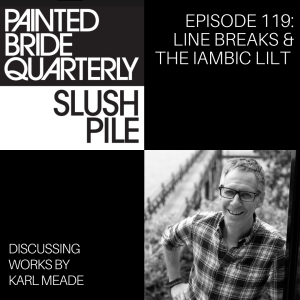
Tuesday Sep 19, 2023
Episode 119: Line Breaks & The Iambic Lilt
Tuesday Sep 19, 2023
Tuesday Sep 19, 2023
When to break a line, Slushies. And why? What’s the shape your poem takes, and how does the poem’s form serve its complexities, subtleties, and heart? Three poems by Karl Meade are up for consideration in this episode of The Slush Pile, and they call the editors into conversation about trauma in literature, narrative (in)coherence as craft, and the pleasurable risks of stair-stepped stanzas. Poet L.J. Sysko joins the conversation on this episode of The Slush Pile as we discuss “Beach Fall,” “Christmas Break,” and “Doom Eager.” (If a tree falls in the woods, Slushies. Ammiright?)
At the table: Kathleen Volk Miller, Marion Wrenn, L. J. Sysko, Jason Schneiderman, Samantha Neugebauer, Alex J. Tunney
Karl Meade’s work been published in many literary magazines, a few of which he didn’t even donate heavily to, or previously serve as editor—including Literary Review of Canada, Tusculum Review, Arc Poetry Magazine, Grain Magazine, Chronogram, Umbrella Factory Magazine, Contemporary Verse 2, Event Magazine, The Fiddlehead, Open Letter, Under the Sun, and Dandelion. His work has also been mistakenly longlisted for four CBC Literary Prizes, shortlisted for The Malahat Review’s Open Season Creative Nonfiction Award, and Arc Poetry Magazine’s Poem of the Year. His novel, Odd Jobs, written as a solemn literary manifesto, was a finalist for the Foreword Reviews Book of the Year for Humor, and an iTunes Top 20 Arts and Literature podcast—“Laugh Out Loud,” one listener said of this grave work.
Karl’s chapbook “Doom Eager” has just been released in September 2023 by Raven Chapbooks, just in time for us to publish this podcast, which has waited longer than it should for release!
Author website: www.karlmeade.com
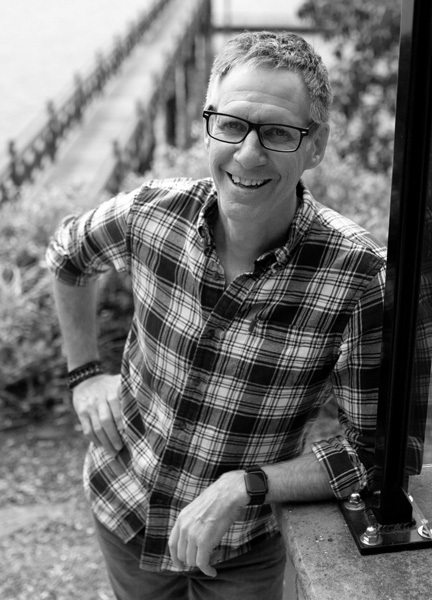
Guest Editor: L.J. Sysko
L.J. Sysko's work has been published in Voicemail Poems, The Pinch, Ploughshares, Rattle, Best New Poets, and elsewhere. She is the author of a poetry chapbook, BATTLEDORE (Finishing Line Press, New Women's Voices series). Poetry honors include several Dorothy Sargent Rosenberg awards, two fellowships from Delaware's Division of the Arts, and poetry finalist recognition from The Fourth River, The Pinch, and Soundings East. Sysko holds an MFA in poetry from New England College.
X: @lj_sysko
Instagram: @lesliesysko
Facebook: @lesliesysko
Author website: http://www.ljsysko.com

beach fall
for Holli and Terry
Mountain to stone, prairie to sand, redwood to ash,
from here I can see the heart of the sea, but not the beach
he fell on. I can see the picture
window you sit in—waiting, watching the shore, iPad in lap, short-haired
Flossy at your side, the one who dug your dad’s
water bottle from under him. I don’t know why
you brought his suitcase to his wake
empty—what it was between you. Only he knew the words
you could not say. The doctors’ words for you—non-verbal, spectral—sent him
back to rage. He said they weren’t worth the hair
on a dead chicken, that aut-ism was just too much self for them to take
from you. He knew what his raging
love could do: four hours a night on the couch, talking
through your iPad. He called himself Manitoban, the prairie farm-boy
who watched his dog run away for three days, the rain-man
to lead you out, teach you how to mouth the O, the awe
in Holli. Yes, from here I can see the redwoods
fall, the mountains decay, his sea-bed—
they say all the big hearts of the earth
love where they fall, that his heart stopped
before he hit the beach. But we both know
why his mouth was full of sand.
Christmas break
for Doug and Arlene
The earth heaves, the ice cleaves. Erosion
cuts the heart from every stone, while every night
I watch you drive your family past a starving glacier, turn
from a truck laden with salt. You head off
the head on, take the bumper to the heart, leave
your family straining your lungs’ last
words from the floor of the minivan.
I’m on the floor beneath my desk, straining
to plug in the phone that I will blame for years: why
did I plug it in? Every night
I watch the driver’s stoned eyes, petrified as your broken
daughters in the back. Every night
I piece you all back together: brake, I say, turn
over and over while the glacier leaves
its terminal moraine. I gather the stones,
offer them to the moon, last witness
to your last turn. I turn
to your wife, try to face her head on
with what the earth knows:
core to crust, mouth to lung
the rupture comes, the rupture
stays. Every Christmas
she wakes to the words
brake, turn.
doom eager*
because one of us
took a spike to the lung
a minivan to the chest
hit the beach with his heart
to say nothing of the one
whose only breath was broken water
because I believe
the hand, the wound, the moon
is how I show you where I fell
through the hole I thought I was
diving for pearls through the green
fuse of ice in my dream of you
because I run naked
through the forest on a moonless night
with a penlight in the hand that broke
my mother’s heart waning at the seed
of light the moon won’t show me
because its dark side calls all of us
because I believe
I’ll find your heart in the east
your marrow in the moon
fever just before the sun rises
I’ll swim for it all day forgetting
how the earth turns east south west
circling all night forgetting
there is no moon
in the new moon
because the only way out
is my hand on your chest
I walk the shore all night
dream back the back of the moon
because the only cure
for the wound
is the wound
*after Ibsen, Graham, Moore: an Icelandic term for the isolation, restlessness, caughtness an artist experiences when sick with an idea

Wednesday Aug 23, 2023
Episode 118: Making Words New
Wednesday Aug 23, 2023
Wednesday Aug 23, 2023
A wonderful sense of wordplay permeates the poems we were able to discuss from Barbara Diehl. Sadly, one of three poems we’d flagged for the podcast was snapped up before our discussion was recorded, and we talk a bit at the start of this episode about our process and timelines. Barbara’s work gave us space to consider how word choices, sequencing, and combining can lead to new experiences in a poem, as well as a debate over the roles of joy and darkness in poetry, including the balance we seek as readers in the world we find ourselves living in these days.
This episode is brought to you by our sponsor Wilbur Records, who kindly introduced us to the artist is A.M.Mills whose song “Spaghetti with Loretta” now opens our show.
At the table: Kathleen Volk Miller, Jason Schneiderman, Samantha Neugebauer and Dagne Forrest.
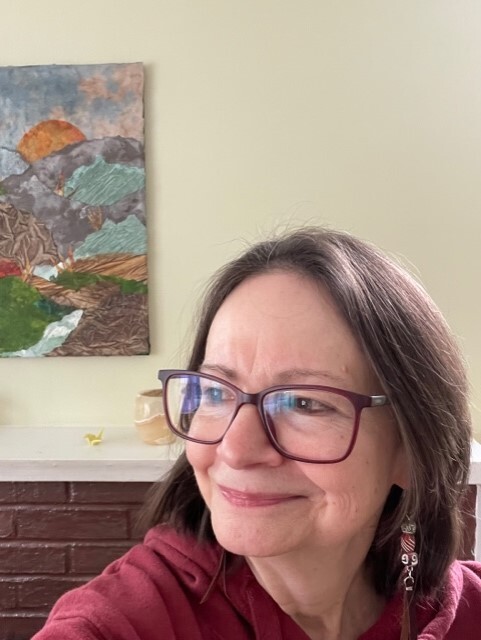
Barbara Westwood Diehl is senior editor of The Baltimore Review. Her fiction and poetry appear in a variety of journals, including Quiddity, Potomac Review (Best of the 50), SmokeLong Quarterly, Gargoyle, Superstition Review, Thrush Poetry Journal, Atticus Review, The MacGuffin, The Shore, The Journal of Compressed Creative Arts, Raleigh Review, Ponder, Fractured Lit, South Florida Poetry Journal, Five South, Allium, The Inflectionist Review, Switch, Split Rock Review, and Free State Review.
Socials: Twitter @BarbaraWestwood, Facebook @ barbara.w.diehl.3, Poets & Writers listing
December Goodnight
it’s sunfall, and the papersky is grayed
with erasures of bestlaid plans
all the daymistakes
forgiven
the brokenpencil points of planes
thumbsmudged away
their grumblechatter
hushed
the blackening windows
shuttered
*
so sleep in the nightsee
in the skylisten
so dream a planetdance
breathe a metronome
so keep time to a ticktock moon
to evening’s pocketwatch
its face a dozing chaperone
so humfade, so eyes closed
nothing to shudderfret
allsafe

Wednesday Aug 09, 2023
Episode 27: Suicides and Skeleton Jazz (REISSUE)
Wednesday Aug 09, 2023
Wednesday Aug 09, 2023
In the midst of excitedly preparing for AWP 2017, we record this episode in which we discuss two poems by Rita Banerjee, “The Suicide Rag” and “Georgia Brown”
This week’s discussion both took us back and made sure that none of us would see the world the same way again. With images of breakdancing, gospel choir, and the not-so-innocent Georgia Brown, we were in it. Whether we’re distinguishing jazz from jazz or figuring out what a clapper is, this episode is filled with risky moves.
Join us in the campaign to have your local library carry lesser-known authors and small presses. Let us know what books you’ll be requesting with #getsomebooks! Let’s support libraries, small presses, and the authors who write for them.
Make sure you follow us on Twitter, Facebook, and let us know what you think of this episode with #longandskinny! Stay tuned to hear about our AWP 2017 experience–we hope to see you there!
And of course, most importantly, read on!
At the table: Kathleen Volk Miller, Marion Wrenn, Jason Schneiderman, Tim Fitts, and Sara Aykit
Rita Banerjee is the author of Echo in Four Beats, CREDO: An Anthology of Manifestos and Sourcebook for Creative Writing, the novella “A Night with Kali” in Approaching Footsteps, and Cracklers at Night. She received her doctorate in Comparative Literature from Harvard and her MFA from the University of Washington, and her work appears in Hunger Mountain, PANK, Tupelo Quarterly, Isele Magazine, Nat. Brut., Poets & Writers, Academy of American Poets, Los Angeles Review of Books, Vermont Public Radio, and elsewhere. She is the co-writer of Burning Down the Louvre, a forthcoming documentary film about race, intimacy, and tribalism in the United States and in France, and serves as Senior Editor of the South Asian Avant-Garde and Creative Director of the Cambridge Writers’ Workshop. She received a 2021-2022 Creation Grant from the Vermont Arts Council for her new memoir and manifesto on female cool, and one of the opening chapters of this memoir, “Birth of Cool” was a Notable Essay in the 2020 Best American Essays. She is an Assistant Professor of Creative Writing and Director of the MFA Program for Writers at Warren Wilson College.
The Suicide Rag
Billy played ragtime
on the church
organ but we
lunch hour kids,
kept time by another
name. Behind St. Augustine’s
we learned to hit
the pavement, sound
like an anvil
crack
hammers hitting
steel, Billy playing
skeletons
on the fifth,
we arpeggioed
haloed, froze
on the black
top. Learning
to cakewalk
This was our
battle—
tar-mat babies
doing handsprung
suicides
for the girls
standing ’round
with knife-like eyes
That’s all
we needed—
a rolling
beat, a firing squad
and schoolyard
skirts
scouring the lot
as we fell
face forward
hands locked
& stiff, the only
thing
that could’ve
come between
us was a kiss.
Georgia Brown
Harlem had yet to be born,
the globe had not been spun,
but we knew how to whistle,
how to call clappers and skirts on cue:
That summer, we first met Georgia,
she was an echo in four beats,
we learned to hum her story.
Mike played her with a licked reed
but she was all brass, sharp
like an abandoned railroad cutting through
wild wood, and when she took stage,
she made those trombone boys whisper,
“Sweet Georgia, Sweet.”

Monday Jul 24, 2023
Episode 19: The Dinosaur-Robot Episode (REISSUE)
Monday Jul 24, 2023
Monday Jul 24, 2023
July 2023 Update: Sarah is preparing to appear at the New York City Poetry Festival at the end of July. Sarah will read a poem and be interviewed as part of an appearance with the monthly poetry show "There's a Lot to Unpack Here". Sarah also has a new book of poetry, “The Familiar”, coming out from Texas Review Press in Spring 2024.
Welcome to Episode 19 of Slush Pile! For this episode, we have two “creepy” poems submitted for our Monsters Issue by Sarah Kain Gutowski.
Listen to the outcome, but one thing is for sure: these poems are stronger together.
Comment on our Facebook event page or on Twitter with #frogtongue and sign for our email list if you’re in the area, and even if you’re not! Read on!
At the table: Kathleen Volk Miller, Lauren Patterson, Tim Fitts, Caitlin McLaughlin, Jason Schneiderman, and Marion Wrenn

Sarah Kain Gutowski is the author of two books, The Familiar (forthcoming) and Fabulous Beast: Poems, winner of the 14th annual National Indies Excellence Award for Poetry. With interdisciplinary artist Meredith Starr, she is co-creator of Every Second Feels Like Theft, a conversation in cyanotypes and poetry, and It's All Too Much, a limited edition audio project. Her poems have appeared in The Gettysburg Review, The Threepenny Review, Painted Bride Quarterly, and The Southern Review, and her criticism has been published by Colorado Review, Calyx: A Journal of Art and Literature by Women, and the New York Journal of Books.
Chapter VI: The Children Have a Request
The season stretched itself thin, weakened by storms and heat.
Inside the damp, shadowy space of the children’s fort,
the woman with the frog tongue wove baskets and bowls
with tight, interlocked laces, while her silk stitches
began to fray and lengthen. The gap between her lips
widened to where the children could see the white of her teeth.
They stared at her, sometimes; she saw them clench their jaws
and try to speak to each other without moving their mouths.
Before long they’d begin to laugh, and she’d shake with relief at the sound.
Then one day, when the trees broke into glittering shards
of gold and red and green, and light spun pinwheels above
their heads as they walked together between the falling leaves,
the girl looked at the woman and asked if she had a name.
At this, the woman jerked to a stop. The old surge,
the impulse to speak that rose within her belly and chest,
overwhelmed. She wanted the girl and boy to know her name.
Her tongue, rolled tightly and barred from moving inside its cage,
strained against her teeth and cheeks, contorting her face with its rage.
The boy stepped back when he saw the change on the woman’s face.
The girl moved closer, though, to pat the hand she held
like she might a frightened kitten or skittish, fallen bird.
Let’s guess your name, she said. The woman’s jaw fell slack,
as much as the stitches allowed. Her panic passed away.
The boy saw her relax and began to hop around.
A game, a game, he chanted. Across her eyes the sun
sliced its blade, and though her vision bled with its light,
she felt cheered by the girl’s hand and the boy’s excitement.
Aurora. Jezebel. Serafina, guessed the girl.
Her brother laughed and grabbed a fallen branch, whacking
the moss-covered roots of the trees surrounding them.
The woman laughed, too, short bursts of air through her nose.
Her happiness shocked them all. The boy laughed again,
a raucous sound, and she looked the little girl in the eye.
A curve tested her mouth’s seams, more grimace than grin,
but the girl smiled back and sighed with some relief. Then she reached
toward the woman and pulled her close, until they were cheek to cheek.
The girl’s face, cold and smooth, smelled of the moss and earth
her brother lashed and whipped with vigor into the air.
The woman with the frog tongue hugged the girl loosely,
as if those little shoulder blades were planes of cloud,
a shifting mist she could see and feel between her arms
but couldn’t collect, or hold, or keep for her very own.
The girl stepped back yet kept her hands by the woman’s face.
Her small, thin fingers hovered before the fraying threads.
Why don’t you take these out? she asked, as she touched each ragged end.
At this the boy stopped his joyful assault of the trees
and ran to see for himself what they discussed each night
when walking home: her muffled, choked murmurings,
the gray lattice unraveling across her mouth.
He peered closely at each loose stitch, searching beyond
her lips for whatever monster she’d locked so poorly inside.
He found no monster, just a hint of pink tongue.
So he shrugged, said Yes, and spun on his heel to resume his game.
The girl jumped up and down, shouting: And then you’ll tell us your name!
The woman watched the boy whip tree roots free of moss,
the tufts spinning into the air and separating,
becoming dust, the dark green spores like beaks of birds
that plummet toward the rocky earth without fear.
She watched the girl’s hair lift and fly away from her head,
the wind dividing its strands, the way it hung, suspended
like dust in the sun, then sank like spores: a sudden drop.
She worked her mouth from side to side, and by degrees
opened her lips enough to burble a sound that said: Maybe.
Chapter VII: She Grows a Second Heart
That night she woke to find another oddity:
during sleep her heart had split or twinned itself,
and where one muscle pumped before, now beat two.
Her blood coursed through her veins twice as fast as before,
and over those paths her skin buzzed and stammered, like wire
strung tautly between two poles and charged with load.
As if she’d run for miles across rolling hills,
as if inside her chest two fists beat time all day,
beneath the bone she sped at death in the most alive way.
The day crawled while her two hearts raced. Above the fire
she set a series of clocks to ticking. She watched the flames,
sometimes leaning close enough to feel the heat
singe her stitches a deeper shade, their fibers scorching
until they curled, like dark froth spilling from her mouth.
But when her hearts began to flicker more, and faster
than she could stand, she turned her eyes to the clocks’ marked faces
and drew comfort from the second hands’ neurotic twitch.
Every minute witnessed meant another minute lived.
Beneath her breastbone her strange second heart pulsed harder.
She sensed the muscle, like her tongue, would leap and fly
away from her body if her body let it go.
She took the silver-handled knife and incised a cross
above the cavity where her hearts ballooned together,
jostling for room and dominance. The flaps of skin,
pale as egg shell, trembled slightly. A head appeared.
A bird with obsidian eyes emerged wet with her blood,
shook to shed its burden, and leapt toward the rafters above.
She watched the bird and felt air seep into the space
it left behind, her single heart unrivaled but lonely
in its great room. The wound bled slowly, healing fast
to a pale silver scar, flaps falling back to close
neatly over the bone, which laid itself again
like lines of track or scaffolding across her chest.
The bird flew to the window’s sill, and ticked its head
to look back at the woman. A slight breeze, cool and calm,
caressed its dark wings, and it leapt for the steady branch of that arm.

Wednesday Jul 19, 2023
PBQ Summer Teaser Episode
Wednesday Jul 19, 2023
Wednesday Jul 19, 2023
In this short trailer, we tease the next three poets to be featured on the Slushpile: C. Fausto Cabrera, Barbara Westwood Diehl, and Jodi Balas. We are so excited to be featuring poetry from these three very diverse writers. Have a quick listen for a taste of each poetic voice! (And remember – we pull our featured poets and writers from our submissions slushpile – polish up your work and submit it to Painted Bride Quarterly, knowing we might choose to feature it here!)
This episode is brought to you by our sponsor Wilbur Records, who kindly introduced us to the artist is A.M.Mills whose song “Spaghetti with Loretta” now opens our show.
At the table: Kathleen Volk Miller and Dagne Forrest

Wednesday Jun 07, 2023
Episode 117: This Episode Smells Delicious
Wednesday Jun 07, 2023
Wednesday Jun 07, 2023
What were you wearing in the ‘90s, Slushies? Sleeveless flannel and crochet? Paco Rabanne? We’re beguiled by Emily Pulfer-Terino’s poems on this episode as we discuss how she slides us back to the ‘90s. She has us sniffing magazine perfume inserts and marveling at the properly cranky voice she invokes for an epigraph, borrowed from Vogue’s letters to the editor. What were we thinking wearing all those shreds? Only the girls on those glossy pages know for sure. For more context, check out Karina Longworth’s excellent podcast, You Must Remember This, and her recent deep dive into the bonkers eroticism of the 1990s. Plus, Sentimental Garbage’s episode on Dirty Dancing featuring Curtis Sittenfeld.
For a great collection of poems that draws its title from grunge-era jargon (kinda, sorta, wink, wink), we recommend a book we love by our pal Daniel Nester: Harsh Realm: My 1990s.
This episode is brought to you by our sponsor Wilbur Records, who kindly introduced us to the artist is A.M.Mills whose song “Spaghetti with Loretta” now opens our show.
At the table: Jason Schneiderman, Marion Wrenn, Kathleen Volk Miller, Samantha Neugebauer, and Dagne Forrest

Emily Pulfer-Terino is a poet and writer whose work has appeared in Tupelo Quarterly, Hunger Mountain, The Collagist, The Southeast Review, Poetry Northwest, Stone Canoe, The Louisville Review, Juked, and other journals and anthologies. Her poetry chapbook, Stays the Heart, is published by Finishing Line Press. She has been a Tennessee Williams Poetry Scholar at the Sewanee Writers’ Conference and has been granted a fellowship for creative nonfiction at the Vermont Studio Center. She holds an MFA in creative writing from Syracuse University, and she lives in Western Massachusetts.
Author website: http://emilypulferterino.com/
Instagram: @epulferterino
Grunge & Glory
“You’re kidding. Tell me you’re kidding. At least I’ll know where to find my new wardrobe this year...in the nearest dumpster…talk about the Emperor’s New Clothes. Tsk, tsk.”—(Letter to the Editor)[1]
What’s more glorious than a girl in a field,
curled in the whorl of a deer bed, alfalfa
haloing her dreams of fashion magazines
while she plies matted hay, untatting her world?
Bales score the landscape, parceling
endlessness, parsing this solo tableau,
while her heroes wrench their music
into being in Seattle, gray, time zones away.
What’s grunge if not her dense crochet
of castoff couture curated from dumpsters
and worn with a frisson of pride and shame:
flowering nightgown, old ski boots, sweater
turned lace in places by moths and age?
And this field like where models pose
in Vogue, each page itself a piece of land
and an ethos framed inside a storyboard.
Scala Naturae
Like prying pods of milkweed
so those astral seeds effuse—
unseaming magazine ads for perfume.
Anointing my wrists with scented glue,
running each over the edge of a page,
testing scents I aspired to buy
and classifying my olfactory taxonomy.
Grass evoked the world I’d known
with hints of rain and magnolia
slight as fog above an unmown field.
DNA’s rosemary, oakmoss, and mint,
ancient and clear as purpose; glass
spiraled bottle signifying sentience
and enduring iteration. Both
ethereal and hyperreal, Destiny
offered apricots, orchids, and roses--
bottle opaque as an eyelid,
veil of petals sheer as promise.
Samsara was amber, sandalwood,
ylang ylang, peach. Syllabically lulling,
its s and a extending, repeating, suggesting
endlessness. Cycle of birth and death
rebranded as serenity in ongoingness.
Angel’s burst of praline and patchouli
lit the crystal facets of that star,
making heaven of my pulse and ordinary air.
[1] Wynne Bittlinger, letter to the editor in Vogue US, February 1993

Wednesday May 24, 2023
Episode 116: Finding Flow
Wednesday May 24, 2023
Wednesday May 24, 2023
Finding flow in modern life is increasingly challenging, Slushies, but we sure found it here in two poems by Erica Wright. Loosely defined as the melting of action and consciousness into a single state, flow in poetry allows us to fully inhabit the world or experience conjured up by the poet. Nothing serves to distract or pull the reader out of the poem. How do we get there? There isn’t just one way. It helps when the poem’s form is attuned to the pacing required by the subject matter or focus. Strong beginnings always help -- and there are two fantastic ones here -- as well as a system of imagery that’s both relatable and unexpected. In “Marine Biology”, we see a conversational style used in parts of the poem that’s deeply grounding, and in “Too Many Animal Stories” the poem’s form supports its dense mosaic of images and moments.
This episode is brought to you by our sponsor Wilbur Records, who kindly introduced us to the artist is A.M.Mills whose song “Spaghetti with Loretta” now opens our show.
At the table: Kathleen Volk Miller, Jason Schneiderman, and Dagne Forrest.
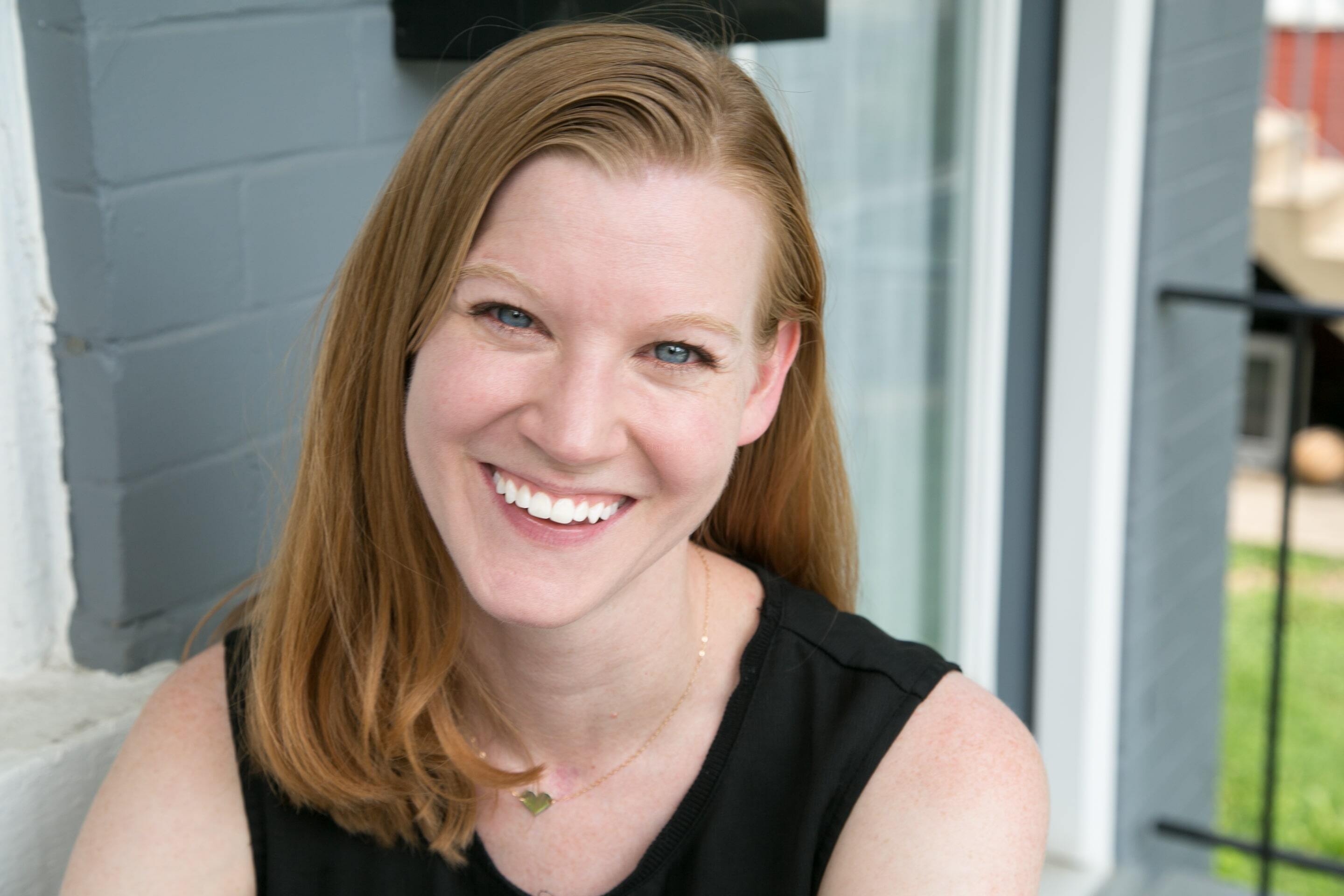
Erica Wright's latest poetry collection is All the Bayou Stories End with Drowned (Black Lawrence Press). She lives in Knoxville, Tennessee with her family where she enjoys looking at the mountains and not camping in them.
Socials: Twitter @eawright, Instagram @ericawrightwrites, Facebook @ericawrightauthor, Author website
Marine Biology
Not even my dog knows me, hovers
outside the bathroom as I wash blood
from the porcelain, wipe up the floors.
I feel more at ease with the mess
than the pain. We’re not supposed to
talk about that anyway, my fleet
of would-be mothers who never labored
but birthed something too.
Mine half-seahorse, half-anemone
like something you’d find in an off-season
coastal gift shop after looking for whales
and not finding any whales.
And now my skin turns blue
as if my veins are submarines
surfacing after too long underwater.
Did you know the Navy studies sharks
in hopes of making better ships?
Can you imagine? Mariners on megalodons.
Let’s name them after our ancestors.
Let’s hold the notion of them
inside our heads until they’re real.
Too Many Animal Stories
In the same town where a man’s gun discharged,
killing a woman across the street, we ordered
sandwiches and watched tourists rent inner tubes
to hold their bodies up in the river below.
I’ve been sick for weeks now, bad sick
at first, and now I can hold myself up.
You started grinding your teeth at night,
and it hurts to move your jaw in the morning.
We joke about low points. We joke
about how we’ll never leave this house again.
Of all the days to miss, I can’t say why
I latched onto that one in Helen, Georgia.
We find a movie about the Trans Am Bike Race,
and I make a joke about my dad’s old car
with a phoenix on the hood, its wings
spread with such precision that they never spilled
over the sides. Sometimes a snake hid underneath
and was so long it could stretch its body
from one side of the two-lane road to the other—
tail in one ditch, head in the other—
a perversion of that joke about the chicken.
The thing about being sick while the world has stopped
is that I start to wonder if it’s all a carousel game,
and we’re being punished for trying to jump off.
When I push myself off the bathroom floor again,
the tiles won’t stop spinning. Asbestos.
I remember the real estate agent warned
us about asbestos and not to take them out ourselves.
I like the bathroom. The porcelain tub feels like ice
when I rest my head against the side, wait for stillness.
You take out the trash for us because of the rats.
I don’t mind them, but once when one ran
across my foot, I couldn’t get clean enough after.
The neighbors coo over our new dog,
leave chicken bones for her, which we pry from her teeth.
Sometimes the incisors scrape my skin, and she never
apologizes for her nature. I apologize for mine
all the time. I’d prefer to be hearty, the kind of traveler
who could take a cross-country train alone
and sleep sitting up, living on trail mix and Coke.
Not the one who needs sea bands. They sound like
the bracelets of some strong-willed mermaid
who doesn’t care what anybody thinks of her,
but they’re cheap elastic with plastic eyes.
Outside my window, the wind harasses the trees
and their new leaves, which are less impressive
than the old ones. Last year, a grim lived there,
and I’d make up stories for him before bed.
Not that he slept. Not that I know of.
There once was a hellhound who loathed
the predator rigamarole. He disliked
the rending of flesh and gnawing of bones.
The howling he could take or leave.
One day sheep wandered below him.
They smelled of honeysuckle and dirt.
They didn’t bite each other then pretend
they were joking. He sewed his costume right away.
There’s not much more I can say about the rat
from earlier. He fell from a trash bag
and leapt at me, tiny claws digging into my shoe.
A medium-sized rat. They say they’re more
afraid of us than we are of dying.

Wednesday May 10, 2023
Episode 115: We’re Obsessed
Wednesday May 10, 2023
Wednesday May 10, 2023
For a really fresh take on obsession, take a look here Slushies! Lisa Gordon’s short story is a masterclass in taking a popular form and quietly exploding it (pun intended). By turns deeply human, comical, sad, and just a little bit “out there”, Gordon’s story sweeps alongside a protagonist whose undying love for civilian astronaut Christa McAuliffe drives a story with the hallmarks of space exploration. NASA’s obsessive attention to detail, understanding of real world factors, and commitment to thinking outside the box are shared by Gordon, who tells a surprising and rewarding story. You might want to jump down the page and read or listen to it in full first, as there are spoilers in our discussion!
Listen to the story Paul on Earth in its entirety (separate from podcast reading)
And in the spirit of confession that permeates this story, our team is confessing their obsessions:
- Kathleen Volk Miller – podcasts and keeping her wine racks full (purely for aesthetic reasons!)
- Jason Schneiderman – the original Doctor Who series (1963-1989), keeping it old school!
- Marion Wrenn – onion dip (very hard to find in Abu Dhabi, so it’s her go-to when she’s Stateside!)
- Samantha Neugebauer – old tin boxes
- Dagne Forrest – space exploration and marzipan
You might want to read these related links:
Christa McAuliffe and the 1986 Challenger explosion
The Week in Longing, Dagne Forrest on Rust+ Moth (a recent poem by one of our editors that references the Challenger explosion and the late 2022 recovery of a piece of the shuttle off the Florida coast)
This episode is brought to you by our sponsor Wilbur Records, who kindly introduced us to the artist is A.M.Mills whose song “Spaghetti with Loretta” now opens our show.
At the table: Kathleen Volk Miller, Jason Schneiderman, Marion Wrenn, Dagne Forrest, and Samantha Neugebauer, as well as technical team Ta’Liyah Thomas, Anthony Luong, and Sebastian Remetta
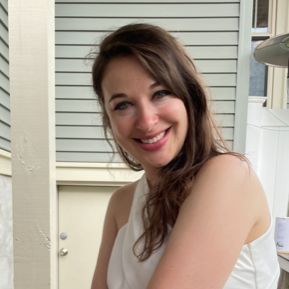
Lisa Gordon's short fiction has been published in Paper Darts, ANMLY, Hypertext, Storychord and elsewhere. She lives in the Boston area and is working on two novels.
Paul on Earth
Paul had a hard time concentrating on the wedding. Maybeth had tears in her eyes, but then again, she cried at everything. The rabbi was saying words about how important trust is when it comes to love. Maybeth took his hands. She had nice, soft, small hands—Paul always liked that about her. She could do a lot with those hands: not least of which, much earlier in the morning, even though they weren’t supposed to see each other until the wedding (Maybeth had wanted it that way) he knocked on the door of her hotel room. Tap tap, tap tap, tap tap, so she would know it was him. He needed her, he said. He needed her to touch him. And she did. And he’d felt better, but only for a moment.
He still couldn’t get Christa out of his mind.
He still looked her up. Often. All the time, you might say. It had been years since 1986, but still—she was a household name. Christa McAuliffe. The whole thing had affected everyone, especially school children. It was one of Ronald Reagan’s most celebrated speeches, and he’d been a former movie star! Not that most people remember that. Now, there’s a show about it on Netflix. He still hadn’t watched it. He couldn’t bring himself to do it.
She was still alive inside him like a constellation, burning layers through his skin. And now he was getting married, again, to another very, very nice lady. She knew everything, and she forgave him. He was getting a chance to start over.
“Paul, Maybeth, do you take one another?” the rabbi said.
“I do,” Maybeth said, squeezing his hands.
“Yes,” Paul said. “I mean, I do. Yes.”
Little lines crinkled adoringly around Maybeth’s eyes. Her eyes were the color of limestone.
“Then it is my honor. To announce. You as husband and wife, to one another.”
The guests roared as ceremoniously as a small crowd can, gathering to their feet, a wave of low thundering applause ebbed and flowed as they kissed. Paul knew next to none of them, but luckily, Maybeth had many friends. She was liked by many people, unlike Paul. It was one of the things Paul told her when they first met: I won’t bring much to your life. I’ve tried to change but—
She had interrupted him. “That’s for me to decide.”
Maybeth’s lips were slick with lipstick and he worried, for a moment, he’d look like a clown. But he could feel her smiling through her mouth, through her kissing, and she kissed him with abandon, and he let her. He loved her. He really wanted to love her.
* * *
Paul was 15 when Christa McAuliffe was his teacher, and he fell for her like a rocket burning through the universe. (It was a cheap analogy, he knew that. It was cliché, obvious. But it was how he felt.) She was so pretty—! Just so, so pretty. All the school boys seemed to like the girls with big hips and big hair and pink mouths, always open. It was the early 80s, after all.
But not Paul. It was Mrs. McAuliffe, with her brown eyes wide as planets, her tall teeth, her curly hair, she was—well, she was a lot of things, but mostly, she was the mother figure he’d needed at the same time his sexuality was burgeoning, so she represented the classic oedipal complex, except a little inverted, for Paul. At least, that’s what he was told in therapy, later in life. It seemed true enough. He accepted it. But he couldn’t change his behavior.
His behavior didn’t take hold until after the explosion. She wasn’t even his teacher then—she’d moved on to another school, and Paul was floundering without her presence to steady him. To give him something to look forward to. But it was after that when his obsession really bloomed. He was devastated for her two children. Of her husband, he was fiercely jealous—jealous that he got to be the husband, even after she’d died. Jealous that he could mourn, really mourn. He called their house often, back then. He’s not proud of it, but he did it. He got to know the sounds of all of their voices: the little girl’s, the young boy’s, the husband’s. Lots of people were calling then, obviously. It wasn’t too invasive. But they did change their phone number, later. Unlisted, of course. Paul was saddened. Deeply.
Back then—then being, before the internet—there was only so much he could do. Newspapers stopped reporting. He kept copies of some of the ones he could find, the issue of People Magazine with her face on it, and the like. He kept them in a notebook. He went to college. He went to class. He tried to connect his obsession with the idea that maybe he was obsessed with space—! Yes, that had to be it! He majored in astronomy, but he just couldn’t take to it. It was too mathematical. Too science-oriented. Christa had been his English teacher. It was escapism, he preferred. He graduated with a degree in Literature and asked Sandy to marry him. It was what you were supposed to do. She expected it, but she was happy, very happy. They lived in a little apartment in Boston for a few years, while she finished her Masters’ degree at BU. He took a teaching job in a small town called Concord, west of Boston, in—what else? English. It was not lost on him that Concord—albeit, New Hampshire—was where Christa was from. And he’d learned that she’d lived for some time in Framingham, Massachusetts. It was not far from Concord, not far at all. He spent his days driving around strange neighborhoods, aimlessly, wandering, or in the parking lot of the high school she’d attended, which was still there. He told Sandy he’d started a chess club for his students. He’d never played chess in his life, but she believed him.
That was all for a long, long time. He was happy enough. He enjoyed teaching, though he feared he wasn’t very good at it. When he closed his eyes, he could still see Christa’s back, the way her arm would raise to the chalkboard, how her writing made a pleasant sound. Tap tap, tap tap. He’d developed some decent cooking skills, and Sandy baked, and they ate well. They made love occasionally, and then frequently, because Sandy wanted badly to have children. Paul was thankful that they were inexperienced lovers—they’d only really had each other—and didn’t know that he didn’t touch her the way a man does when he loves a woman. When he’s in love with her. But after a year or so, the test results came back with bad news: she wouldn’t be able to bear children. And she stopped turning to him in bed. And Paul found that he was pleased. It allowed space in his mind for the obsession to grow. And grow, grow it did. It was like a whole other place in his mind he could turn to, retreat into: he could go into different parts of Christa’s body and inhabit them, and they were in love in a way that didn’t exist on Earth—it was unique to them, and them only, and it was everything; it was his world.
Years passed. Years upon years. Until finally, one day, he was arrested. A little girl in the town of Framingham, Mass. had been abducted. She’d been missing for three days and discovered later, in the conservation land lining the towns’ perimeter, murdered, sexually abused. Such an awful, tragic thing. Paul had been seen too often in her neighborhood, and others nearby, idling around in his brown Pontiac, a stranger. His likeness matched the description of the abductor: tall, glasses, a non-descript male. He was taken to the station and questioned for hours.
He was bewildered. Truly and simply bewildered. He wouldn’t have known where to begin, is what he said.
“Where to begin with what?” the detective had said.
“With stealing a child,” Paul had whispered. “With touching a child.” He clasped and unclasped his hands.
Yes, he’d been around the neighborhood. Often, on and off, for years. No, he had no business there, knew no one, not a soul who lived there. No, he had no alibi—he had, indeed, been driving around that very night. He’d been lying to his wife for so long he’d begun to believe there was a chess club. The only way out was the truth.
“McAuliffe,” they’d said. “The teacher astronaut lady? The one who got blown up?” The detective. A lawyer. Repeated it, as if they hadn’t heard him right. Couldn’t have possibly heard him right.
“Yes,” Paul said. “That’s the one.” He told them about the file he kept in the magazine in the downstairs bathroom. They sent a squad to get it, and his wife followed behind, hysterical. The questioning was relentless. He was shoved in a cell for 14 hours. Eventually, they found the right man. He’d committed a similar crime in Western Mass., in the Berkshires. They opened the door to his cell and he was free to go. But they recommended he get therapy.
“We think you’re a little nutso,” one of the policeman said, on his way out. Behind him, echos of laughter. He started his car—it sputtered and died. It was a freezing, gray day in November. Sandy wouldn’t pick him up. He tried to hitch, but no one would stop for a man who looked like the man who abducted children. Eventually, he called a cab. It cost him $143 to get home, and, not having that kind of money on him, the cabbie had to drive him to a bank. He watched the cabbie eying him in the rearview mirror as he peeled away.
Sandy left, which didn’t surprise Paul in the slightest. What did surprise Paul was how little he cared. Somehow, they didn’t fire him. He’d thought they would have, but they didn’t. (“You didn’t commit the crime, Paul,” the principal said, disapprovingly. As if he’d wanted him to have been the criminal.)
His time was his own, finally. He couldn’t drive around the way he used to, which left a void in his life he wasn’t sure how he’d fill. But it turned out, it wasn’t as hard as he thought. He grocery shopped and cooked elaborate meals, gaining weight, filling out in places he didn’t think could grow. He masturbated on the couch as he pleased. He read different books and grew excited by new lesson plans. He even became energized by teaching in new ways. His life, it seemed, was changing. Christa was there—she would always be there—but he needed her less and less.
But then, as if out of nowhere, the internet became faster and stronger and more ubiquitous, and suddenly, the world was at his fingertips—anything he wanted could be his, information of any kind—and, well. Life took on new meaning. He bought a printer. He printed everything. He posted the photos, the articles, up around his house, a shrine. He was scared of himself. His teaching suffered. He stopped eating. He was fired. He’d hit rock bottom. And then, one day—it really was like that, just one day—he saw an advertisement for Addicts Anonymous. Whatever you’re addicted to, we can help, is what it said.
Paul went. He didn’t know what his life had become and he didn’t want to give up, not yet. He was 40 years old. His father had died long ago. Sandy had moved to Virginia, adopted a daughter, gotten a dog. He drove to the meeting, concentrating on the way the cold winter air felt in his lungs. And at the meeting, he met Maybeth. She was addicted to painkillers. She was a tiny, cute thing. Sprightly. Energetic. “But I have a dark side,” she said, when she spoke to the room. She’d been watching Paul carefully. He could feel it, even when he turned away. After the session, she approached him. “I’m looking for a new boyfriend,” she said. “Addictions don’t bother me.”
“Even mine?” Paul had said.
“Even yours,” she had said.
He’d addressed the room—all 27 of them (he’d counted) and he’d said, “Hi, I’m Paul. And I don’t know why. Or maybe I do. But—and sorry if this freaks anyone out—I’m addicted to Christa McAuliffe.”
There’d been chatter, a couple of laughs. Some of them looked at him quizzically. He heard someone whisper to someone else “Challenger”. And he’d felt very much like crying. It was the first time he’d felt like crying in—well, maybe ever. Since he could remember. And it felt like being opened, like a present.
When he told that to Maybeth, she cried. “I’m your present,” she’d said. “And you’re mine.” She smiled into his neck and curled up in his lap like a little dog. Paul held her. Never had his arms been so full. He closed his eyes and tunneled through space, slowly at first, just exploring, until he was rocketing through her again, ready to find what he was looking for.

Monday Apr 24, 2023
Episode 114: The Swirl
Monday Apr 24, 2023
Monday Apr 24, 2023
We are enswirled in this episode, Slushies, enswirled! We discuss three poems by John Sibley Willliams, two of which are ghazals. Williams’ poems are the gravitational force around which our conversation about craft, form, fluidity, identity, and the flux and spaciousness found inside poetry spirals. Williams’ poems draw the swirl of our attention not only to the choices he makes on the page but to Agha Shahad Ali’s rules for real ghazals, Williams’ poetic conversation with Tarfia Faizullah, and his nod to Kavek Akbar’s “Gloves”. There is a pun these show notes want to make about guzzling ghazals, Slushies, but we are trying hard to resist it…
At the table: Marion Wrenn, Jason Schneiderman, Kathleen Volk Miller, Dagne Forrest, Samantha Neugebauer
This episode is brought to you by one of our sponsors, Wilbur Records, who kindly introduced us to the artist A.M.Mills, whose song “Spaghetti with Loretta” now opens our show.

John Sibley Williams is the author of nine poetry collections, most recently Scale Model of a Country at Dawn (Cider Press Review Poetry Award) and The Drowning House (Elixir Press Poetry Award). He serves as editor of The Inflectionist Review, Poetry Editor at Kelson Books, and founder of the Caesura Poetry Workshop series. He lives in Portland, Oregon with his partner, twin biracial six-year-olds (one of whom is beautifully transgender), a boisterous Boston Terrier, and a basement full of horror movie memorabilia.
Author website, Facebook @ john.sibleywilliams
Ghazal for Transparency / for Reflection
My ghosts breathe accusingly—a winter mass, a mirror’s impermanent
erasure—again shaving I’m sorry from the face over my face in the glass.
It’s not just the birds—their abridged flight, the stains the sky wears today
through this washable window—but my children’s tiny hands absolving the glass.
Of guilt? Of shame? Is it his blood raging generations through my veins or this white-
washed silence compelling me to pull our history, face-by-face, from its frames of glass?
All this uneaten grain filling silo after silo—always at dusk, in my mind—swarmed now
with mealworms & mites & someone else’s hunger. How it cuts the tongue like shards of glass.
& those goddamned honeycombs, failing again. How our neighbor’s unable to keep his bees
close enough to cultivate. Our house too is a small box of dust & wing & against the glass
separating us from the world curtains blur our reflections like rain. Like stars cutting through
cloud, a sustainable song. May my girls never be dead enough to fear themselves in our glass.
Ghazal Beginning & Ending with Lines from Tarfia Faizullah
Let me break free from these lace-frail microscopic bodies.
My breath (always shared); trace it back to unmasked foreign bodies.
Taking that last winter deep into her lungs. Breathe, I remind her.
& remember me a child, Mom, not this unrecognizable foreign body.
The sky’s aperture widens. Sight ≠ witness. The organ’s rusty song catches
in the rafters (unascended). & all this rain leaking down on us like foreign bodies.
Grey fox. White cells. Families fleeing one home for (hopes of) another.
Some borders, perhaps, are meant to be trespassed by unforeign bodies.
Row after perfect row = harvest. Harvest ≠ everyone is fed. Sated. Breaking
up from the earth beneath, star thistle & bindweed. To us, foreign bodies.
The day an autumn orphan, & we’re yanking roots. My daughter’s tiny
misgendered fingers in mine, (pulling. Together), no body is foreign.
Field of Anchors
— for Kaveh Akbar
Darkness on both sides.
& wild grasses. Sun-hurt.
Browning. So as not to drift.
Too far from shore. A man.
Palms the tiny church inside.
The warm casing. Inside a god.
Prays to another god. For more.
Of himself. More devotion.
One more detonation. Of roses.
Less blood next time. Less field.
Without end. Or is it more.
That’s required to make a mirror.
Of each window. All that untilled light.
All that goddamn reflection.
The old maple out back. No longer.
A noose swinging from it. Lifts its arms.
In praise of its leaves. Fallen & otherwise.
Only a god. My grandmother promised.
Can beat the trees. Of its birds. Can lullaby.
The field into paradise. Only fear can.
Halleluiah the anchors from their green.
Deerless. Wolf-filled. Moorings. Or is it.
Love. When I open the front gate. Rusting.
Still. Despite drought. Despite me. I hear.
My children playing with. The blood inside.
The roses. Inside the bullet. An impossible anchor.
A darkness. That gives a people. Its name.

Monday Apr 10, 2023
Episode 113: The Call of the Wild
Monday Apr 10, 2023
Monday Apr 10, 2023
Are you ready to get primal, Slushies? We look at poems of birth and mothering that call on the senses as they shift between what’s animal and what’s human in us. Kathy celebrates the pure, messy pleasure of a classic tomato sandwich and Jason reminds us why an irregular opening line can be the hook a poem needs, while we all marvel at a poem’s ability to dazzle us with changing perspectives, locations, and personas. Oh, and strong titles get some much deserved love too.
This episode is brought to you by our sponsor Wilbur Records, who kindly introduced us to the artist is A.M.Mills whose song “Spaghetti with Loretta” now opens our show.
At the table: Kathleen Volk Miller, Jason Schneiderman, Samantha Neugebauer, and Dagne Forrest
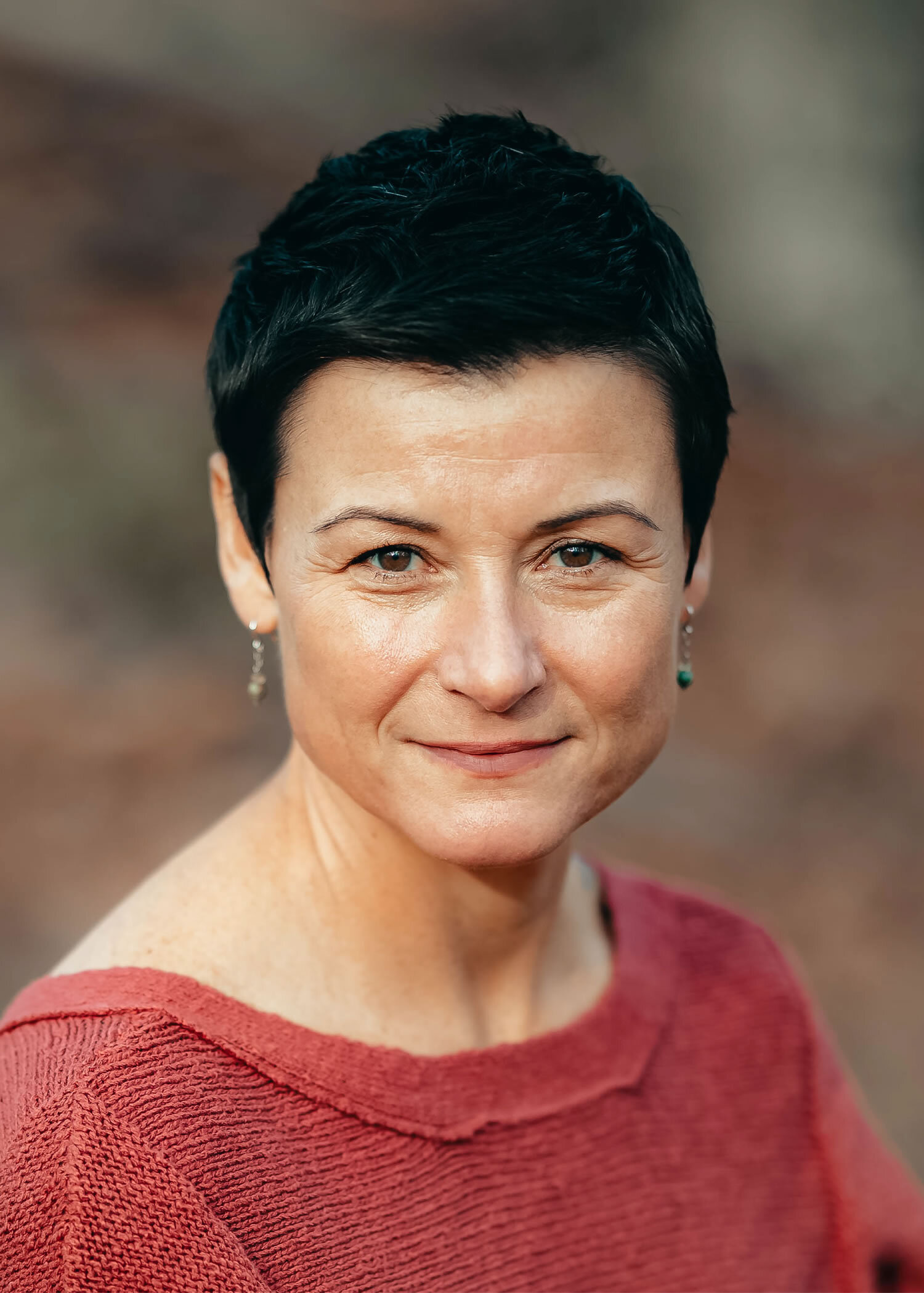
Sarah Elkins lives in southern West Virginia where she is rounding the final curve of a four-year term as a councilperson in the City of Lewisburg, population 3,700ish. She is also chair of the Parks Commission (Yes, you should be thinking Leslie Knope). Sarah and her husband Max run Hammer Cycles, a bicycle shop in White Sulphur Springs, WV. She and Max founded and coach the Greenbrier Valley Hellbenders Youth Mountain Bike Team and work tirelessly on trail advocacy and mountain bike initiatives throughout the region. Sarah’s son, Tad, is a high school freshman and loves hearing poems about his birth and progression through puberty. Oh, yeah, Sarah writes poetry. That’s what she loves to do most. Therefore, she fills her time with all the aforementioned stuff to remain at an appropriate level of disequilibrium from which the poetry springs.
Website: SarahElkins.com
Birthing
The summer before my son was born, I ate tomato sandwiches
with mayonnaise, salt and pepper.
The rain was so heavy in June, the fruit
swelled on the vines and their skins ripped.
I took big bites holding thick bread with two hands,
pink rainwater running down both forearms
to my elbows—everything reduced, then,
to hunger. At night, curled on my side
in the un-airconditioned dark
I dreamt of big cats’ razor tongues
dragging the length of my back,
saber teeth at my throat, not tearing
the skin but feeling for pulse,
their muscled hips coaxing me
into the sweaty delirium of my final weeks.
The cats returned every night until
twenty-six hours before I howled him into being,
I opened. All the rain of June, and July
leaving me for the hardwood floor
where I crouched on all fours looking
for flecks of vernix, tasting my wet fingers,
sniffing the sweet water for signs it was time.
The cats slunk away until now, eating
this tomato sandwich, my first in twelve years—
I recall I was a panther once.
From the Tall Grass
I floss at night after steak and butter.
My house: unguarded range, bison huffing,
ice-faced, hooves stamping an echo stutter.
I do nothing in this boundless nothing.
No thought, no synapse firing. Still hands still
stained—berry juice of an empty morning.
This room-less space, a translucent thin will
through which I, good sow, whiff my boy’s homing.
His trek complete, except for the recount—
bighorn sheep, bull moose, near miss, eagle plume.
I toss one sleek mink to the catamount.
The grass lies down; walls rise around my room.
Ursa fades. A house cat lurks in willow.
I sip gin, smooth the pelt of my pillows.
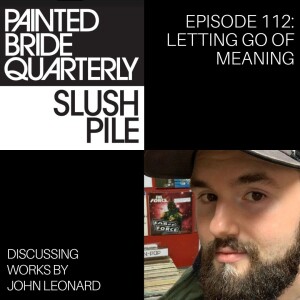
Tuesday Mar 28, 2023
Episode 112: Letting Go of Meaning
Tuesday Mar 28, 2023
Tuesday Mar 28, 2023
Can you lean into experience without always needing meaning, Slushies? The psalm is a Christian form similar to a song or poem where meaning is often elusive unless the reader is prepared to put in the work. Sometimes, though, things just are, and we certainly encounter that here in some very satisfying ways. We talk about the importance of the pause or caesura in poetry, proofreading, and powerful image systems. We also just enjoy the experience of reading two gorgeously rendered poems full of both the specific and the mysterious.
Links to things we discuss that you may dig:
Poetry Foundation: Caesura definition
Flannery O’Connor’s The Violent Bear It Away
Robert Hayden’s Those Winter Sundays
This episode is brought to you by our sponsor Wilbur Records, who kindly introduced us to the artist is A.M.Mills whose song “Spaghetti with Loretta” now opens our show.
At the table: Marion Wrenn, Kathleen Volk Miller, Samantha Neugebauer, and Dagne Forrest
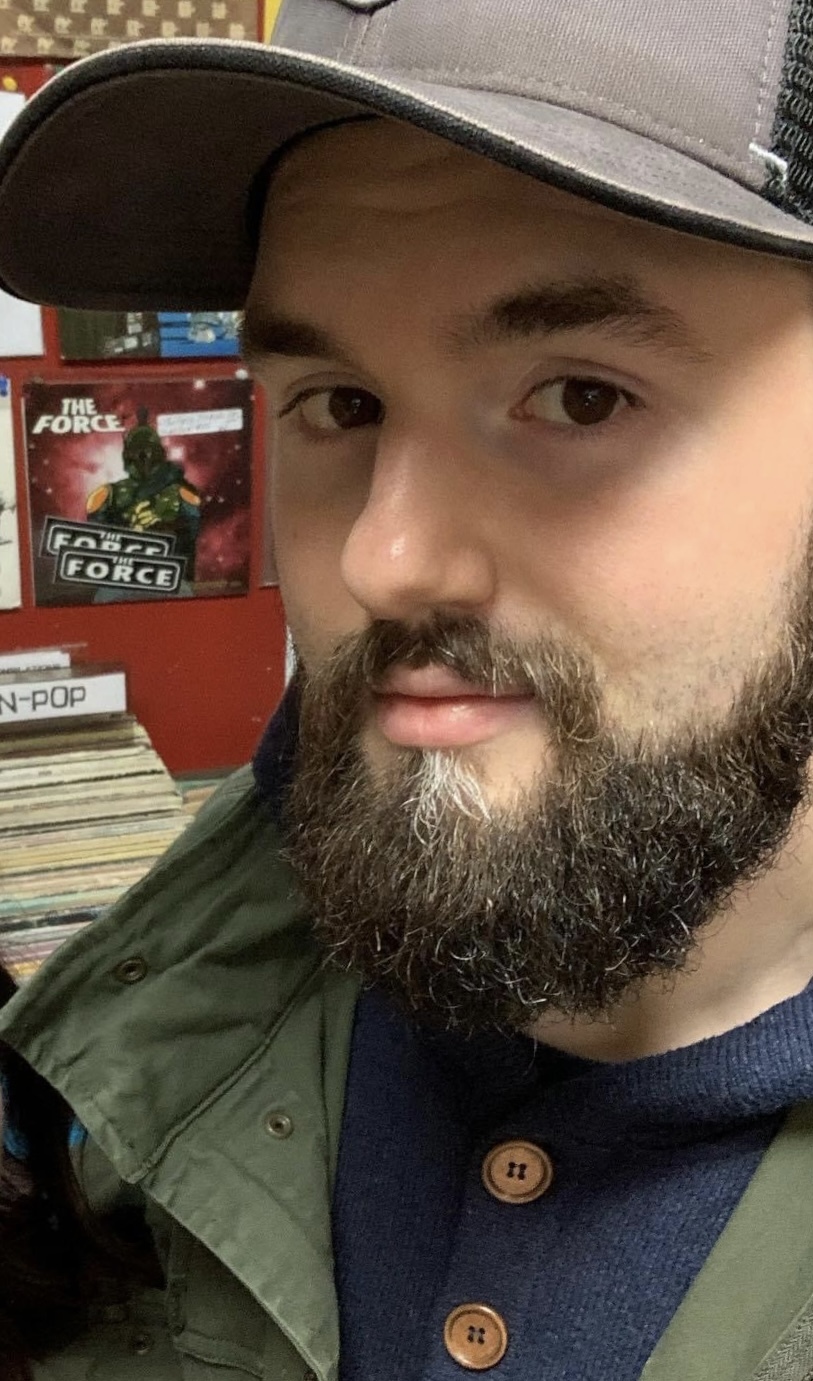
John T. Leonard is a writer, educator, and poetry editor for Twyckenham Notes and The Glacier. He holds an M.A. in English from Indiana University. His previous works have appeared in Chiron Review, December Magazine, North Dakota Review, Ethel Zine, Louisiana Literature, Jelly Bucket, Mud Season Review, Nimrod International Journal, The Indianapolis Review, Genre: Urban Arts, and Trailer Park Quarterly among others. He lives in Elkhart, Indiana with his wife, three cats, and two dogs.
Socials: Twitter @jotyleon and @TwyckenhamNotes
Psalm
Prone to wonder. Lord, I feel it.
Nomad, no man, no son, father, sun.
I am bright, rusted, and wretched.
You turned the doorknob right,
hot shower and cold bathroom tile.
I was wrapped in that small, soaked rug.
A place that filled the garden of our souls,
superior and sewn, stones dancing across a lake.
Look how Christian a puddle of vomit can be.
You held me, let me breathe into your arm.
You forked my tongue and sewed a map to
North Dakota with that black medical lace.
For Hell’s sake, I am holy, holy, calm, and true.
Be escaped. Be fallen, black, and blue.
My call to evaporate, pulled upwards to
the real adventure. Wide awake now,
bruised vanity, summer of head colds
and bodies washed up on the pebbled shore.
If I took it back, my sunglassed future glance,
my walk of muses, my pacing lonely apartments,
spitting on each and every brick. If I took it back,
but not what I’ve suddenly become: a contrail
of promises, sci-fi crimes, Saturn in the traffic.
I’m chasing altars to the daylight of you.
Feels like I feel it, prone to rip the husk of your lips.
Still, the rusted son of red starlight, gospel music
touching lovers in the limo behind the hearse.
I am lime, let moonlight citrus me further.
Then Sunday will come and sweep it all away,
back into the rose quartz river of a psalm.
Fledgling
Waking up to the white bone of dawn;
memory of light, half-life of darkness,
a daily prophecy of frozen floorboards.
This cold, fading silence of Sunday morning,
falling like the ash of a thirty-year volcanic winter.
The way all of our merit would vanish, if we gave up
a moment of the day to plunge back into our dreams.
Light, now imagined as radiant cloud or burning crown.
The slow trudge outside, curse and prayer of woodpile.
Eastern red cedar still asleep: erasure of termites,
black snake of phone line limp with snow, sick fledgling
whose eyes didn’t close, not even once throughout the night;
who waited out the insectile buzz of street lamps, waited
for one final glimpse of flame. Moments now, moments,
and the flick of my lighter will catch its eye. The soft glow
of cherry, the ritual of my ignorance, the weeks of feeling
watched—so full of myself that I thought it must be God.
By dusk, one of us dead and the other, none the wiser.

Monday Mar 20, 2023
Episode 111: What Lingers
Monday Mar 20, 2023
Monday Mar 20, 2023
There’s a lot packed into this episode, Slushies, including sibilance and balancing gravity with a light touch. Differing perspectives and the resonance of history, both real and mythical, cascade through a trio of poems by Danielle Roberts. Jason worries that his erudition has collapsed momentarily, Kathy loves the rush of wanting to immediately re-read a poem, and Samantha reminds us of an Anne Carson line: “Aristotle says that metaphor causes the mind to experience itself in the act of making a mistake.” Oh, and Marion brings to life the idea of hearing a baby’s cries in the ceiling when she recounts living in the apartment below a family with newborn triplets!
Links to things we discuss that you may dig:
Jeanann Verlee’s Helen Considers Leaving Troy
George Eliot’s Middlemarch
Anne Carson’s Essay on What I Think About Most
Elizabeth Bishop’s Collected Letters
Jason Schneiderman’s How the Sonnet Turns: From a Fold to a Helix, APR Volume 49, Issue 3
British Antarctic Survey: Ice cores and climate change
Smartless Podcast (Jason Bateman, Sean Hayes, Will Arnett)
This episode is brought to you by our sponsor Wilbur Records, who kindly introduced us to the artist is A.M.Mills whose song “Spaghetti with Loretta” now opens our show.
At the table: Kathleen Volk Miller, Marion Wrenn, Samantha Neugebauer, and Jason Schneiderman

Danielle Roberts is a queer poet from California. Her work has appeared or is forthcoming in Atlanta Review, DMQ Review, Okay Donkey, Prairie Schooner, Reed Magazine & others. When not writing poetry, she can be found drinking too much tea & pestering the nearest cat. Read more of her at sonnetscribbler.com.
Socials: Instagram: @sonnetscribbler
How can I leave this behind?
after Jeanann Verlee’s Helen Considers Leaving Troy
after a floral gin cocktail
Do I want to live and die my whole life here—
buried in county lines—or is it time
to stretch the map? There’s more
to plan than simply running away.
while holding my niece
Picking up the baby doesn’t help:
I smell her hair & wonder if she thinks
of me when I’m out of sight. Will she know?
Her eyes stare into the distance
along with mine. Maybe she travels
in her dreams. Maybe she lives
elsewhere.
while eating dinner
Gorging myself on routine, I chew bread & think
about the bagels in New York. I live these sour-
dough rituals—oven baked in centuries
of families. A young tradition bound by water
on all sides. They say it’s in the water.
Doubtful, I gnaw on my nails.
when people ask if I’ll have kids
Come on, Karen—I just blew up
my life & you’re asking if I’m ready
to be a sacred vessel? The only answer
I can give is to flee far away
from anyone who had dreams
for me or thought I could be
marriage material. Go where
all folks care about is which street
I live above in the gridlocked graph
or whether I’m walking fast enough. Blend.
It would be easier than questions of barreness.
when my ex wants to get back together
Absolutely not.
from the freeway exit
Behind the wheel of my car, I carve trenches
again—circle and retrace my path—map
the small universe on foot, pace my cage.
Maybe I take to the night sky
or simply head east until I hit water.
Gorges and grooves heal, scarred
cutting board life. Do I keep driving?
Where do I even go from here?
These dreams that weren’t mine
festering in my wake. What city takes
such hazardous rot? How do I leave
my family behind? How
do I tell them I’m already gone?
Extracting memories[1]
Speak to me in layered tongues of bitten snow, slow
molars carved with frost collected in the valleys between your teeth. The scientist bores a core—
plucks the long memory from each glacier—this meter holds your first bicycle ride, this
a bridal veil of volcanic ash from Pompeii, six cylinders of centuries trespass
the sterile air—blink at the unforgiving sun. From the dentist chair, you look
up at the light and this persistent body shrinks—cracked with age
and use. Our indestructible jaws crumble with heat, losing
enameled eons to inaction, forgetting to stitch our gums
with floss. It’s far too late to mend our habits
now: best to preserve what we can. Each
line, a thought pulled out of context—
precious archive of time before tales.
We transcribe the answers to
our final test without
any chance of
knowing the
questions.
Reassurance
1—
My cat startles & I tell her nothing
bad is happening, but
we both know that’s a lie
on a large enough scale.
She hears the neighbors’ doors
slam, the child in the ceiling crying
like an injured mouse. She knows footfalls
on the landing lead to the uninvited
lead to us coaxing her to accept
strangers in her home. She knows
the rush of sirens down Oak or shouts
from the narrow park must mean something
in the same way we all know
that one thing always leads
to another.
She turns a pale eye towards me as if to say
just because it’s not happening to me
doesn’t mean it’s not happening.
2—
As we wade into the cold mountain
lake, my sister promises me
nothing’s going to touch your feet—maybe
some grass or a fish, but I’ve never seen anything bad
here. She shifts the baby to her other hip & walks
deeper. Her husband rows away from the widening rings
of sunscreen filming the top of the swampy water, oil slick
of caution. I know she loves me.
Later, I scramble onto the inflatable raft & hold
the baby & my breath. My sister stays rooted
in the water—extracting the implanted
leeches from between my toes—doesn’t
glance down at her own feet. Not even once.
Her husband saw the signposts on the shore & told
no one. He thought they didn’t apply anymore:
he’s never noticed anything in the waters.
3—
My boss sends a message before an important meeting
to ask if I can still lead in light of the news. I reassure him
yes, I’m in California—I’m not affected for now.
In the crowded room,
the men make small talk,
but have nothing to say.
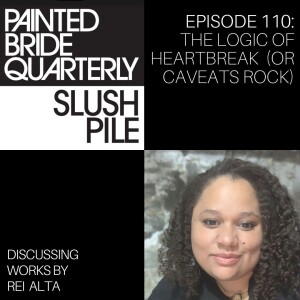
Sunday Feb 12, 2023
Episode 110: The Logic of Heartbreak (or Caveats Rock)
Sunday Feb 12, 2023
Sunday Feb 12, 2023
Slushies, get ready for some trailblazing poems in the form of mathematical proofs, theorems, and other types of mathematical reasoning that level their gaze at heartbreak. One poem even embeds a second poem as a footnote. Alex reminds us all of the hermit crab essay/poem format, prompting Sam to recall Maggie Nelson’s Bluets, in which the end of a powerful love is likened to the experience of shedding yet still living with an abandoned skin or shell. Come along for a ride with some poetic work that’s furious and logical in equal measure!
Links to things we discuss that you may dig:
Joe Wenderoth’s Letters to Wendy’s
Samantha Hunt’s The Seas
Maggie Nelson’s Bluets
This episode is brought to you by our sponsor Wilbur Records, who kindly introduced us to the artist is A.M.Mills whose song “Spaghetti with Loretta” now opens our show.
At the table: Kathleen Volk Miller, Marion Wrenn, Samantha Neugebauer, Alex J Tunney, and Dagne Forrest

Rei Alta is a black writer, disciple of science, artist, and proud supernerd. She resides in Massachusetts where she was born and raised. Rei spends most of her time supporting brilliant young people from historically marginalized communities in their exploration of science and engineering.
Socials: Instagram: @reialtaspeak
Inflection Point 1b
Theorem 1.1. The pain, longing, and ambivalence I feel related to this particular past lover (hereafter “him”, “he” or “you”) is not unhealthy.
Proof: By definition, “Time heals all wounds.” Suppose for all purposes, 11 years is considered to be ‘Time’. It is true that 11 years have passed, however I am not healed. Thus, this thing I feel is not really a wound.
Theorem 1.2. There exists a value in this lover that I use to cope with a deficiency in my current state of being.
Proof: By Theorem 1.1, this lover does not represent some larger, unresolved issue. It is true, however, that I still have been unable to let him go. Therefore, he must be notable for a different reason. By supposition, that different reason is that he and I had an unrivaled connection. I.e. While there is no such thing as soulmates, our cognitive compatibility was substantially higher than that of my previously observed matches. Hence, I feel an intensity through recollecting him such that most other things pale in comparison. Therefore, I remember him in order to feel something when I don’t.
Theorem 2.1. There exists an absolute truth about why I loved him and why I haven't been able to let go.
Proof: By definition, “All things happen for a reason.” Since it is true that loving him and being unable to let go has happened, there must be a reason that caused it. This reason must be the truth. Suppose not; i.e., suppose this reason was not the truth. Then it would not have possessed the power necessary to cause such a consequential thing to happen. Such a consequential thing did happen. Thus, there is an attributable reason that is the truth.
Theorem 2.2. I must understand why I have not been able to let go—in order to let go.
Proof: By my own definition, I am a finder of truth. By Theorem 2.1, there is a truth to be found. If there is a truth I have not yet found, then I must find it in order to exist since finding truth defines me. Thus, I have no path forward but to find the truth.
____________________________________________________________________________
CAVEAT: Due to the following factors, the validity of the proofs outlined above is questionable:
- Invalid underlying assumptions
- Faulty reasoning
- Insufficient information
As a result, extrapolation based on the conclusions laid out in the preceding section is not advised.
Read the rest of this entry »

Monday Jan 30, 2023
Episode 109: The Gigue is Up
Monday Jan 30, 2023
Monday Jan 30, 2023
If your story had a sound, Slushies. What would it be? A rush, a zuzz, a sizzle? David Landon’s “Bach, Onomatopoeia, and the Wreck” triggers a discussion of stories and sounds, and poems that resist narrative closure. Shane Chergosky’s “Headwind” takes us down a different path. Erasures, Slushies. Ammi right? Listen to us puzzle over the way erasures “make it new” and simultaneously obliterate and conjure the from which they’re made. Special note: Jason reads the erasure twice. First as a robot, then as a human. We love both versions-- of the poem, and Jason. And if you are hungry for more: take this and this and this.
At the table: Marion Wrenn, Alex Tunney, Kathleen Volk Miller, Jason Schneiderman, Samantha Neugebauer, Larissa Morgano
This episode is brought to you by one of our sponsors, Wilbur Records, who kindly introduced us to the artist A.M.Mills, whose song “Spaghetti with Loretta” now opens our show.

David is never quite sure whether he is an actor who writes poetry or a poet who acts. And perhaps he can be forgiven his obsession with iambic pentameter: he has done a lifetime of Shakespeare, as an actor (New York, Nashville, and Alabama Festivals), director, and coach. His poetry—all iambic pentameter—has been published in Able Muse (Write Prize, winner), Georgia Review (Williams Prize, featured finalist), Southwest Review (Marr Prize, runner-up), the Dark House, Think Journal, and elsewhere. Officially, he is the Bishop Frank A. Juhan Professor of Theatre Emeritus at Sewanee, the University of the South.
Bach, Onomatopoeia, and the Wreck
For all we knew, it was a random chunk
of interstellar rock, the rear-end crash
that brought us to a halt. Dinner was out,
of course, and the Bach too, I realized,
feeling it in my neck, and standing there
in the rain, examining my totaled car,
the guilty driver soaked, in tears. The cops
were nice enough, did what they had to do
efficiently. The wrecker did show up,
eventually, and we began to cope.
And since it’s now collision story time,
the word I’m hearing in my head is ‘thud’.
There’s ‘clunk’, of course, or ‘jolt’, ‘wham-bang’, or ‘thwack’.
‘Thwack’ has that sudden, can’t-be-happening feel,
as in, “I was just sitting, reading Kant,
when suddenly, inside my head, I felt
this ‘thwack’, and everything went blank.” But no!
The word that truly bongs the knell is ‘thud’,
essence—onomatopoetically—
of impact, ‘thud’, from dice, to hand-grenade,
to asteroid. We need the stupid ‘d’
of ‘doo-doo’, ‘dodo’, ’dude’, or ‘dud’, or ‘dead’.
‘You’re-done-for-d’ is what we’re up against;
you never know when out of nowhere, ‘thud’!
But on the other hand, there’s Bach: the Bach
we missed, the works for cello solo. Bach:
initial ‘b’, a kind of plosive bump,
terminal ‘ch’, a bit of friction in
the throat, but in between the ‘b’ and ‘ch’,
the ‘ah’, release: sustained and open, ‘ah’.
Think of the bow colliding with the string,
a subtle thud, a scrape, and out floats Bach,
genial Bach-analia of dark
and light, a theory of the universe
as music: bang, and then the sarabande,
the minuet, the allemande, the gigue.

Shane Chergosky was born in Minnesota where he was raised on stuffed cabbage and heavy metal. His work has appeared in Pithead Chapel, HASH Journal, Juke Joint, and is forthcoming in Adirondack Review. He holds an MFA from George Mason University and lives in Washington, D.C.
Headwind
? When I think about the story she told me
about that I don’t even wanna hurt the guy. I don’t
know if I could meet that person and act normal.
I remember I did that when I was about 20,21.
I didn’t go into CVS with Xunaxi to
What a bastard I was . And
//
ith what courses I take.Luckily I can only take two (!!!). Maybe a lit course
and…an elective? It’d be SO cool to do screen-
writing. Finally would have a chance to write that
SciFi…I ordered “The Art of Syntax” after Phebe
brought it over. I honestly get so self-conscious talking
with her about sentence-level stuff. She’s so smart and
her recall is so good (regardless of what she says re: her
//
I want to sleep in a crappy hotel and make
jokes hold her after we kill a pint of ice cream.
something feels right about her, about the way I feel
around her. I want her attention. I want her to
pay attention to me. She does! but I don’t know it’s
different when you’re with what I have a
hard time with imagining her with her ex, though they’re
//
I feel like fragments could be a part of
my work/thesis. It’d be cool to take a finished
poem of mine, print copies, and do some Christian
Hawkey-type process with it/them. The 19th and 20th
days had that feel to them because I tore a bit
from the top of the page, forcing me to write around
the tear. Now, if I had a finished poem, and shot
it with a gun, or let an animal chew on I, or
let a human chew on it even, the parts that survive
//arrative time no time
feeling of the trout throat closing odd breathing
but accepting that I have limits I deserve to feel
OK, to take a break I’m OK I’m doing everything
//
I’m afraid of telling her how strong my feelings are
I think it wise to simply show her and not ask about
sex for a few more months.
She said we’re dating and that makes me feel
secure.
//
Canal
a cane smoothed
orchard
backlogged
beggar concrete
daisy a conquest
//
not together I guess I’m having a hard time NOT
imagining them together. How could he treat her
that way? I mean no relationship is a cakewalk
but like how could someone tell a woman they’ve
been with for over a year that they’d rather
keep driving and make it (home?) on time than
stop for a tampon, to let the woman you supposedly
love (did he even tell her?) that you’d rather her sit
in her own blood, in discomfort and shame than
do everything in your power to relieve her? to actually
act? to perform an act of humanity? of care?
concern
//
subcultural history. I feel like (and I’m probs
stating the obvious) thagt the niches of already niche
are erased by the dominant cultural narrative/
the narrative(s) that are hoisted up by capitalist/
supremacist ideals and/or organizations. I can’t
write organization without thinking about grant writing
//
I can, I’m doing a lot. Teaching is a lot. I’m
going to apply for the fellowship. It’s not that I
don’t want to teach, I just want time to
focus on my work. I keep feeling its really getting
somewhere. A chapbook at the least and a
publishable one too! I want it. This semester is
just wearing
//
Where only a portion of the whole survives. Then,
I could make the other parts appear elsewhere?
Maybe it’s too on the nose but I’ve been thinking
about the fragmented texts of the Anglo-Saxons
(and probs other traditions) in association
with incomplete narratives
//
raging satin page paginate vagina labia vulva
intestinal contested protest regress transgress
shake Shakespeare a knight made of feathers
stuffed w/ feathers feathers on the doorstep
rich lumber in heaps full pools of yellow
beer getting warm in the kitchen
the glow of the microwave the suran wrap
melting on the still-cold lasagna, the color
of waiting. Not even a color. Page page again
wait know confound botch rip slap chirp
girder serve elastic teeth cold
//
I’m so glad I’m not that way. Maybe I
am and don’t know it until it happens?
Maybe thinking about
Phebe’s ex reminds me
of that, that’s why it
makes me so disgusted
and maybe it’s good
that I’m disgusted
//
to do. But you live and learn. I
want to love again and make it right, or do it
effectively, the way that makes us both feel whole or
more whole/full than empty. I will get an A in
grant writing. I will succeed. I know I’ll get an
extension and be able to make the internship
//
I want to
make love to her real bad she d r ive s me crazy.
She’s sensual , and erotic, and really
It was a terrible, immature thing
//
Intelligent ran runaways kept barking on. A sub miss ion
hold putting entire cities into head
-shirt void a void you can buy a void that becomes
armor, a subculture, an agreed upon set of
val u es in t elligent lights through a crispy gauze
of hair swollen blue halo widening behind them
like a wedding band. Overblown evening leather
charms hanging on the door handle, on the bedpost.
Literally thieves war paint corpse paint
a mouth like a root system spreading, fragmenting
branching diverging at both ends a worry
squirrely ratchet odor smolder controller
recover withdraw sheath hearth bust bent
bruised lashed fixate lack lax creation Bonneville
cruiser a loose ruining
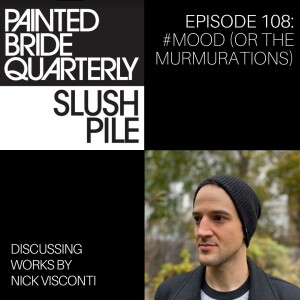
Tuesday Dec 13, 2022
Episode 108: #Mood (or the Murmurations)
Tuesday Dec 13, 2022
Tuesday Dec 13, 2022
How much meaning do you need, Slushies? When language lingers, when images form a spiral, a murmuration, might a poem’s mood hold meaning close to its heart and simultaneously at bay? And, also, how do you pronounce ‘ichor’? All this and more in a rollicking conversation about poet Nick Visconti’s new work, “Burial” and “Unmake These Things.” And speaking of things, listen for Samantha on Anne Carson’s zen koan dollop of insight from Red Doc>: “To live past the end of your myth is a perilous thing.” Or for Kathy and Marion confessing their North Carolina ritual groping of the Dale Earnhardt statue in Kannapolis, NC. And finally: geese. Nick Visconti’s poem triggered a reverie-- that time when we accidentally stumbled into the annual Snow Geese migration in Eastern Pennsylvania.
At the table: Dagne Forrest, Kathleen Volk Miller, Alex Tunney, Samantha Neugebauer, Marion Wrenn.
This episode is brought to you by our sponsor Wilbur Records, who kindly introduced us to the artist is A.M.Mills whose song “Spaghetti with Loretta” now opens our show.
Nick Visconti is a writer living with an artist and a cat in Brooklyn. He plays softball on Sundays.
Burial
It is love,
not grief, which inters
the deceased
in a hill made of clay.
Sod embraces
crossed arms, legs, eyes shut
looking forever
at nothing
beneath our feet—a container
for men unmade,
no boat to speak of.
No oars
darkly dipped
in water as we pictured
it would be. Instead,
a single shred of light
piercing every lens
it catches. Instead,
a pathway none cross,
just follow through
and up
and up—the cusp of ending,
nothing at all like the end.
He isn’t in this yard when
his children roam. Still,
they dig,
they expect to find him:
braided leather, steel-wound aglets,
his black opal intact.
Unmake these things
The sand before me like water, fluid and holy
under the cratered crown nearly
half-awake, circling
as I draw the one way I know—stick
figures in a backdrop scenery, thick-
headed and content, wheeling
psalms of birds, wide-sloping M’s
grouped in permanent murmur. I don’t bother
with the sun’s face, bare in the upper
left corner of the page. I’ve made
a habit out of hoarding ornaments,
given them their own orbit like the russet
ichor dashed with cinnamon
I choke down every morning and afternoon.
The city’s puncture-prone underbite nips
the sky, consuming the bodies
above—thunderheads, billboards
notched, alive in the glow of that always-
diurnal square. There’s been talk lately of
irreversible chemistry, an acceptable stand-in
for cure among believers and experts
in and on the subject of Zoloft-sponsored
serotonin. A first weaning is possible.
Do not bother with a second.


Thursday Sep 22, 2022
Episode 104: Accents and Human Remains
Thursday Sep 22, 2022
Thursday Sep 22, 2022
We have a special treat, Slushies!! In today's episode, you’ll get a duet from Nancy T and Rachael Philipps. Starting with the accents of Long Island, T’s poem makes Alex think of Nassau and Suffolk County while Marion recalls Billy Joel's music. The language also leaves the crew thinking about Tracey J Smith’s, “Solstice.” The tables turn when the crew reads, Philipp’s “After you left us,” going from jargon about the sounds of the world to the description of human remains. With cremation on the rise, the crew ponders the process being described in this not-so-sentimental poem.
Alex mentioned that he is able to do a full SNL Skit, which one do you think it is?
This episode is brought to you by one of our sponsors, Wilbur Records, who kindly introduced us to the artist A.M.Mills, whose song “Spaghetti with Loretta” now opens our show.
Nancy T is a high school teacher, poet, artist from NY, currently living down south.
Rachael Philipps is a poet, journalist, and a properly misanthropic Welsh woman with an
unhealthy dependency on caffeine and marmalade. She is constantly chastened by her iPhone’s audio settings for playing LCD Soundsystem too loud whilst out on her regular jogs around the mean streets of Westchester. Rachael’s poem “Perfect Little Houseguests” was published by Swwim Every Day in August 2022, she was awarded a Bethany Arts Poetry Residency in 2021 and was the recipient of an AWP Writer to Writer mentorship for poetry in 2020. Her journalism spans broadcasting for the BBC plus writing and editorial work for print titles including Time Out London, The New York Times and Food and Wine magazine. She is currently at work on her first chapbook.
Nancy T
Long Island Sound
The chop on the sound
nearly drowns the clubbing
you deal bluefish on deck.
Red slicks beneath one bold bastard
flipping you silvered
curses, straining for water
or flesh, some end. Then wind
surprises, cracks you a backhand,
a cleat bruise begins darkening your rose tattoo.
They suspend at depth, hit
and hit until sated and free,
or iced under gray. The bow
begs a turning back
we know you’ll refuse. Tired, still
for a time not long, never long,
you swear when the inboard coughs
taunts and seizes,
and the rain, the rain dares spit
on your back in the hold
under gulls striking near,
the siren water sounds
gone unlovely, steady long gone,
just the sound of metal striking struck
metal, like metal resisting your forge hard and hot and bent and
The gulls cry over diesel on waves
sheening a sad iridescence, like soap on tongue.
Rachael Philipps
After you left us
After you left us, I got the call
Her cremains are ready, she said.
The what? I said
The cremains...cremated remains.
She explained, testily. Like... duh.
Oh, I say Her ashes.
What I wanted to say –
She, should
never be called cremains.
Of course I angry-Googled it –
industry term, euphemism,
first found in a newspaper obituary in 1947.
Discovered that her body,
once incinerated, was swept from
the furnace with a metal broom
and looked nothing like ashes (or cremains)
but like sand and bleached sticks.
A desiccated high-tide at the beach.
I found myself admiring our stubborn
big bones which apparently
always refuse to yield to 1800 degrees.
Yet even they must
submit to process,
get pulverized
in a Cremulator
to a uniform grind
to fit the urn.
to make the gone,
and their place inside us,
take up the least space possible.
|
Nancy T
|
Rachel Phillipps
|

Friday Aug 26, 2022
Episode 103: Strange Complicities and Confessions
Friday Aug 26, 2022
Friday Aug 26, 2022
It’s okay to be somber, Slushies! Don't let the poetic gestures confuse you as the rhythm and pacing contribute to a starburst of flash fiction by Maria McLeod. The obligation to help the writer leaves the crew thinking, as Kathy recalls Dubus’s “A Fathers Story” and Marion thinking of “The Defeated” on Netflix. “The Eternal Fall Backwards” will have you captured in the stream of the writer's thoughts and deeply invested in remaining there.
What piece of media did you recall while reading “The Eternal Fall Backwards”?
This episode is brought to you by one of our sponsors, Wilbur Records, who kindly introduced us to the artist A.M.Mills, whose song “Spaghetti with Loretta” now opens our show.
Maria McLeod writes poetry and prose. Honors include the Indiana Review Poetry Prize, the Robert J. DeMott Short Prose Prize, and three Pushcart Prize nominations. She was named the 2020 WaterSedge Poetry Chapbook Contest winner, judged by Oregon State Poet Laureate Kim Stafford, for “Mother Want,” published in 2021. Her second poetry chapbook, "Skin. Hair. Bones.," will be published by Finishing Line Press in 2022. Her poetry and prose has appeared in leading literary journals such as Puerto Del Sol, The Brooklyn Rail, Critical Quarterly, Crab Orchard Review, Sonora Review and others. Originally from the Detroit area, she currently resides in Bellingham, Washington where she works as a professor of journalism for Western Washington University.
The Eternal Fall Backwards
I hold his head in my hands, pull it to my chest. O. O of his mouth. Eyes glazed. It's dark and he didn't mean to do it. Make out the words, hit and run, man run over. Wanted to kill him. Words of the mouth: pathetic, half human, why don't I die, why not dead. Words slide one after another, into each other, slur, collapse, run down, run out.
There are tears and, sorry, I'm so sorry, drinking, always too much drinking. How an evening progresses, regresses. There are his two bodies: one ferocious, to be feared, a man afire; the other, a boy's, a fetal position, a thumb to his lips. There are nights like this when I am the mother. When I cradle his head in my lap, smooth his hair and say, it’s okay, you're okay now.
I have gone to the jail tonight to pay them to release him, because, drunk, he tried to kill a man. Drunk and stoned or hallucinating, he had run over a man, but missed his body and only hit his leg and the man fell down in the night and someone thought they heard a deep, deep moan but all were sure they had seen him fall backward in that eternal fall backwards that happens in slow motion. And someone said the man's body flailed and twitched after the car drove too fast and right at the man who didn't have time to run but looked up to see the face of a driver already afraid of what he had done.
There are days when I am not the mother. There are days when I am small, when I am the girl, when his hands are too large and his arms too strong. Days when my death comes too soon and then not soon enough, when he drinks too much and finds me in his bathroom seeing myself in his mirror and he's angry; my face is too much in his house and he cannot stand it there and pushes me quick into the mirror and the mirror cracks and my face is cut. These are the days I am not in my body, and so I walk and walk away and down the street afloat above myself, waiting for him to come. But first, he must hit me so it's my voice calling us back from the street, my screaming that draws us from the dark, saying look, look what you have done.
Night again. I bathe him and he is crying into the bath. On this night, he has pushed his best friend through a storefront and has cut himself trying to save him, deciding, after the glass shattered, he didn't mean it. It is like this for him, the before and the after: the anger behind the headlights followed by the fear of the body fallen backwards. Collision of two moments: hit and run. He bleeds into the bath, and I worry that I will need to take him to the doctors and they will see that he has taken drugs and has been drinking. I fear they’ll send him away, or keep him for themselves, thinking I won’t know how to heal him.
I am good at giving the bath. I rub circles at the sides of his head. I know to scoop hands full of warm water over his shoulders so they run down his chest. When I do this, my mother appears in my head, angry and not allowing my brothers to bathe because they make a mess she is sick of cleaning up. Instead she drinks and sleeps on the couch with her own hair greasy and stuck to her head. My brothers would go to school stained, unwashed, and the others would hold their noses and laugh and point. So I would wait until my mother fell into the deep sleep she does not easily wake from and I would gather my two brothers into the bathroom and tell them to take their clothes off. And I would fill the tub with water and the oldest one would refuse to take off his underwear because he didn't want me to see him. And I would say to get in anyway and I won't look at you. And this time he would do what I said.
I know his sickness. I know that what is left looks like him, but is not him. When I bathe him, he stops my hand from scooping the water and pulls me to him. He sees that I have been crying, too. He says that he did this. And I say yes, but that moment is past and now we are in another. He is crying the tears that come after the screaming and the hitting, tears that ask forgive me. I am closing my eyes and whispering that I have a room where a bed waits for him, where the walls give way and the light is a soft, cloudy white. I am circling him with my arms and he is crying into my belly. I am taking him, guiding him down the cold hallway into the warmth of the room where I cover him and keep watch, waiting for what is yet to come.


Monday Aug 08, 2022
Episode 102: Aging Tantric Pornstars
Monday Aug 08, 2022
Monday Aug 08, 2022
Join us as we consider a pack of poems by Pier Wright, and the complexities of pacing, prosody, and narrative poems with strange and powerful images: memory, tenderness, a “magnificent young moose,” & the magic of being caught in the act. Kathleen “Gratitude” Volk Miller, champion explicator and advocate for gratitude and neuroplasticity, analyzes the “small pointy hats of hope” as lovers entwine. Jason “Gorgeous Vectors” Schneiderman loves sticky collisions. Gabby and Alex and the crew ponder happy endings and surprises that feel like “Objective correlatives,” slushies. Spoiler: Marion “Sunshine” Wrenn makes an appearance from future past, or future perfect, or…something like that. It all makes a great story.
Slushies, what is your “embarrassing at the moment but will be funny later” story?
This episode is brought to you by one of our sponsors, Wilbur Records, who kindly introduced us to the artist A.M.Mills, whose song “Spaghetti with Loretta” now opens our show.
Pier Wright attended Kalamazoo College where he was influenced by the poetry of Con Hilberry and later by that of Diane Seuss. The first poetry reading he ever attended, and has never forgotten, was Robert Bly reading from Silence In The Snowy Fields. He received a Post-Baccalaureate & Masters degree from The Art Institute of Chicago. As a student he discovered Fairfield Porter, Monet’s large Water Lilly paintings at at Musée de l'Orangerie, Terry Winters, Mary Heilmann, Philip Guston’s late paintings, Giotto, Noguchi, etc.. Influences include Prayer Wheels, Marie Howe, Chris Martin, Peter Matthiessen, Stephen Dunn, John Cage, Ornette Coleman, Joni Mitchell, Phyllida Barlow, the ceramic work of Toshiko Takaezu, and, most recently, the writings of C.D. Wright. While living as a hermit for several years at the end of a peninsula in N Michigan he began working with Michael Delp. He has been the director of Wright Gallery since 2002 and is recently married.
Socials: Instagram is pierdwright, Facebook is Pier Wright, and website is pierwright.net (paintings)

Driveway Poem
we arrived early at the house by the subshop
after the bar closed
it was cold and being new at love
the only way we thought to keep warm
was by undressing completely, with great urgency
in the front seat of the Ford
then my foot got stuck in the horn
just as our friends began arriving
we couldn’t have left even if we’d wanted to
with all the cars having parked behind us
so we went to the party anyway
me with my shoes untied
you unfolding yourself from the car like a magnificent young moose
the night sky on one side of you and the stars over there
the way you had of entering a room back then
as though by just walking the muddy path to the stoop
a lotus popped out
Gratitude
what was once impotent in me
remains in this fiery house
on a small lot, crap lawn
every roughed grief
the small pointy hats of hope
red hibiscus bushes wilting in a row
the heat slicked fur of a sleeping hound
a house made not of things
but the relationship between things
such as the desire two bodies have
when flying blindly toward each other
at incredible speed
so, when I ask if I can make you breakfast
what I mean is, I am thankful you are finally here
The Hibiscus, Key West
we shared thin, raw, slices of tuna,
conch salad, cracked stone crab claws,
drank dark rum, tripped over the noisy chickens
on our way to your room.
drank more rum from plastic cups,
then a table broke, the matching chair in pieces,
waltzing together across worn linoleum
like aging Tantric porn stars.
waking to Cuban coffee, I remember eggs,
while waiting for a bus to Miami
you wrote your number on a napkin.
I tried calling several times,
a memory persistent as the fly banging
on this kitchen door screen.
Mother’s Day
what a day in the garden
pulling out the knotweed
the clover and spurge
forgiving you for leaving so soon
the way they cut your head open
I recall a dream
I find you in a dumpster it’s hot
your bones are missing
and you can’t get out
just now before dark
beside the thistle and burdock
your cheeks wet I ask if you are hungry
I chop potatoes eggs olives
how tender the early dandelion greens
are tossed with sea salt
bitter with lemon
drizzled with the good oil
I keep for company

Monday Jul 18, 2022
Episode 101: The Anti-Efficiency Episode
Monday Jul 18, 2022
Monday Jul 18, 2022
Slushies, what are some ways a writer may gain your trust? Kathy lifts a brow at poems including questions. Marion looks side ways at pop-cultural references. (Check out this favorite of ours from issues past.) But these poems may make them think otherwise. In “Diving For Pearls” the imagery pulls us into the world of Bedouin and sea-faring cultural economy. Or how “Tidying up with Marie Kondo” may trivialize the idea of the context of curiosity.
Speaking of sparking your joy— or not— what was an item that you loved but had to get rid of?
This episode is brought to you by one of our sponsors, Wilbur Records, who kindly introduced us to the artist is A.M.Mills whose song “Spaghetti with Loretta” now opens our show.
Rasha Alduwaisan is an oral historian from Kuwait. Her poetry has appeared or is forthcoming in The Cincinnati Review, Michigan Quarterly Review, Willow Springs and The Common. She earned an MA in Middle Eastern Studies from Harvard University.

Diving for Pearls
My body is a sack of bones,
feet bound, heavy with stone,
I plunge and sand shatters
without a sound, tongue-
tied, this sea is breathless,
rope & leather & lead,
I grasp what I can see,
rough shells, round shells,
hollow shells,
I mouth your name
and something stirs –
I pry myself open to find it.
Tidying Up with Marie Kondo
Marie, I drove to the landfill yesterday to find my wedding dress the one
I couldn’t bear to give to anyone else I know I shouldn’t have but I followed
the truck down the beach road and into the desert tried to plead at the gates
you know the way they do in the movies but security was so tight, Marie
so I watched from the car and it looked like a mound of bodies lace wrapped
around denim around plastic around mulch and there were so many toys,
Marie dolls without stuffing bikes without wheels so many fridges
torn at the hinge and the truck I followed could have been any truck
my dress any dress so I left drove deeper into the desert until all I could
see were seagulls dipping in and out of the heap nothing on their backs
but feathers and they looked so happy, Marie they really did
Agarwood
I dab oud on my wrists, my neck,
the gap between my breasts,
the way the Agar pours sap into its
wounds, the tender scent filling the room.
In Cambodia, they strip down trees
to find it, the infected bark, the salve.
My throat is dry from shouting, this time
about you smoking inside the house,
the stove I left on all night,
the text we cannot translate.
I want you to kiss me, but all I can do
is tell you I would be better off without you.
Tell me, how long does a bruised tongue
take to heal? How sweet does it taste?
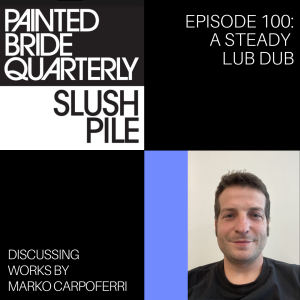
Tuesday Jun 07, 2022
Episode 100: A Steady Lub Dub
Tuesday Jun 07, 2022
Tuesday Jun 07, 2022
How do you pronounce “San Gorgonio,” Slushies? How do you say “Schuylkill?” We talk regional accents, local knowledge, and artistic craft-- from the risks of the pathetic fallacy to the unknowability of metaphor, the art of ambiguity, and, of course, the golden shovel. Join us for an episode devoted to poems by Marko Capoferri where we discuss poetic craft, resonant symbols, and the peculiar power of telephone poles.
What can’t you pronounce where you live?
Links to things we discuss that you may dig:
Eula Biss’s “Time and Distance Overcome”
Jennifer L. Knox’s “Irwin Allen Vs. The Lion Tamer”
At the table: Katheleen Volk Miller, Marion Wrenn, Jason Schneiderman, Samantha Neugebauer, Larissa Morgano & Kate Wagner
This episode is brought to you by one of our sponsors, Wilbur Records, who kindly introduced us to the artist is A.M.Mills whose song “Spaghetti with Loretta” now opens our show.
Marko Capoferri has lived and worked in eight US states, including Montana, where he currently resides. He is an incoming MFA candidate at the University of Montana in Missoula. He is desperately seeking fellow Italian-Americans in Montana for good pasta and raised voices.
Instagram: Instagram.com/markocapoferri
San Gorgonio
White paper coffee cups collect in drifts
by the freeway exit ramp—the hearts of ghosts
once held tight then tossed out the window
of a car speeding across the desert at four a.m.
trying to stay awake to see, when the light
came back, what the battered face of the land
could tell us about ourselves: how the mountains
were stark and risen; how we were sunk dumb
in between, a scathing plain of wind turbines
resonating unearthly as Amelia Earhart's flooded engines
chugging their final gasp on the ocean floor;
how the sea was here once and swallowed heights,
long since yawned and pulled away paving
this desert with a tired yellow dirt now blown
through our teeth, through our beating pistons,
and a few black rounded stones as souvenirs
from lost time; how thistle-studded towns
were hardly refuge; how the many stones
we had gathered were bright and jagged,
too young by design to tell any real story;
how lust and lost became an exchange in glances
through a motel’s cracked facade; how these roads
kept on dressing down like lightning on a postcard
running fingers in the hot mouth of experience.
Self-portrait with Elegy
Just like we were on the Great Plains
in 1949, my father and I would gather
summer nights with neighbors
lining our country road to watch
constellations disbanding. Whether tragedy
or a tragic lack of imagination, it’s hard
to say—he and I simply could not see
any threads or their severing. Then,
as now, telephone wires also lined the road
linking the night one lighted island
at a time, though the wires are now dead
gestures, props to a faded empire
of distant voices made close but never
close enough to turn that light
into warmth. What’s left—sinking
into my own humidity, my own
expanse of darkness, and he
to his own. As you read this
it is surely a summer night some place
the land extends forever
until it gives up where the visible
begins to visibly waver, either
from the heat or from the failure
of the possibilities of sight.

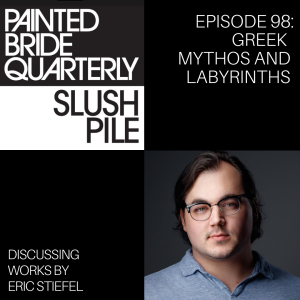
Friday May 20, 2022
Episode 99: Greek Mythos and Labyrinths
Friday May 20, 2022
Friday May 20, 2022
Hello Slushies. Do you see the string? Past the blooming peonies and fungus gnats? Follow us into the labyrinth of our minds as we discuss the work of Eric Stiefel. You may need to brush up on your Greek mythology and Italian literature as a guide. A discussion about various versions of ourselves turns into discussion of an app that animates photographs of faces and National Mason Jar Day (November 30th). And, maybe, the only way out of the labyrinth of the mind is to open your mouth only to forget what you were going to say.
If there was a national day to celebrate you, what would you want people to do that day?
This episode is brought to you by one of our sponsors, Wilbur Records, who kindly introduced us to the artist A.M.Mills, whose song “Spaghetti with Loretta” now opens our show.
Eric Stiefel is a poet and critic living in Athens, Ohio with his dog, Violet. He teaches at Ohio University, where he is also pursuing a PhD. His recent work has appeared or is forthcoming in Apple Valley Review, Prism Review, The Literary Review, Tupelo Quarterly, Frontier Poetry, and elsewhere.


A claw of thread’s all it takes to follow one thought to the next—
when West killed himself I didn’t say his name out loud for months,
though most days I still lean forward and pull my head back as if some spectral hand pulls my chin taut and points my gaze to the life
he abandoned inside this house of chaos we call everyday or otherwise inscrutable, my shoulders trembling like stained glass, the same way,
I imagine, Theseus trembled as his father threw himself to the rocks, not long after he left Ariadne sleeping on a beach made of coral and grit,
the mind displaced while the body stays behind, the breath clipped short and calcified, strung up in the overgrown garden Dante held back for suicides,
while, in some version of the myth, Ariadne became a god, goddess of serpents and twine and everything tangled, winged beasts hovering on the fringe
of knowing one way or the other, gloating on the worn-out roots of the trees we’ll be burdened to, until I’m sitting on the floor in front of a coffee table
pleading first with myself and then everything else, this skeleton of history and an infinity of arrangements of the stars for an answer of some kind—
at this point, I’d take anything that masquerades as understanding like a barrel to my chest, something to cradle off into the murk and the shadows of the night.
Phantasmagoric
Each time I kill one of my old selves—or more often let him loose into the static—I stumble on his shade sometime later, often when the seasons have changed and the lilacs have withered so that they, too, no longer resemble their former selves—
He was there, right there, standing in front of the meat market, with a ring of brass keys in his hand, just watching
as the pedestrians idled by—
and I start to ask if I would recognize myself if seen
from any real distance, or would it all just blur, terribly,
so that there could be no gesture, no omen or ominous figure lurking in the corner of one’s eye, and what
would I do then, what jar would I keep the days in, and how would I order them or else unravel further into a blizzard of ideas, and then what sense could I make of this before suddenly drifting away?
If It’s True of Human Nature
Actually, I hate the flowers—
now that the birds have vanished, as the last clouds drain away and a thin light winnows down where a grove of bees used to flourish—
and if you spoke to me of cruelty, I’d think about primrose in winter, lying dormant in the dirt, holding itself frozen, while the leaves left on the surface lose themself to rot—
I’ve been bestial and cunning, the way
ㅤㅤㅤㅤㅤㅤa troop of foxes conspires to survive the snow,
as winter moths lay havoc on landscapes of white trees—
and if you spoke softly, I might learn to trust you, even fold as a feathered wing, knowing that you might hurt me
ㅤㅤㅤㅤㅤㅤand that that hurt might be a kind of devotion
that we couldn’t explain, as the roof dulls the raindrops above us into something bearable,
ㅤㅤㅤㅤㅤㅤas if we could know
the limits of what we could bear—

Thursday Apr 28, 2022
Episode 98: The Skin is Where the Body Stops
Thursday Apr 28, 2022
Thursday Apr 28, 2022
Slushies, are you ready to take a deep dive into some fiction? Listen to “Benefitting Positions,” at the link below, or read it here. Would you ever hire a professional hugger, or would you want to be one? Listen in as the group discusses the concept of professional snuggling and what the drive is behind good fiction. In this time of social distancing, the topic of touch has become more pignant than ever, and very much so in Jac Smith's piece.
Maybe you’ll be a different kind of touched when you listen to how proud the group is of Jonathan. Maybe you’ll feel even another kind of touched when you hear about Jason’s academic journey, followed by Larissa's journey in the VCap Department, which has helped acclimate an ungodly 30,000 zoom users.
Send us your thoughts on the piece, and what you think of Jane’s anger, and we'll leave you Slushies with one last question. There isn’t a right or wrong, although we are side-eyeing you, do you read a book’s ending first? Or are you NORMAL and read the book from the beginning to end?
Listen to Benefitting Positions
This episode is brought to you by one of our sponsors, Wilbur Records, who kindly introduced us to the artist A.M.Mills, whose song “Spaghetti with Loretta” now opens our show.
Jac Smith is a MFA graduate from the University of Notre Dame and a recipient of the Studios of Key West Fellowship. She is currently seeking representation for her novel, The Loose, which explores grief as a form of addiction and is set in the Florida Keys. She lives in the mountains of Southern California with her wife. Her work can be found at Hypertrophic Literary and Santa Ana River Review.


Monday Feb 21, 2022
Episode 97: Navigating Dirtbags & Oracles
Monday Feb 21, 2022
Monday Feb 21, 2022
We’re thrilled to consider new poems and flash fiction by Dr. Emily Kingery on this episode. Subtle and specific and utterly compelling, these poems make us ponder and pause and praise. We’re global as ever, Slushies: from Lititz, PA, to the KGB Bar, Gabby is somewhere in Powelton, it’s last year’s Ramadan (Ramadan Kareem!), Samantha hasn’t gotten married yet, and Kingery’s got us thinking about the trouble we got into in high school basements. Time warps and shapes shift! Listen in & enjoy.
This episode is brought to you by one of our sponsors, Wilbur Records, who kindly introduced us to the artist A.M.Mills, whose song “Spaghetti with Loretta” now opens our show.
At the table: Addison, Alex, Gabby, Jason, Kate, Kathy, Larissa, Marion, & Samantha
Emily Kingery is an English professor at a small university in Iowa and the author of Invasives (Finishing Line Press, forthcoming), a semi-finalist in the New Women’s Voices Series. Her work appears widely in journals, including Birdcoat Quarterly, Blood Orange Review, GASHER, The Madison Review, Midwest Review, New Ohio Review, Plainsongs, Raleigh Review, and Sidereal, among others. She has been a chapbook finalist at Harbor Editions and Thirty West Publishing House, as well as the recipient of honors and awards in both poetry and prose at Eastern Iowa Review, Iron Horse Literary Review, Midway Journal, Quarter After Eight, and Small Orange Journal. She serves on the Board of Directors at the Midwest Writing Center, a non-profit supporting writers in the Quad Cities community (mwcqc.org), and you can follow her on facebook: https://www.facebook.com/ekingery/

Dirtbag Wilderness
Our dirtbags, our dirtbags
were medicine men.
They spoke as oracles,
capped bottles, skated
razorblades across
the glass of pictures.
It’s just like shoveling snow,
laughed our dirtbags
as they unburied
their parents’ faces.
Like raking leaves,
want to try?
We watched their hands
swap bills, our eyes
the wrong kind of wild.
Our dirtbags laughed:
You can sit with us
while we finish.
This was intimacy:
our sitting; their finishing.
We laughed; we returned
frames to their shelves.
We bought shadows dark
and lip stains darker. Darker,
said our dirtbags, damp
on basement couches.
We envied in secret
the laughs of bright girls,
high as their hair
pinned in hard, slick curls.
They spun like acrobats
in the high school gym,
strobing in glitz
we were disallowed.
Bitches, spat our dirtbags,
skanks, whichever
words coaxed our laughter.
We swallowed them
like expectorant
and laughed in wet coughs
under canopies
of parking lot trees,
our arms crossed as though
coffined already.
We rolled in our dirtbags’ scent
like hunting dogs,
napped in stuffy rooms
as their hands, their hands
blessed guns, made backpacks
heavy with Ziploc holy.
It’s all good, laughed our dirtbags.
Our hips, our ponytails
swayed easy as leaves.
By summer, our dirtbags
wore sly, deep pockets,
weighed powders,
held capsules to the light
under a jeweler’s loupe.
The car windows glided,
phones lit up like lightning
bugs on the shoulders
of gravel roads. Such soft light,
light of vigils, light the yellow
of a forgiven bruise.
We rode to neighboring towns
of missing teeth and needles.
We cried in bathrooms
far from home. We were home
when we laughed, when we laughed
we laughed Everclear vomit.
But our dirtbags, our dirtbags
let us sit while they finished,
and their hands were warm
as stones pressing us to sleep.
Funeral for a Cat
When the cat was killed by a driver in a tragic hit-and-run, the dirt bike kid watched it happen. He screamed to gather us to her carcass: Pumpkin! He pedaled hard around the block. Pumpkin is dead!
I was afraid to tell Dad, at first. He went outside, shoveled Pumpkin into a grocery bag and dug a hole under a lilac bush. It was too late in the season for flowers, but he said they would bloom next year: a small truth sounding like kindness.
The kids begged him for a real funeral to say goodbye. He smiled a little, but not at them, and had us circle the grave and hold each other’s sweaty hands while he prayed. It was a test.
The dirt bike kid and the girls with yards of upside-down toys wept for the cat, loose with their sadness. The streetlights flickered on, and I was afraid of Dad again. I tried not to picture Pumpkin with a halo and wings, but I failed. I begged God to forgive me for it, then tried not to picture God as a cat shaking its head at my blasphemy, then prayed not to cry as the cats kept coming. I missed the amen, but I held out. I passed.
After the funeral, Dad said I was so grown-up, not weeping over a cat that didn’t belong to anyone. Not to the neighborhood, not even to God.
He prayed over hamsters in the years to follow, maybe a second cat. He prayed, and I grew into a tragic, feral thing.

Monday Dec 13, 2021
Episode 96: Larissa‘s Philly Hoagie Mouth
Monday Dec 13, 2021
Monday Dec 13, 2021
Slushies, do you know your shades and types of blue? Do you know how to say blue in Russian? When we talk of St. Petersburg, are we talking about Russia? Or Florida? When we discuss Max Lasky’s poems we discuss what we call things and how we write things and what to call the things we write. (Discuss what ‘lyric’ means amongst yourselves.) “Come Here” takes the table to a scene in Maryland, once home to Jason and his long “O,” and is heavy in Hikmet. After reading “Prothalamion Poured from a Copper Cezve,” a love poem or a poem about love, we continue to praise Lasky’s juggling of images and figurative tight-rope walking.
This episode is brought to you by one of our sponsors, Wilbur Records, who kindly introduced us to the artist A.M.Mills, whose song “Spaghetti with Loretta” now opens our show.
At the table: Samantha Neugebauer, Alex J. Tunney, Kathleen Volk Miller, Jason Schneiderman, and Marion Wrenn
Max Lasky is a poet from New Jersey, currently living in Maryland with his fiancé where they are raising two plant children: a hardy mum named Thomas, and a basil plant named Bunting. Max is finishing up his final year in the MFA program at the University of Maryland and earned his B.A. from Ramapo College. His poems have been published by Trillium and Frontier Poetry, and he is the co-founder and editor of the literary magazine Leavings. He lives in and for the slush.

Come Here
We read Hikmet during what she called
a picnic, though we brought no wicker basket,
no plaid blanket, we rolled our jeans up
under our knees to wade across the river,
wide and knee high, the entire riverbed
bedded with sharp rocks covered in moss,
slick enough beneath our bare feet to make us
walk slow, half cautious, as a group of five men
flyfishing spoke Spanish, reeling in fish
too small to keep, taking swigs from warm
beer cans at the shore when they turned bored,
wanting us to leave. We stayed. As did the birds
pitching in a nearby thicket, almost inaudible
near the pop blaring from a portable speaker,
and a quiet drone flew high above the water.
Which is to say nature’s no more, at least
not there in Catonsville, Maryland, mid August,
where the Patapsco flowing toward the Chesapeake
could double as the sound of traffic passing
on a highway. All the plastic, all the tin cans
and wrappers littered across the rocks, the sand—
and yet hopeless is not something to be,
not for me or Hikmet or my love, who smirks
when I say a new Turkish word correctly.
My love, what are we to do? We lounged
on that ripped towel, smoking, when we should’ve
scoured the shoreline picking up trash. In masks
because of a pandemic, not one person
walking past on the trail looked us in the eye
or said hi, how are you? I lose a little hope…
I hope a little less and learn a new language,
or try. I learn how the river was commandeered
from Native American tribes by dead men, white men
who wanted to fuel their new plants and mills,
men who never imagined the future here,
hundreds of years later, or else just didn’t care,
not for us or the two women who walked
hand in hand, a leashed dog barking at their feet,
not the men who spoke Spanish and looked at me
confused when I asked what kind of fish is that?
I already knew it was a trout. I already knew
Hikmet was a communist who loved Marx and Lenin
and each of his three wives. Some of us strive
to better the world, some strive to better ourselves,
and the striving sometimes transcends joy.
Hikmet tried both not long ago when he wrote
“My strength is that I’m not alone in this big world.
The world and its people are no secret in my heart,
no mystery in my science. Calmly and openly,
I took my place in the great struggle.” I turned
to face a warm wind that laced my face with sand,
for the future’s everchanging, before it even happens…
Come here and change me, you whose tongue
on my tongue tastes of Turkish tobacco, and sun,
you who say the unsayable. Come here, aşkım,
lend me your hope, teach me how to grin again
after two decades of elegy and a broken language
rife with misogyny, and god. We took Nazım
to the water’s edge and read the translations
energetically, sweating, as the park closed
and the sun lowered, and for a few moments,
it seemed as if it was just us three and the river,
carving through the earth like the blood through
our veins, I learned a new word for landscape.
Prothalamion Poured from a Copper Cezve
Zuleyha read my fortune
in the dried coffee grinds
and tossed the saucer toward
the future, its arc across
left a chem trail renting
the sky, and I didn’t ask why,
I didn’t point it out or make
a scene about the vision
I’d been led to believe, as if
with a shovel in a lame novel,
as if my ears were a septic chute
that accepted every story,
no matter how far from true.
I didn’t mention my nomad past
or how my brain’s forced from place
to place in caravans, canal boats,
tents reeking of frankincense, pine,
or how that’s just another story
I’d been fed with a shovel.
I realized somewhat early on
in this early life that most people
are eager to live their lives
like stars beyond a projector,
a drive in, seemingly unaware
of the dark screen, and willing
to wrong anyone if it means
someone lifts the loose noose
from their own bowed necks—
they almost sprint down the steps.
I crawl up the steps to every
bad decision I’ve let happen,
happy to say I’ve changed,
took notes on each mistake
and if I ever turned back
I was sure to take a different path.
When I go home to the house
I grew up in, it’s not to stay.
As for the story, neither one of us
could say if it was imagined.
I wake some mornings to find
signs that don’t make sense,
suspicious of my own breath
and the sunlight through the slats,
because the world’s senseless
and nonsensical and tense.
A paranoiac and a high priestess
make for one hell of a couple,
our studio’s more like a circus,
we’re trapeze swingers swooping
from corner to corner, blowing
clown horns as we paint our faces
in a shattered mirror. Our strict
schedule requires us to weep
all day and dance at night,
saying I’m so fucking lucky
I met you. I’m so fucking lucky…
I rejoice, I digress, I paint two
red lines under each of our eyes
and step in line, waiting stone like.
I’m well aware it could be me
paranoid and schizophrenic
on the side of the street, paranoid
past repair, not knowing where
the self ends and society begins,
it could easily be me if not
for five or six good people.
As for the lover, I’m damn sure.
I put a poem around her finger
because I couldn’t afford a ring,
which means I’m always already
all in. I push the stack of chips
to the center of the table. I grin.

Monday Nov 22, 2021
Episode 95: Sweet! Poems by Hillary Adler
Monday Nov 22, 2021
Monday Nov 22, 2021
Slushies! We’re excited to release this episode featuring three poems by Hillary Adler: "Did You Google that or Shake a Magic 8 Ball?"; "We Must Be Animals"; and "Letter to Erika from a Bench on Christopher St." Recorded in the spring of 2020, our crew is well locked down but looking up, delighted to be reading poems together from afar. We’re down with “dirty words,” Slushies, and the ontology of the self, despite Marion’s broken thumb. It’s animality and the annoyingness of humans in “We Must Be Animals.” “Letter to Erika” brings the Big Gay Ice Cream back to us, and Jason talks about football while Marion tries to imitate Charles Bukowski, badly. Adler’s poems invite us into reverie, meditation, frank images, syntactical pleasures, and the challenge of sweetness.
This episode is brought to you by one of our sponsors, Wilbur Records, who kindly introduced us to the artist A.M.Mills, whose song “Spaghetti with Loretta” now opens our show.
At the Table: Jason Schneiderman, Kathleen Volk Miller, Addison Davis, & Samantha Neugebauer.
Hillary Adler is poet and journalist, and is currently the Director of Marketing for Topl, an impact technology company that enables digital and sustainable transformation across value chains and empowers the monetization of impact verified on the Topl Blockchain. She is from New York City, and holds an MFA from The New School. Her work has appeared in The Huffington Post, The Poetry Foundation, BuzzFeed, Rolling Stone and elsewhere. Her first completed book of poems, We Must Be Animals, has been in a drawer for over a year. Maybe one day it will see daylight. Until then, she can be found on Twitter and IG @HillaryAdler.


Friday Oct 22, 2021
Episode 94: Two Authors, One Episode
Friday Oct 22, 2021
Friday Oct 22, 2021
Featuring Sarah St. Vincent & Karolina Zapal
How many times can we reference the 90’s before you actually start believing that we can time travel? Are hairspray bangs enough (specifically Kirsten Dunst’s lack of them in On Becoming a God in Central Florida)? As the editorial table moves through space-time in our usual fashion, starting off in 1991, Sarah St. Vincent gives us a feeling of the WWE moments of intimacy which make, as Jason says with some Hulk Hogan gusto, YOUR BODY SING WITH PAIN! The spectacle of boxing and the compelling stillness of combat reminds Marion of Gabrielle Calvocoressi’s poetry book, “Apocalyptic Swing.” If you’re hearing the poem twice, that’s not ringing in your cauliflower ears! This episode, we take some cues from Pádraig Ó Tuama’s “Poetry Unbound” series by reading, discussing, and then reading again. Repetition, both in words and time loops, seems to be the theme here with Karolina Zapal sliding in more than a few ‘I love you’s into her poem. Calling all Grammar Slushies: What is the term for doubling up on words?
This episode is brought to you by one of our sponsors, Wilbur Records, who kindly introduced us to the artist is A.M.Mills whose song “Spaghetti with Loretta” now opens our show.
Sarah St. Vincent
Sarah St.Vincent is a human rights lawyer by day and poet by night (or very early morning). Her debut novel, Ways to Hide in Winter, was published in 2018, and she currently directs a clinic at Cornell University that provides computer security advice to domestic violence survivors. She's originally from that swingin'-est of swing states, Pennsylvania, and lives in Brooklyn.
Sarah’s Twitter handle is @Sarah_StVincent.

Karolina Zapal
Karolina Zapal is an itinerant poet, essayist, translator, and author of two books: Notes for Mid-Birth (Inside the Castle, 2019) and Polalka (Spuyten Duyvil, 2018). As an immigrant and activist writer, she writes frequently about her native Poland, languages, borders, and women’s rights. Her work has appeared in or is forthcoming from The Rumpus, Inverted Syntax, Tupelo Quarterly, The Seventh Wave, Mantis, Posit, and others. She has completed three artist residencies: Greywood Arts in Killeagh, Ireland; Brashnar Creative Project in Skopje, Macedonia; and Bridge Guard in Štúrovo, Slovakia. She works at the South Carolina Governor's School for the Arts & Humanities.
Website: karolinazapal.com
Facebook: karolina.zapal
Instagram: Karoissunshine
Twitter: KarolinaZapal

At the Table: Jason Schneiderman, Kathleen Volk Miller, Samantha Neugebauer, Marion Wrenn, & Alex Tunney

Tuesday Sep 28, 2021
Episode 93: Go Away & Come Home
Tuesday Sep 28, 2021
Tuesday Sep 28, 2021
In anticipation of the Collingswood Book Festival, we thought it might be nice to have some of our senior editors and a couple of festival participants sit down for a proper chat about poetry and community, the anonymity of sending work out into the void and the anonymity of masks, and of course, bears and bathrobes.
Enjoy and let us know what you think! Has the pandemic made writing more universal or melted our minds so terribly that our relationship to literature has changed? Will readings stay virtual and/or can we find a happy relationship between Zoom and IRL?
This episode includes these special guests:
Cynthia Dewi Oka is the author of Fire Is Not a Country (2021) and Salvage (2017) from Northwestern University Press, and Nomad of Salt and Hard Water (2016) from Thread Makes Blanket Press. A recipient of the Tupelo Quarterly Poetry Prize and the Leeway Transformation Award, her writing has appeared in The Atlantic, POETRY, Academy of American Poets, The Rumpus, PANK, Guernica, ESPNW, and elsewhere. In collaboration with Philadelphia Contemporary, Friends of the Rail Park, and Asian Arts Initiative, her experimental poem, Future Revisions, was exhibited at the Rail Park billboard in Philadelphia from July to August 2021. She has taught creative writing at Bryn Mawr College and is a 2021-2022 Poet in Residence at the Amy Clampitt House in Lenox, MA. She is originally from Bali, Indonesia.
Rogan Kelly is the author of Demolition in the Tropics (Seven Kitchens Press, 2019). His work has appeared, or is forthcoming, in New Orleans Review, The Penn Review, Plume, RHINO, and elsewhere. He is the editor of The Night Heron Barks and Ran Off With the Star Bassoon.
We thought we’d include our bio’s here, since we never do:
Jason Schneiderman is the author of four books of poems, most recently Hold Me Tight (Red Hen 2020) and Primary Source (Red Hen 2016). He edited the anthology Queer: A Reader for Writers (Oxford UP 2016). His poems and essays have appeared in numerous journals and anthologies, including American Poetry Review, Best American Poetry, VQR, The Believer, and The Penguin Book of the Sonnet; he is a co-host of the podcast Painted Bride Quarterly Slush Pile. His awards include the Shestack Award and a Fulbright Fellowship. He is an Associate Professor of English at the Borough of Manhattan Community College and teaches in the MFA Program for Writers at Warren Wilson College.
Kathleen Volk Miller has written for LitHub, NYT Modern Love, O, the Oprah magazine, Salon, the NYTimes, Huffington Post, Washington Post, Family Circle, Philadelphia Magazine and other venues. “How We Want to Live,” an essay, was chosen as the penultimate piece in Oprah’s Book of Starting Over (Flat Iron Books, Hearst Publications, 2016). She is co-editor of the anthology, Humor: A Reader for Writers (Oxford University Press, 2014). She is co-editor of The Painted Bride Quarterly and co-host of PBQ’s podcast, Slush Pile. She has also published in literary magazines, such as Drunken Boat, Opium, and other venues. She holds “Healing through Writing” and “Writing and Neuroplasticity” workshops, and other memoir classes. She consults on literary magazine start up, working with college students, and getting published in literary magazines. She is a professor at Drexel University.
Marion Wrenn is Director of the Writing Program; Senior Lecturer of Writing and Literature and Creative Writing at NYU Abu Dhabi. Marion C. Wrenn is a media critic, cultural historian, and literary editor who writes essays and creative non-fiction. She earned her PhD from NYU’s Department of Media, Culture, and Communication and has received grants and awards from NYU, the AAUW, and the Rockefeller Archive Center. Recent work on satirical news and citizen audiences have appeared in Poetics. Her essays have appeared in American Poetry Review, South Loop Review, and elsewhere. She co-edits the literary journal Painted Bride Quarterly (pbqmag.org) and has taught writing at NYU, Parsons, and the Princeton Writing Program.
This episode is brought to you by one of our sponsors, Wilbur Records, who kindly introduced us to the artist A.M.Mills, whose song “Spaghetti with Loretta” now opens our show.



